Topics

Helping Workers with Disabilities Get Ahead Through Good Jobs: A Toolkit of Practical Strategies
Office of Disability Employment Policy
People with disabilities are experiencing record employment rates. In 2023, the employment rate for working-age people with disabilities was the highest on record at 37.2%. This U.S. Department of Labor (DOL) toolkit provides strategies and best practices to recruit, hire, retain, and advance workers with disabilities. The toolkit provides a menu of strategies and practical advice, and shares examples and resources from government agencies and other entities.
The toolkit is organized into the following sections:
- Defining disability
- Planning to include disabled workers
- Recruiting and Hiring Disabled Workers
- Retaining and Supporting Disabled Workers
- Advancing Disabled Workers
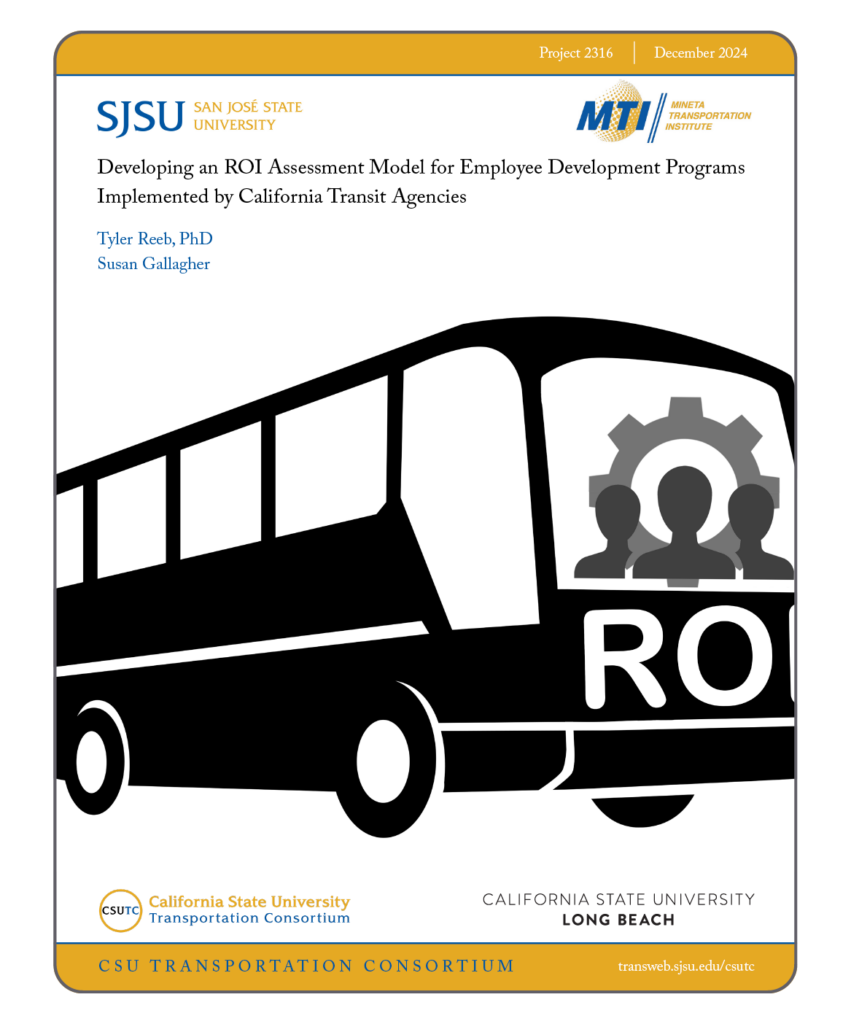
Developing an ROI Assessment Model for Employee Development Programs Implemented by California Transit Agencies
Mineta Transportation Institute (MTI)
December 2024
Transit agencies will necessarily incur expenses in efforts to improve the recruitment, retention, and morale of employees, but will struggle to solicit adequate funding unless they are able to demonstrate the value of such efforts to a broader audience. Thus, developing and implementing ROI assessments is critical. The literature review, survey, and follow-up interviews conducted by the MTI research team found that program outcome measures and programmatic expense data required for ROI is similar across employee development programs but is not currently being uniformly collected across agencies. The research findings demonstrate the need for technical assistance to combat data collection challenges such as staff capacity and know-how.
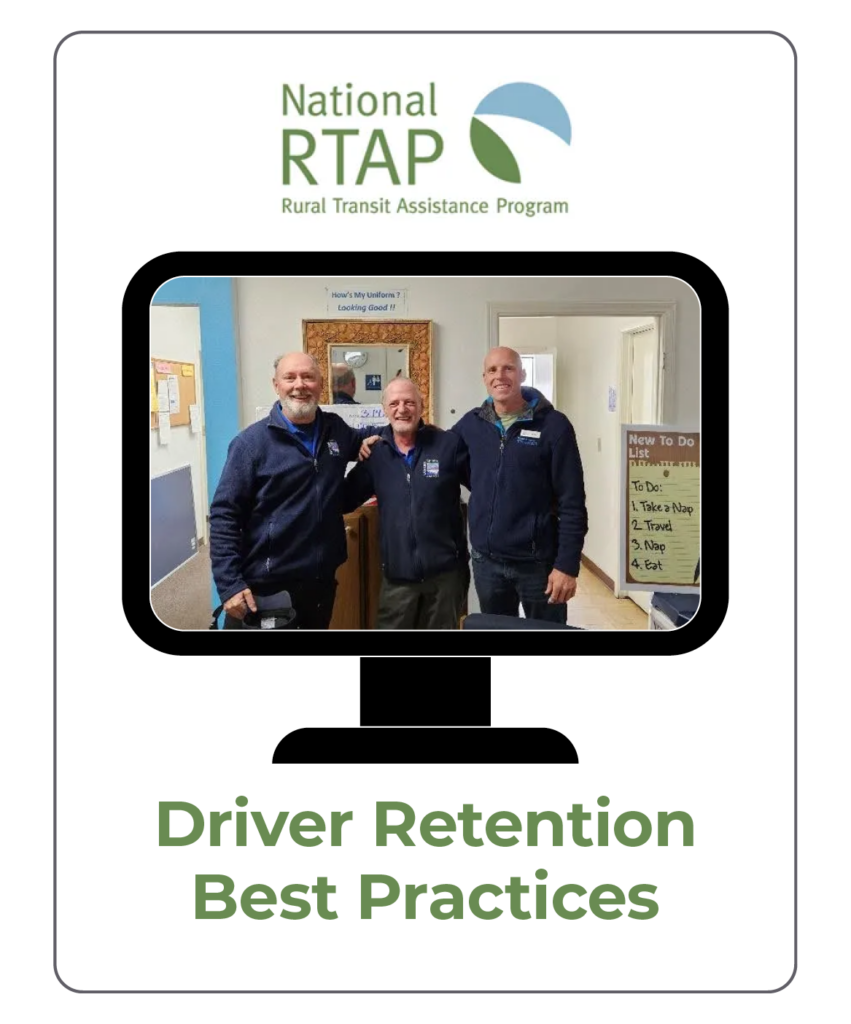
Driver Retention Best Practices
National RTAP
December 2024
TOPICS: Hiring and Recruitment , Retention , Workforce Shortage
It is increasingly difficult to recruit and retain rural and tribal transit drivers. This National RTAP Best Practices Spotlight Article provides practical and easy-to-implement strategies from transit leaders that agencies can use to create a workplace that drivers will want to remain in and thrive in. This article includes advice from Eastern Sierra Transit Authority (ESTA), Redding Area Bus Authority (RABA), Heart of Iowa Regional Transit Agency (HIRTA), and Big Woods Transit (BWT).
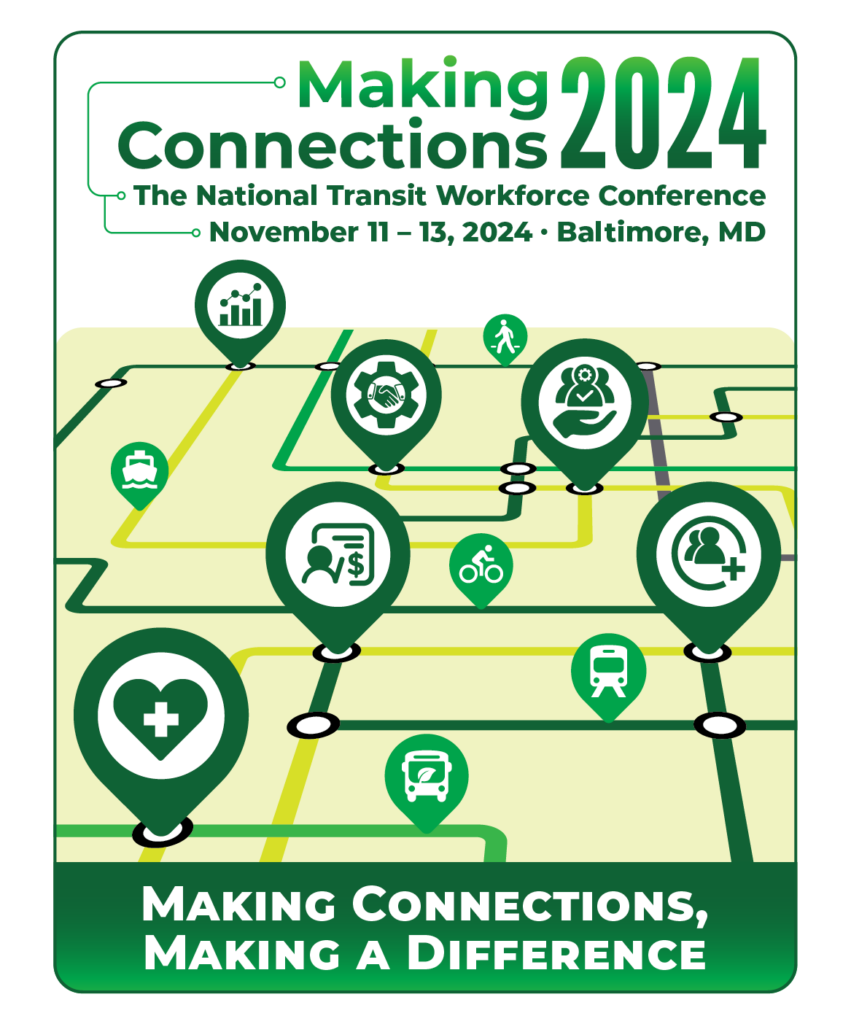
Making Connections 2024 – The College Connection: Strategies for Effective Partnerships
This session about partnerships between transit and local colleges was presented as part of TWC’s Making Connections 2024 transit workforce conference in November, 2024.
Transit Workforce Center
November 2024
Session Description: Strong partnerships between transit and local colleges across the country currently support recruitment, retention, apprenticeships and other career advancement initiatives developed by agencies and their workforce partners. Presenters in this session reviewed and discussed several different models of industry-education partnerships, focusing on how to establish productive working relationships with local colleges to advance workforce development goals.
Moderator:
- Patricia Greenfield: Senior Director, Workforce Education – International Transportation Learning Center / Transit Workforce Center
Speakers:
- Jamaine “G” Gibson: Director of Apprenticeships and Workforce Development – Amalgamated Transit Union
- Jason Abbott: Executive Director, Workforce Operations – Cuyahoga Community College
- Celeste Chavis: Interim Chair and Professor, Transportation & Urban Infrastructure Studies – Morgan State University (Baltimore)
- Rich Diaz: Workforce Development Coordinator – Amalgamated Transit Union Local 1575
- Rob Gamble: Sr Workforce and Academic Strategist – California Transit Works!

Making Connections 2024 – Tracking Your Impact: How Agencies and Unions Analyze and Use Workforce Data
This session about measuring metrics for workforce development initiatives was presented as part of TWC’s Making Connections 2024 transit workforce conference in November, 2024.
Transit Workforce Center
November 2024
Session Description: Employment in public transportation is affected by broad economic and demographic dynamics, but honing in on transit workforce trends can be challenging. The Transit Workforce Center created the Transit Workforce Data Dashboard to distill relevant data points from national datasets. In this session, TWC highlighted specific employment patterns and challenges in transit-related occupations and panelists covered research and trends in national and agency-level datasets.
Moderator:
- Michaela Boneva: Research Associate – International Transportation Learning Center / Transit Workforce Center
Speakers:
- Nick Biggar: District Director – Greater Cleveland RTA
- Valerie Campo: Mentor Program Coordinator – Champaign-Urbana Mass Transit
- Douglas Nevins: Senior Researcher – International Transportation Learning Center / Transit Workforce Center
- Darnell Morris: Vice President – ATU Local 268, Greater Cleveland RTA
- Dr. Shanta Hejmadi: Senior Data Scientist– Metro Transit (MN)

Making Connections 2024 – Apprenticeship 101 – How Transit Apprenticeship Operates
This session about transit apprenticeships was presented as part of TWC’s Making Connections 2024 transit workforce conference in November, 2024.
Transit Workforce Center
November 2024
Session Description: Apprenticeship programs are rapidly expanding at transit locations across the country. With quality training tied to clearly-identified career ladders and advancement, these programs are commonly regarded as the “gold standard” of workforce development. Documented benefits include increased retention, reductions in absenteeism, and the creation of a sustainable talent pipeline. These programs also result in better employee morale and a more engaged workforce. In this session, presenters walked through the essential steps to developing, registering, and implementing an apprenticeship program. Attendees heard from and engaged with transit labor and management about their joint programs including bus maintenance, traction power, HVAC/facilities, and signals/communications—and explore how to locate and access resources to support new and existing programs.
Moderator:
- Brian J. Turner: Founding Director – International Transportation Learning Center
Speakers:
- Michelle Allison: General Manager – King County Metro (WA)
- Maurice Beard: Senior Workforce Development Advisor –
- Norman Blessant: Financial Secretary/Treasurer – Amalgamated Transit Union Local 381 (UT)
- Rod Dunn: President – Amalgamated Transit Union Local 382 (UT)
- Brandee Gross: Program Manager, Workforce Development – Maryland Department of Transportation
- Dimas Koral-Arocho: Program Manager – King County Metro (WA)
- Stephanie Lewis: Workforce Development Project Manager – Center for Urban Transportation Research
- Kylee Parker: Shop Steward/Joint Apprenticeship Committee Chairman – Amalgamated Transit Union Local 1300 (MD)
- Jeff Stambaugh: Vice President – Amalgamated Transit Union Local 587 (WA)
- Greg Woodfill: President – Amalgamated Transit Union Local 587 (WA)

Making Connections 2024 – Mentoring – Innovative Models and Best Practices
This session about innovative mentoring models was presented as part of TWC’s Making Connections 2024 transit workforce conference in November, 2024.
Transit Workforce Center
November 2024
Session Description: An Increasing number of transit agencies across the country have begun mentorship programs to support the frontline workforce and facilitate the sharing of knowledge and skills from experienced workers to new employees. These programs offer many benefits, including improved rates of retention and absenteeism, stronger relationships between the workforce and management, and better employee morale. During this session, attendees learned how transit agencies are incorporating innovative models to tap into the full potential of mentorship programs. Panelists described the positive changes that have resulted from mentorship programs and how they are incorporating new and innovative applications and approaches to multiply these benefits.
Moderator:
- George Fields: Deputy General Manager, Human Resources – Greater Cleveland Regional Transit Authority
Speakers:
- Ida Marshall: Senior Talent Acquisition Manager – Greater Cleveland Regional Transit Authority
- Wendy V. Talley: Director, Training & Employee Development – Greater Cleveland Regional Transit Authority
- Reginald Howard: President – Amalgamated Transit Union Local 788 (St. Louis)
- Trenise Winters: Assistant Executive Director – Bi-State Development/Metro Transit (St. Louis)
- Maurice Beard: Sr. Workforce Development Advisor – International Transportation Learning Center / Transit Workforce Center
- Karitsa Holdzkom: Senior Policy Analyst – International Transportation Learning Center / Transit Workforce Center

Making Connections 2024 – Making Mentoring Matter: Building and Strengthening Your Frontline Worker Mentorship Program
This full-day intensive session about mentorship was presented as part of TWC’s Making Connections 2024 transit workforce conference in November, 2024.
Transit Workforce Center
November 2024
Session Description: Are you looking to establish a program that increases retention, provides an edge in recruitment, and advances a positive and collaborative organizational culture? Well-organized mentorship programs with carefully-selected and trained mentors provide documented benefits for frontline workers and the organization as a whole. Check out this intensive full-day workshop to explore how to:
- Initiative, develop, manage, and maintain a strong mentorship program
- Establish a collaborative structure and culture that runs and maintains that program
- Select and train effective mentors
- Explore occupation-specific approaches, challenges, and systems
- Track metrics that measure progress and success
Throughout this full-day intensive, attendees engaged with experienced instructors, facilitators, and peers to:
- Review the foundational elements of transit-based mentorship programs
- Experience TWC’s mentor training program, including: a review of mentor roles; an introduction to varied learning styles; an exploration of diversity, equity, access, and inclusion in mentoring; and an examination of communications and problem-solving skills
Moderators:
- Maurice Beard: Senior Workforce Development Advisor – International Transportation Learning Center / Transit Workforce Center
- Karitsa Holdzkom: Senior Policy Analyst – International Transportation Learning Center / Transit Workforce Center
Speakers:
- Stu Bass: Principal – Progress Worx; Founding Director – Keystone Development Partnership
- Nick Biggar: District Director – Greater Cleveland RTA
- Valerie Campo: Mentor Program Coordinator – Champaign-Urbana Mass Transit
- Lee Estis: Mentor Program Coordinator – Metropolitan Council-Metro Transit (MN)
- Jamaine “G” Gibson: Director of Apprenticeships and Workforce Development – Amalgamated Transit Union
- Steve Jovel: Operations Manager, Workforce Development – Santa Clara Valley Transportation Authority
- Vanessa L’Esperance: Apprenticeship Program Coordinator – Metro Transit/ATU Local 1005 (MN)
- Dionna McCane: ATU Mentorship and Apprenticeship Coordinator – IndyGo
- Darnell Morris: Vice President – ATU Local 268, Greater Cleveland RTA
- Harpreet Singh: JWI Co-Director – Santa Clara Valley Transportation Authority

Making Connections 2024 – Train-the-Trainer Bootcamp: Strategies for Successful Instruction
This full-day intensive session about tools for new and experienced trainers to increase retention and engagement was presented as part of TWC’s Making Connections 2024 transit workforce conference in November, 2024.
Transit Workforce Center
November 2024
Session Description: This intensive full-day session, an abbreviated version of TWC’s popular 5-day Train-the-Trainer Level 1 course, provided both new and experienced trainers with new tools to increase engagement, application, and retention. Participants added to their knowledge, skills, and confidence to fully engage learners and effectively facilitate a variety of instructor-led training programs. Topics included adult learning theory, teaching techniques, and instructional elements that really work! Participants also had the opportunity to observe and critique a teaching demonstration — learning what does and what does not contribute to impactful learning.
Check out experienced instructors and your trainer-peers from across the industry to explore the following topics:
- How do adults learn, and what does adult learning theory tell us that we can use in our training?
- What are the key instructional elements of successful classroom and hands-on training?
- What are lesson plans, and how are they developed?
- Which teaching techniques help strengthen classes and instructional presentations?
Speakers:
- Frank Burnett: Training Specialist – International Transportation Learning Center / Transit Workforce Center
- Julie Deibel-Pundt: Program Director, Instructional Design – International Transportation Learning Center / Transit Workforce Center
- Marina Budeyeva: Instructional Designer – International Transportation Learning Center / Transit Workforce Center
- Jessica Supervielle: Instructional Designer – International Transportation Learning Center / Transit Workforce Center
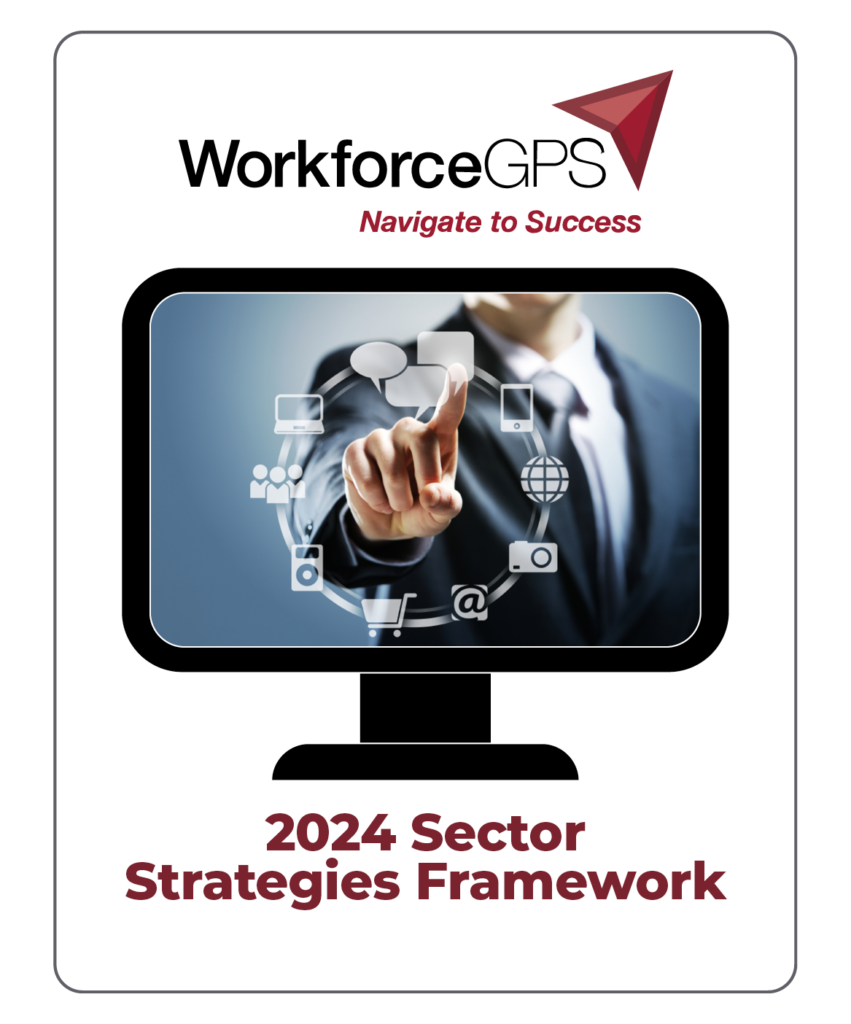
2024 Sector Strategies Framework
WorkforceGPS
September 2024
In September 2024, ETA released an updated Sector Strategies Framework to guide national, state, and local practitioners in their efforts to launch and implement effective sector strategies. The Framework is intended to advance knowledge and support the development, scaling, and sustainability of sector strategies. It provides workforce system practitioners with a clear picture of the concepts and elements essential to the successful implementation of sector partnerships and sector strategies. The Sector Strategies Framework was developed by ETA to harness lessons learned from the field, provide support to overcome common barriers, and help practitioners build knowledge in new areas.
Along with the Framework, the ETA released additional resources including:
- Implementation Guide and Self-Assessment and Action Planning Tool: Resources to help practitioners implement the Framework and assess and strengthen existing sector strategies efforts.
- ETA Blog Post: “Demand-driven training: Reimagining sector partnerships to build career pathways”
- Training and Employment Notice No. 08-24: Release and Availability of Updated 2024 U.S. Department of Labor’s Sector Strategies Framework
- Virtual Training Series: Learn more about the Framework and strategies to implement and scale sector strategies by viewing each session in this three-part series.
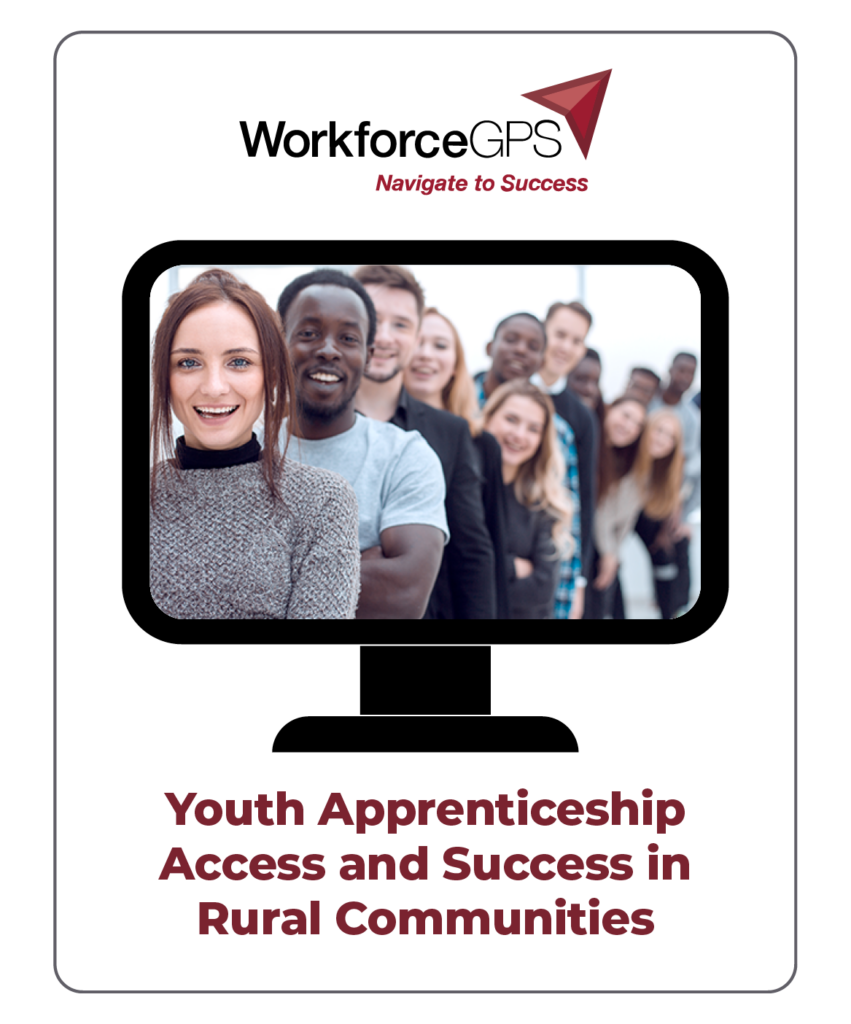
Youth Apprenticeship Access and Success in Rural Communities
WorkforceGPS
August 2024
In rural communities, widely dispersed populations face a multitude of access challenges. Faced with a declining talent pool, lower educational attainment, and rising poverty rates caused by the Covid-19 pandemic, there is an urgent need to prepare young people in rural areas for high-demand careers.
As part of the Implementing Workforce Programs for Rural Youth series, this webinar, hosted by the Office of Apprenticeship, focused on best practices and creative solutions for increasing pre-apprenticeship and youth apprenticeship access, enrollment, retention, and program completion for young people in rural areas. Featured youth apprenticeship intermediaries and partners shared their accomplishments in developing youth apprenticeship opportunities in rural areas, establishing networks of support, and best utilizing available resources to ensure pre-and youth apprenticeship success.
MODERATOR(S)
- Maisha Meminger, Manpower Analyst , Division of Youth Services, U.S. Department of Labor, Employment and Training Administration
PRESENTER(S)
- Vanessa Bennett, Associate Director, Center for Apprenticeship & Work-Based Learning, Jobs for the Future
- Zach Boren Senior Policy Program Manager, Urban Institute
- Bhavani Arabandi, Senior Research Associate, Urban Institute
- Jacqueline Rayfield, Policy Analyst, Urban Institute
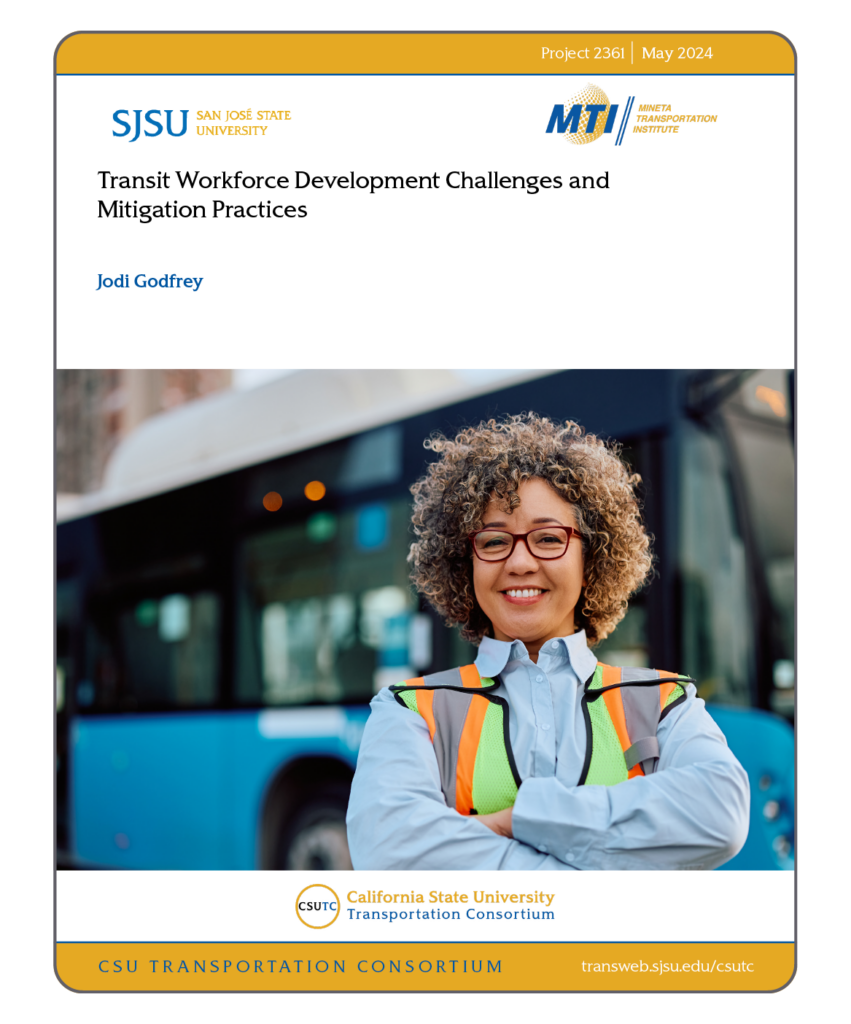
Transit Workforce Development Challenges and Mitigation Practices
San Jose State University
August 2024
TOPICS: Hiring and Recruitment , Retention , Workforce Shortage
The goal of this research is to provide transit industry executives and transportation professionals with awareness of the many tools that are available to help attract more qualified candidates to the transit industry, as well as ways to advance the development
of the transit workforce. This research highlights social media recruiting; online hiring platform improvements; and partnerships with career centers, universities, and recruitment centers to attract new employees to the transit workforce. In addition, increases in pay, benefits, bonuses, providing flexible schedule options, and some other atypical ideas have successfully been used to retain workers in the transit workforce. This research focuses on ways in which all transit stakeholders can invest in all aspects of industry workforce development to ensure qualified employees choose the transit industry and that they are subsequently trained to be the most beneficial assets to the organization and remain there via effective retention strategies.
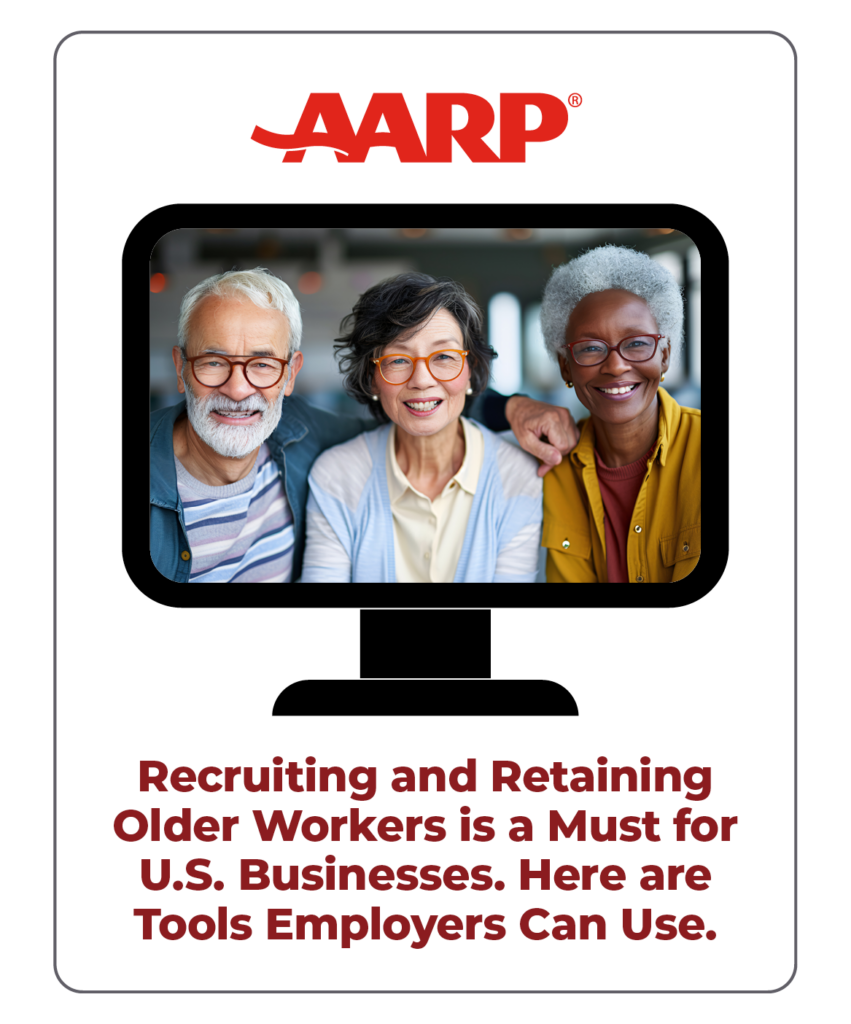
Recruiting and Retaining Older Workers is a Must for U.S. Businesses. Here are Tools Employers Can Use.
AARP
July 2024
Shifting demographics in the U.S. workforce indicate that businesses are probably going to need to recruit, train, and retain older workers to ensure their companies remain competitive. However, workplace surveys indicate that most firms are currently not prepared to find and welcome workers who are 50 years of age or older.
Fortunately, a broad array of evidence-based hiring and talent development strategies are at the ready for U.S. employers. These strategies draw from a recent and comprehensive review of employer practices and their influence on economic security and mobility for U.S. workers who experience structural disadvantages and exclusion from opportunity in the labor market.
Three key connected takeaways for employers to consider as they plan for ways to leverage this segment of the workforce are as follows:
• Engage directly with older employees in developing their digital skills.
• Seek out the social networks in which older workers operate to find the best recruiting matches.
• Lean into current or former employees and their online connections to identify these social networks.

Quick Guide: Resources for Creating Inclusive Apprenticeships & Work-Based Learning Environments
Office of Disability Employment Policy
July 2024
This Quick Guide developed by the Office of Disability Employment Policy (ODEP) at the U.S. Department of Labor promotes inclusive apprenticeship program models and other work-based learning models that meet employer needs by attracting a diverse array of candidates, including people with disabilities. The guide is paired with other helpful resources and strategies that transit agencies can begin to implement today.
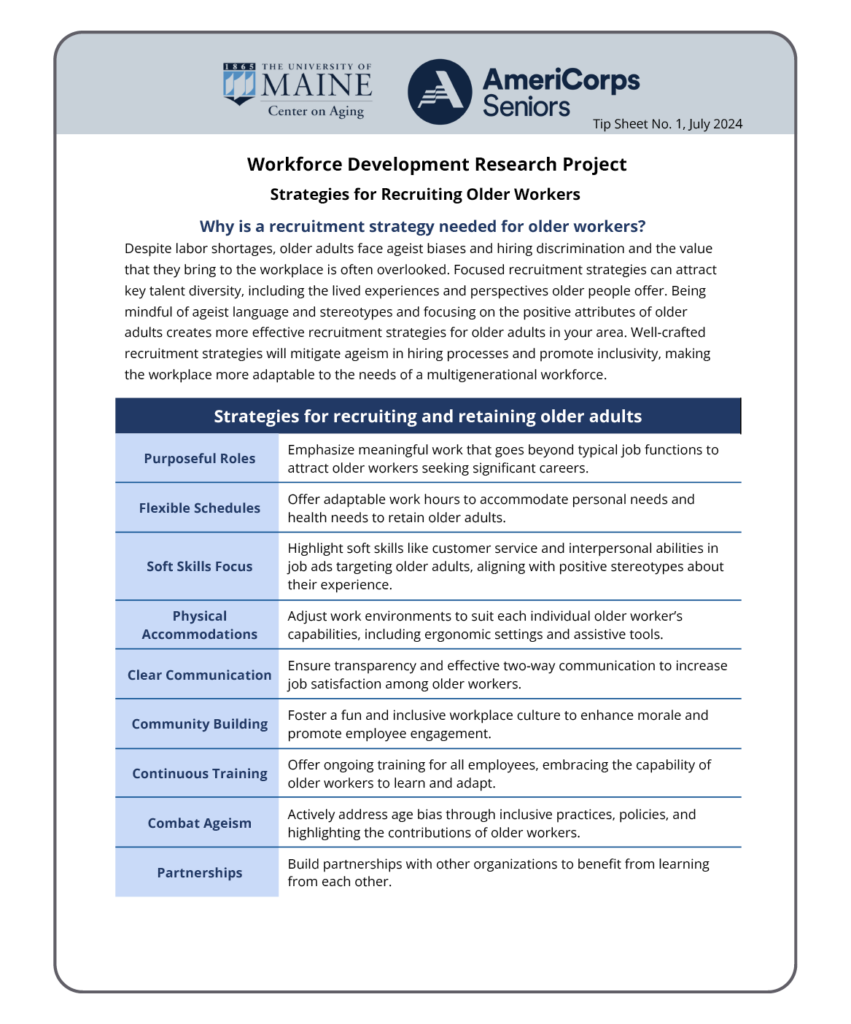
5 Tip Sheets for Working with Older Adults
UMaine Center on Aging & AmeriCorps Seniors
July 2024
Given current workforce shortages, reaching out and engaging older workers is of interest to many employers. The AmeriCorps Seniors research team developed five older adult workforce program tip sheets on topics relevant to interacting with older adults in the workforce. You can view the tip sheets on the project website, which are linked here:
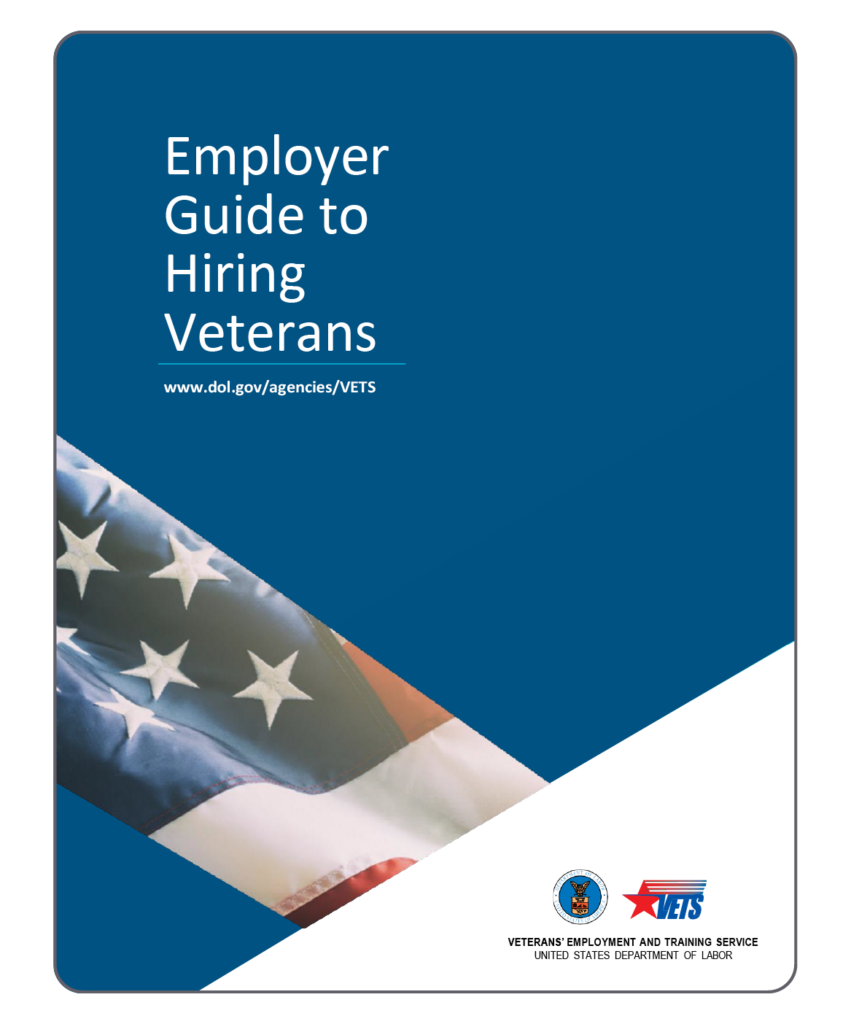
Employer Guide to Hiring Veterans
Employers recognize the value veterans bring to the workplace but often find it challenging to connect with separating service members and veterans seeking employment. Veterans are in high demand, so it requires dedicated efforts by employers to find and hire veterans.
This guide intends to:
• Provide accurate information about service member and veteran demographics.
• Share federal, state, and other resources with employers to facilitate veteran employment; and
• Make recommendations on how to attract, train, and retain veterans.
United States Department of Labor
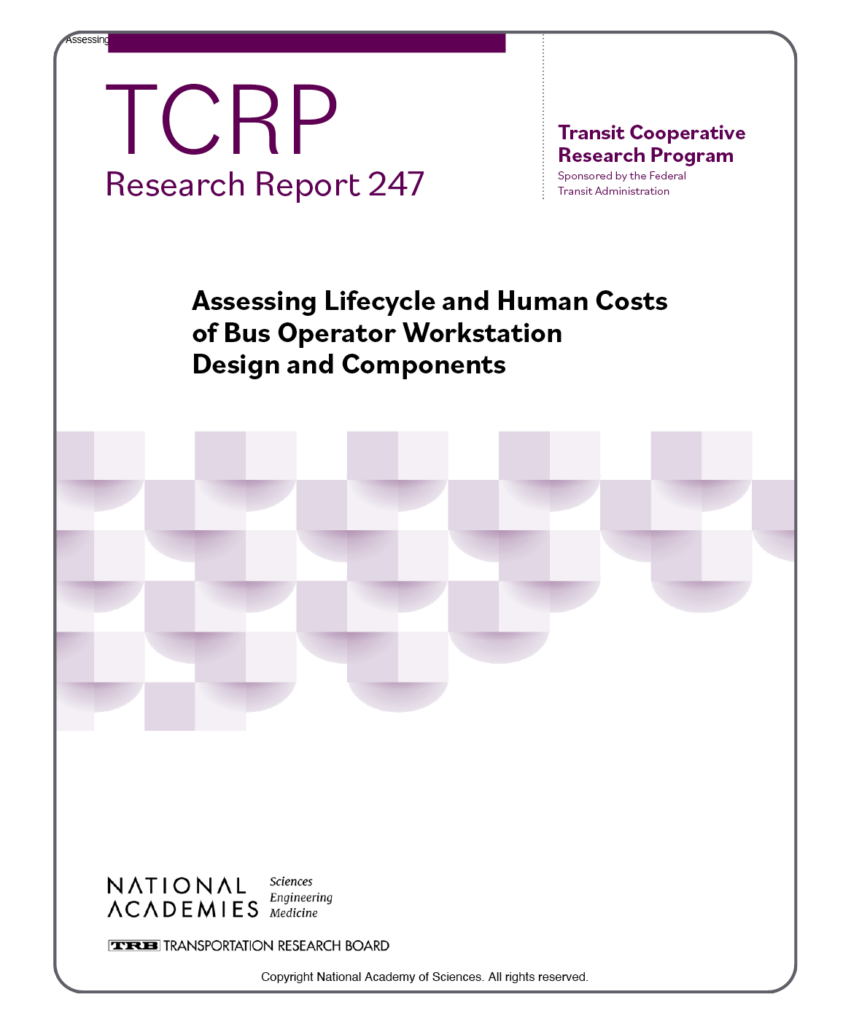
Assessing Lifestyle and Human Costs of Bus Operator Workstation Design and Components
Transit Cooperative Research Board
TOPICS: Policy and Planning , Retention , Safety and Health
Driving trucks and buses is a physically demanding occupation that carries one of the highest injury rates of major occupational categories in the United States. Drivers often work in postures that increase risk of low back pain and other musculoskeletal disorders, slow their response time, and put them at increased risk for acute injuries due to crashes.
TCRP Research Report 247: Assessing Lifecycle and Human Costs of Bus Operator Workstation Design and Components, from TRB’s Transit Cooperative Research Program, creates an easy-to-use toolkit for predicting the long-term safety of and promoting a healthy environment in bus operator workstations.
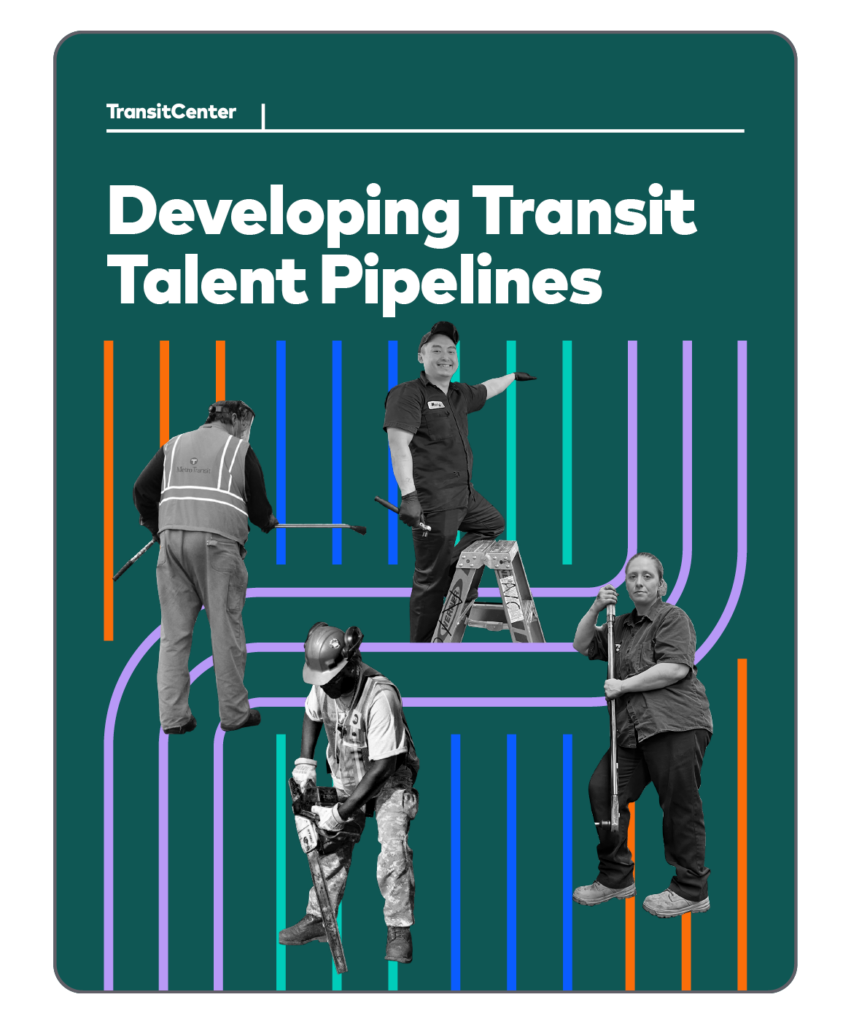
Developing Transit Talent Pipelines
TransitCenter’s report explores the workforce challenges of transit bus mechanics and maintenance workers, which are essential for transitioning to zero-emissions buses and restoring pre-pandemic service. Agencies are struggling to maintain a steady pipeline for these positions due to retirements, attrition, and a changing labor market. The report determines that agencies should engage more actively with potential workers and encourage them to join the transit workforce, as well as finding new ways to prepare new workers and retrain current workers to meet current and future needs, particularly as technology for zero-emission buses continues to change and grow more widespread. The report recommends greater investment from transit agencies, state and federal government, and philanthropy to support transit jobs.
TransitCenter
May 2024
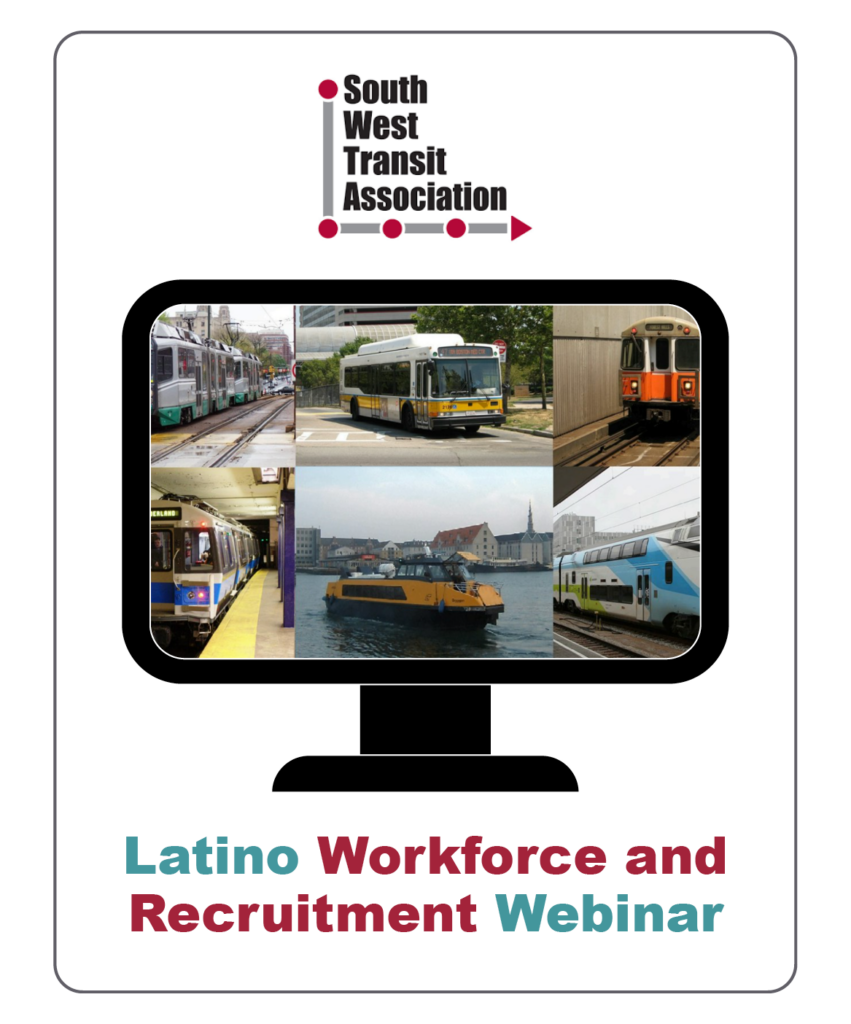
Latino Workforce and Recruitment Webinar
In this webinar, panelists explore crucial strategies for not only attracting but also retaining Latino demographics within your organization. The session delves into the latest industry trends, innovative development approaches, recruitment incentives, and cultural insights for engaging with all demographics effectively. Hear directly from the experts at Latinos In Transit as they discuss the opportunities available for employers seeking to tap into this rapidly growing demographic.
South West Transit Association
May 2024
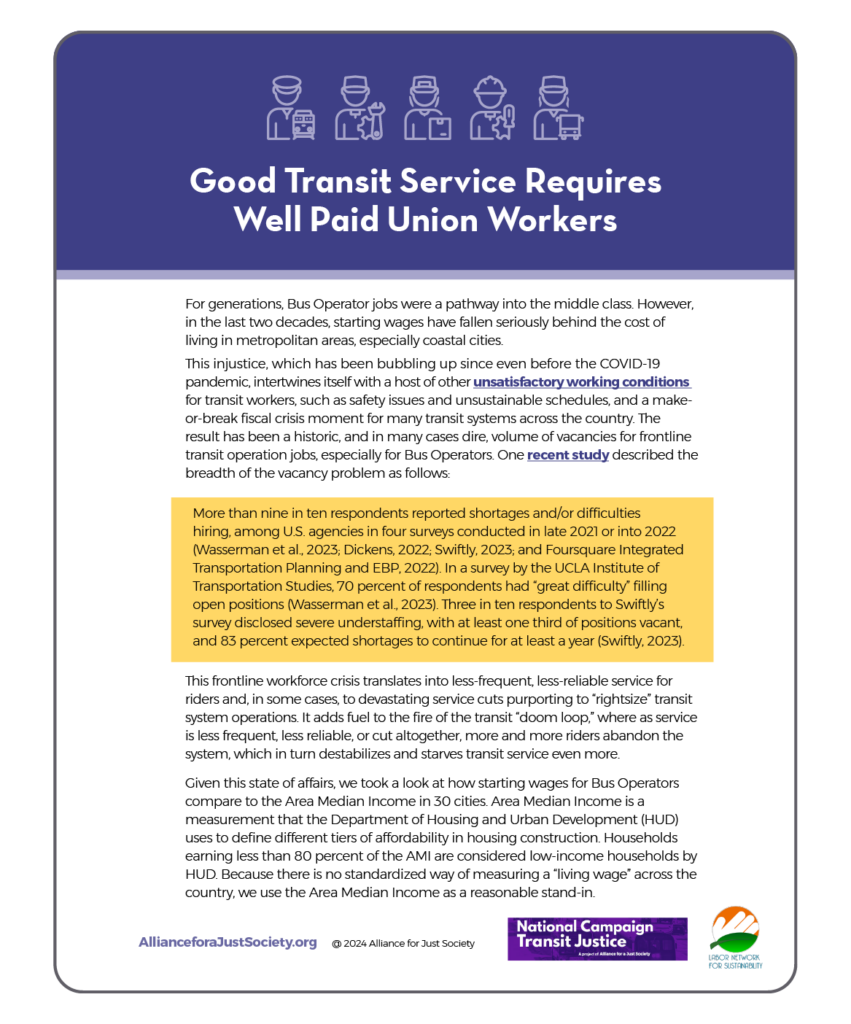
Good Transit Requires Well Paid Union Workers
This report presents bus operator wages as compared with Area Median Income in 30 cities across the U.S., pointing out that in the last two decades, starting wages for our nation’s bus operators have fallen seriously behind the cost of living. In the face of a workforce shortage, the report makes the case for decision makers to ensure higher wages for frontline transit workers.
The National Campaign for Transit Justice
March 2024
TOPICS: Hiring and Recruitment , Policy and Planning , Retention , Workforce Shortage
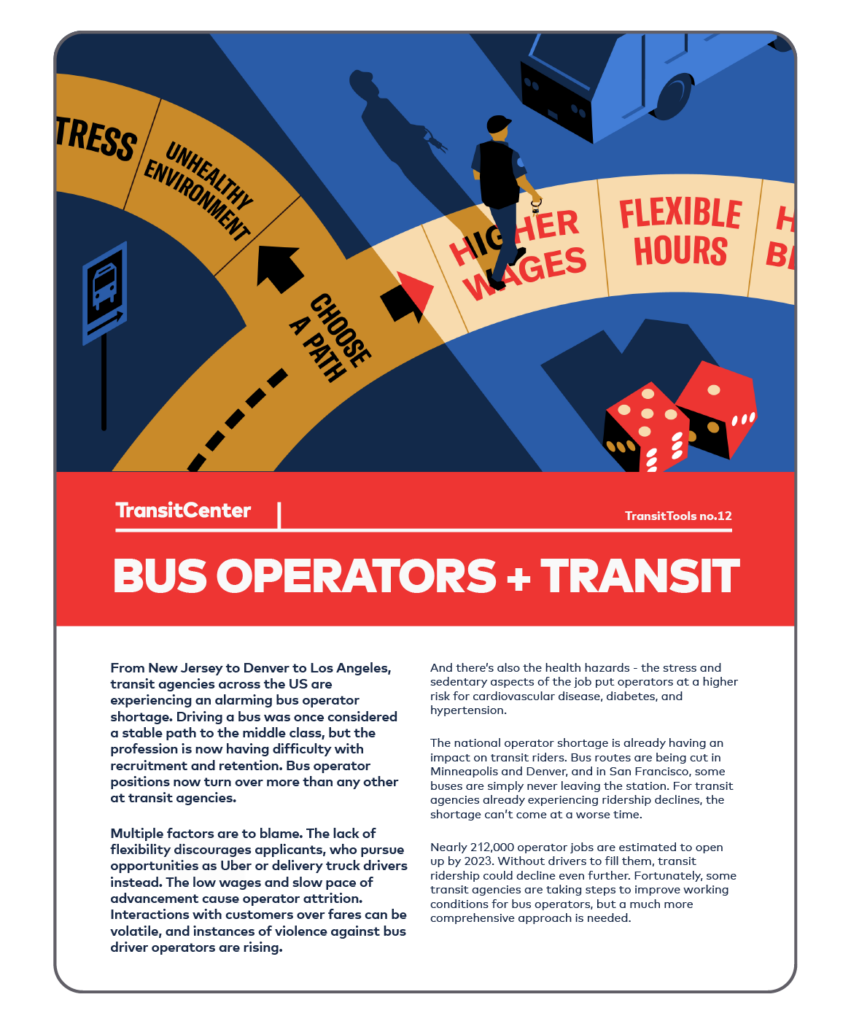
3 Ways to Make Bus Driving a Better Job
This report highlights ways that bus driving can be improved for workers to help increase retention and recruitment. The report explains three specific ways: redesigning the job for health and success, raising pay and creating opportunities for advancement, and making a more flexible schedule.
The National Campaign for Transit Justice
March 2024
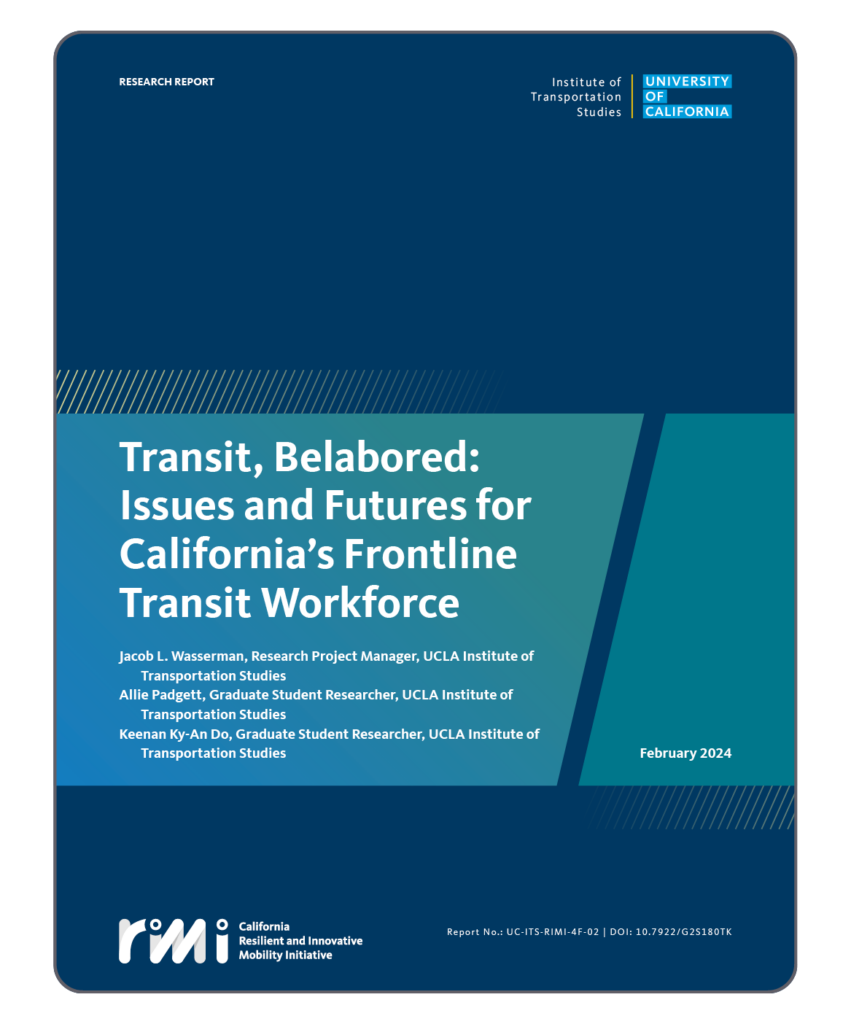
Transit, Belabored: Issues and Futures for California’s Frontline Transit Workforce
This report focuses on frontline transit workforce issues, including employee pay, issues before and after the COVID-19 pandemic, and the workforce shortage. The report is mainly about transit operators, but also touches on mechanics. It draws on quantitative and qualitative data, including wage data by agency and sector, contracts and agency documents, and interviews with union leaders, agency managers, and operators themselves.
Institute of Transportation Studies
February 2024
TOPICS: Hiring and Recruitment , Policy and Planning , Retention , Workforce Shortage

Mentoring: A Tool for Employee Engagement & Retention
APTA’s podcast, The Transit Authority, presents a two-part series on mentoring. The Santa Clara Valley Transportation Authority (VTA) and Greater Cleveland Regional Transit Authority (GCRTA) will discuss their partnerships with ATU to build and manage successful mentoring programs and how mentoring is a critical tool for knowledge transfer, positive work culture, and diverse perspectives.
American Public Transportation Association
January 2024
TOPICS: Career Pathways , Labor-Management Partnerships , Mentorship , Retention

Approaches to Childcare Support in the Transit Industry
Across the nation, the lack of access to affordable and accessible childcare is often a major employment barrier for workers in the transit industry. TWC hosted a pivotal discussion on this issue in the webinar, “Approaches to Childcare Support in the Transit Industry”.
Hear from Barb Cline, Executive Director of Prairie Hills Transit (Spearfish, South Dakota), and Charles Jenkins, Director of the Transport Workers Union Local 100 – New York City Transit Training & Upgrading Fund, who share their approaches to creating childcare solutions tailored for their transit employees. They will delve into the inception of their programs, their ongoing hurdles, and the successes that have marked their journey.
Transit Workforce Center
November 2023
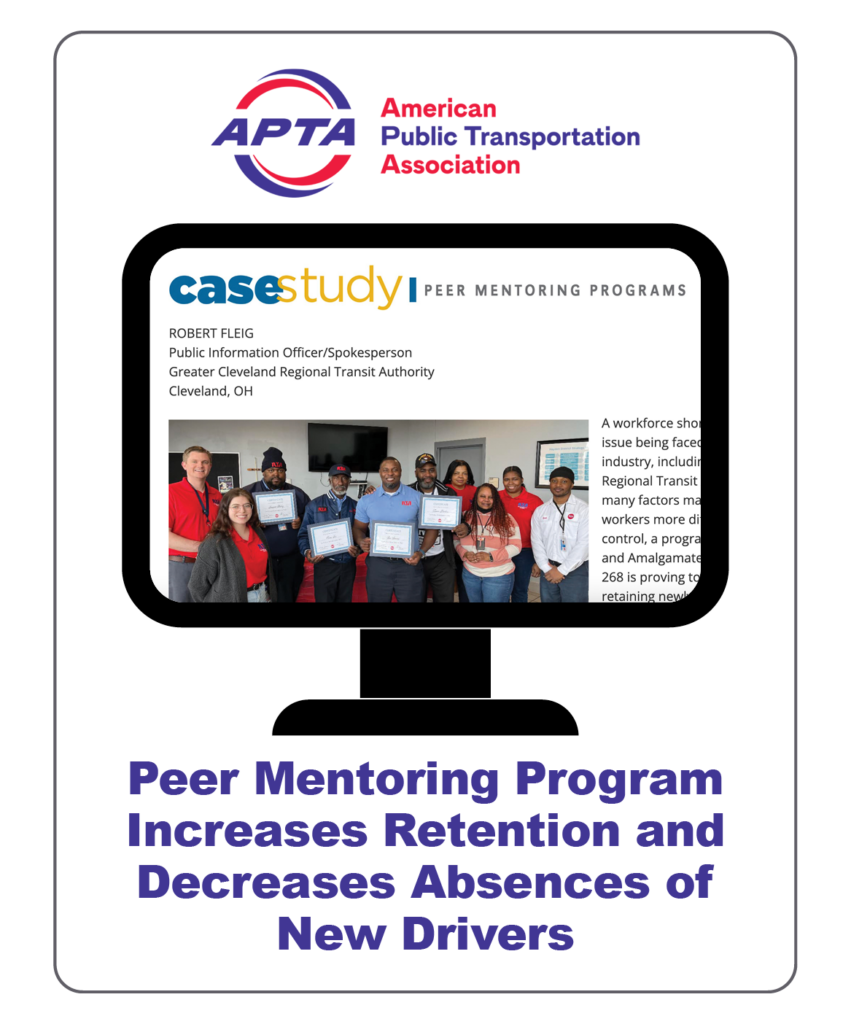
Peer Mentoring Program Increases Retention and Decreases Absences of New Drivers
This case study from APTA’s Passenger Transport presents findings from the mentorship program at Greater Cleveland Regional Transit Authority (GCRTA). GCRTA and ATU local 268 launched their Positive Impact Program, a peer mentoring program that has seen impacts on retention and absenteeism within its first nine months.
American Public Transportation Association
October 2023
TOPICS: Labor-Management Partnerships , Mentorship , Retention , Workforce Shortage
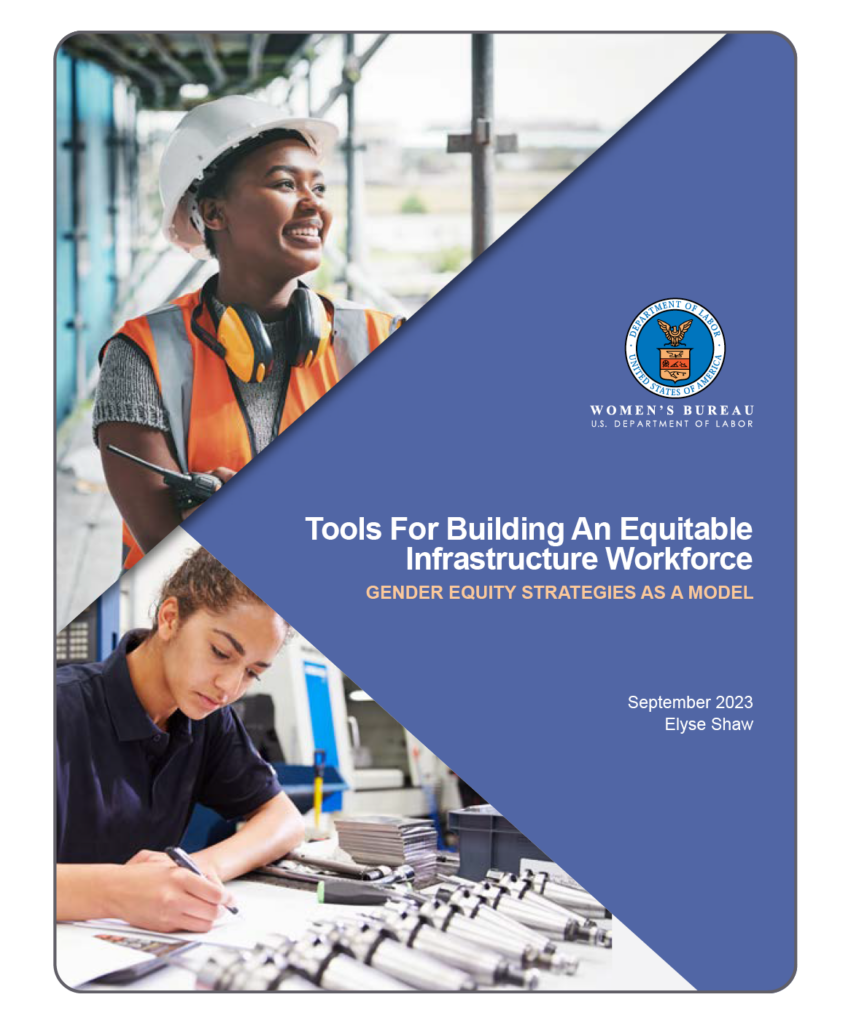
Tools for Building an Equitable Infrastructure Workforce
Department of Labor
September 2023
This toolkit provides guidance on strategies and best practices for recruiting and retaining women in construction, manufacturing, and clean energy jobs. The strategies describe how to make the intentional choice to build a diverse workforce, create targeted recruitment, address barriers of entry, and retain a diverse workforce.
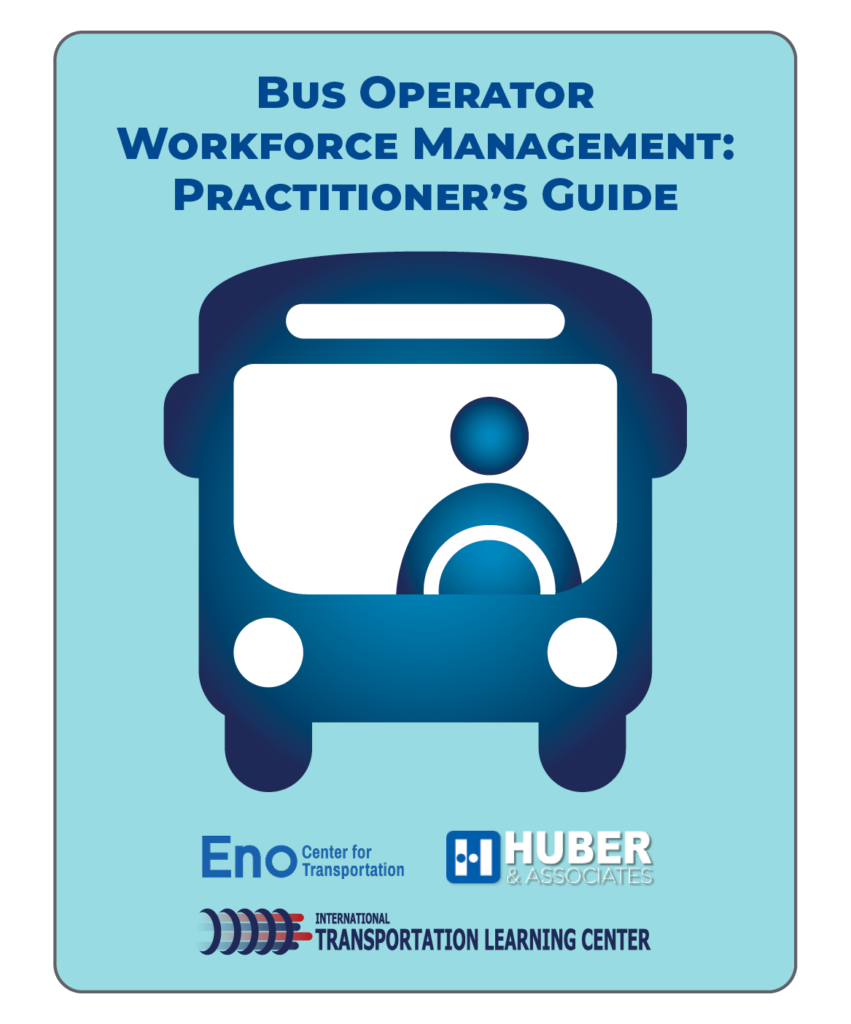
Bus Operator Workforce Management: Practitioner’s Guide
This report, produced by the Eno Center for Transportation, International Transportation Learning Center (ITLC), and Huber & Associates, is a practitioner’s guide that provides recommendations and resources enabling transit agencies to better assess, plan, and implement their operator workforce management programs. A link to a related TRB webinar is also included.
Transit Cooperative Research Program
August 2023
Contributor(s): National Academies of Sciences, Engineering, and Medicine; Transportation Research Board; Transit Cooperative Research Program; Robert Puentes; Philip Plotch; Brianne Eby; Paul Lewis; Karitsa Holdzkom; Xinge Wang; Douglas Nevins; Kenyon Corbett; Melissa Huber
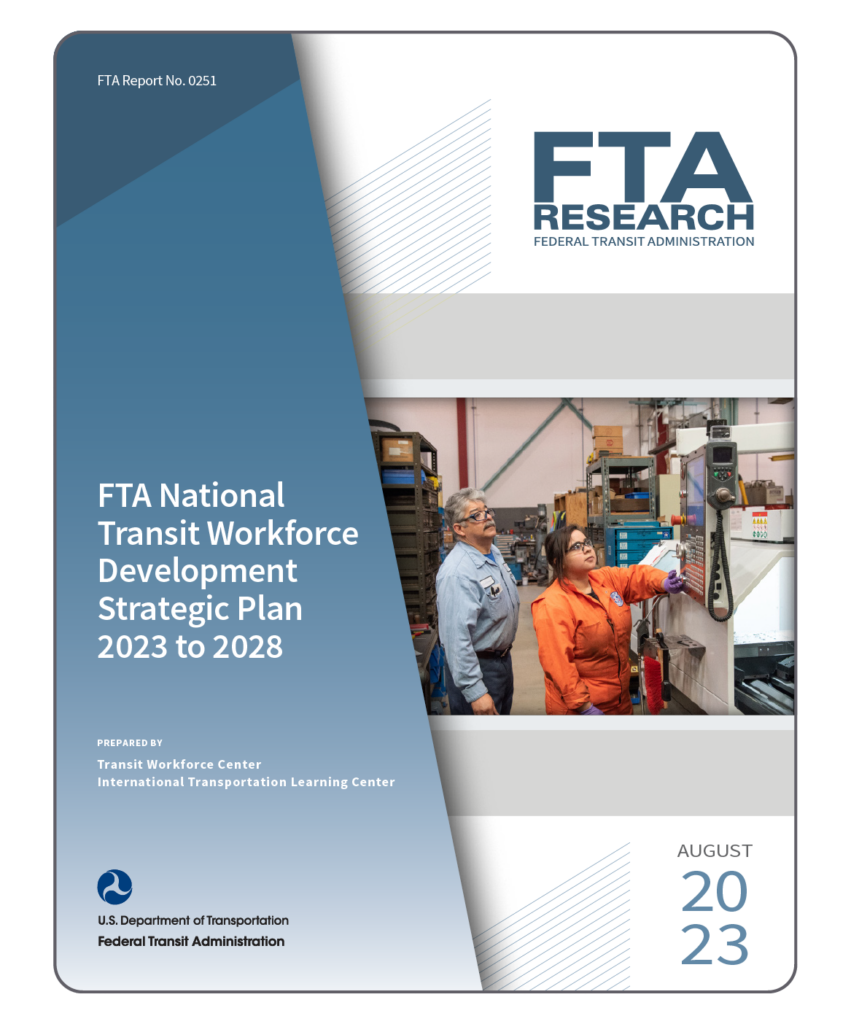
National Transit Workforce Development Strategic Plan 2023 to 2028
Federal Transit Administration
August 2023
TOPICS: Hiring and Recruitment , Policy and Planning , Retention , Safety and Health
The Federal Transit Administration’s (FTA) first National Transit Workforce Development six-year Strategic Plan outlines goals and objectives to address workforce challenges and opportunities in the public transportation industry. The plan has six overarching goals: ensuring worker safety and health, investing in workforce development, driving workforce recruitment, ensuring worker retention, developing worker skills, and tracking success through appropriate metrics. FTA’s Transit Workforce Center led the development of this plan collaborating closely with FTA and with stakeholders across transit agencies, unions, national transit associations, the US Department of Labor, and workers. The plan will guide FTA’s activities and investments to support transit agencies as they recruit, retain, and train the diverse workforce they need today and tomorrow.
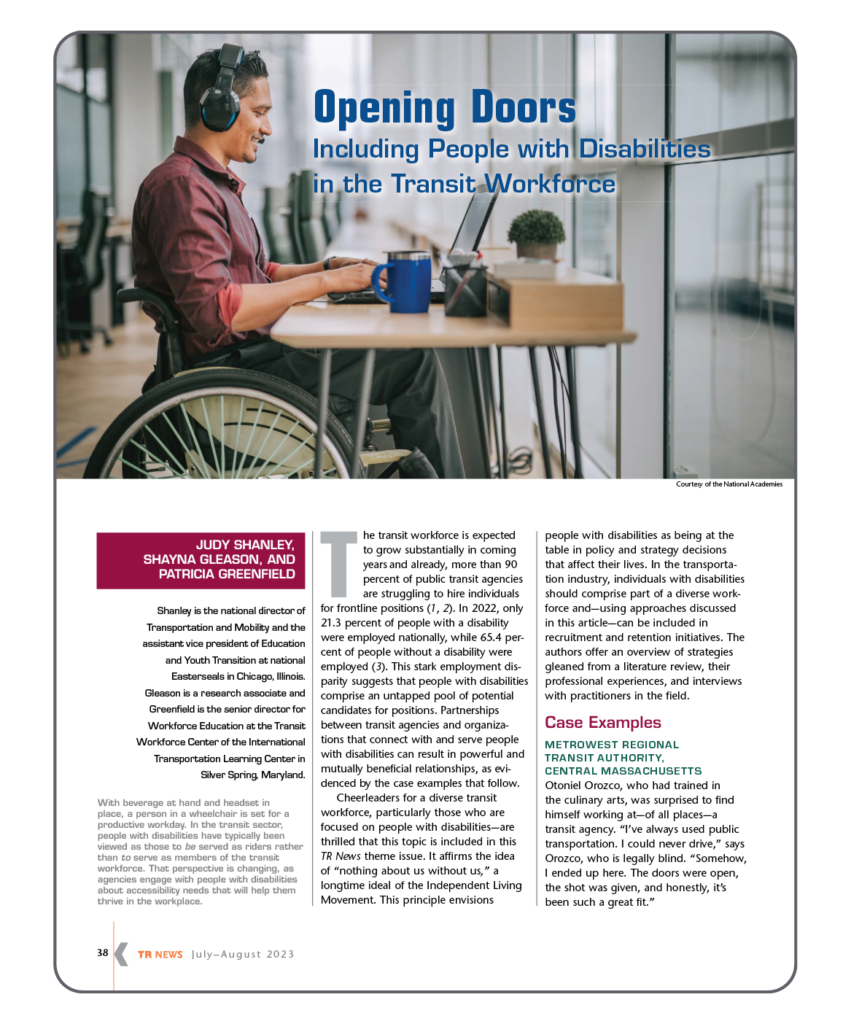
Opening Doors: Including People with Disabilities in the Transit Workforce
TR News
August 2023
In the transportation industry, individuals with disabilities should comprise part of a diverse workforce and can be included in recruitment and retention initiatives. “Opening Doors: Including People with Disabilities in the Transit Workforce” offers an overview of strategies and is one of the feature articles in the July-August 2023 edition (Issue 346) of TR News, TRB’s magazine.
Authors: Judy Shanley (National Center for Mobility Management), Shayna Gleason (Transit Workforce Center), and Patricia Greenfield (Transit Workforce Center)
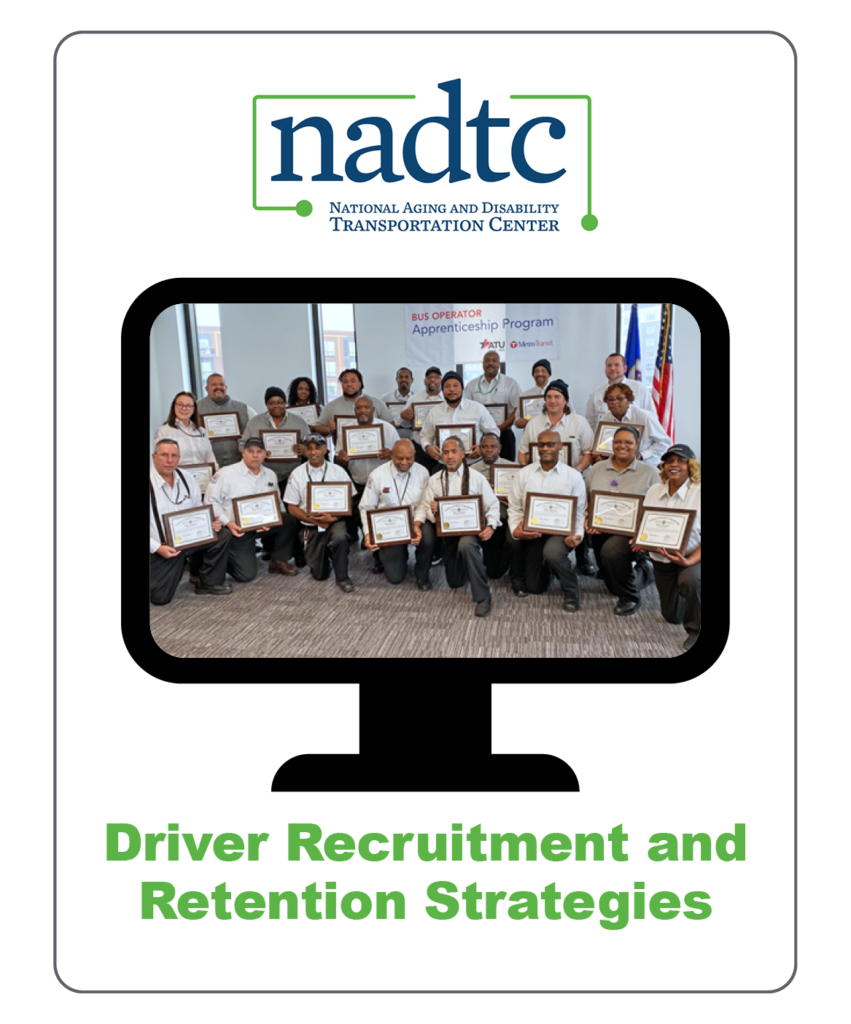
Driver Recruitment and Retention Strategies
This blog post from the National Aging and Disability Transportation Center discusses recruitment and retention strategies for transit agencies, particularly in regard to older and disabled workers in the face of industry-wide labor shortages. It includes examples of successful partnerships and effective mentoring programs.
National Aging and Disability Transportation Center
July 2023
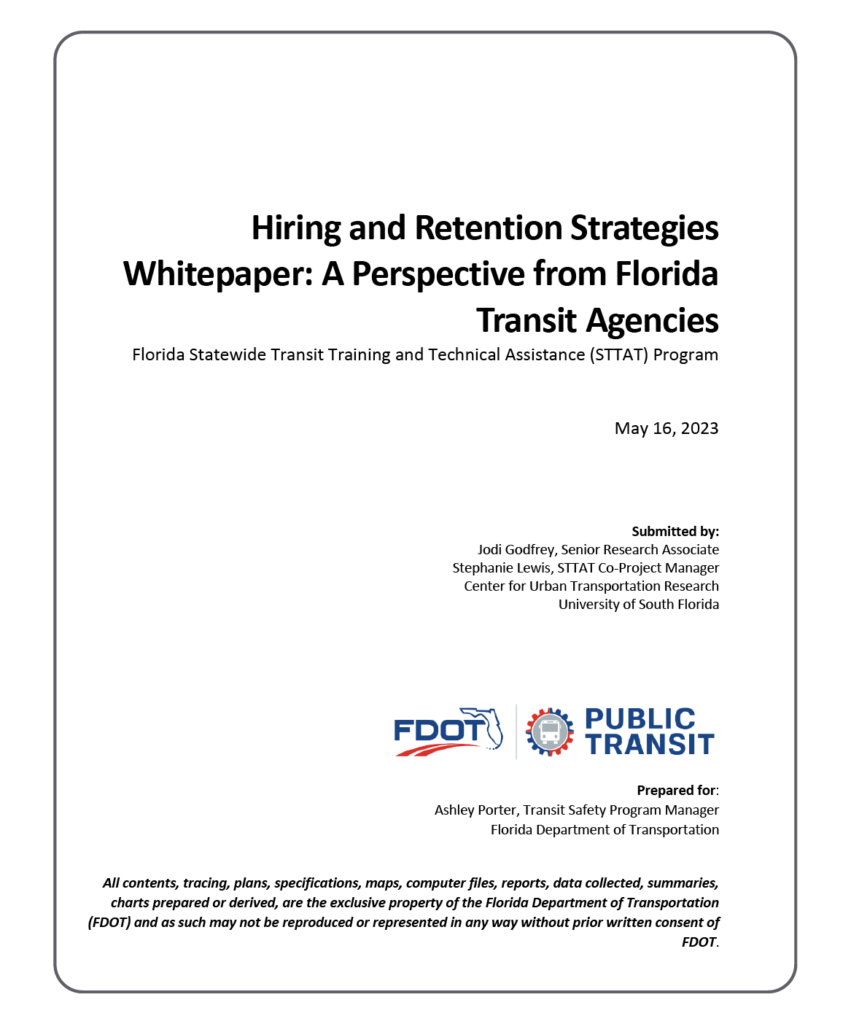
Hiring and Retention Strategies Whitepaper: A Perspective from Florida Transit Agencies
This study examines what transit agencies are doing to address hiring and retention challenges, what strategies are working, and what problems still need to be solved. The report includes six case study sites from Florida transit agencies and one non-Florida transit agency, that were selected due to a variety of characteristics, including partnerships and implemented service changes.
Center for Urban Transportation Research
June 2023
TOPICS: Hiring and Recruitment , Policy and Planning , Retention
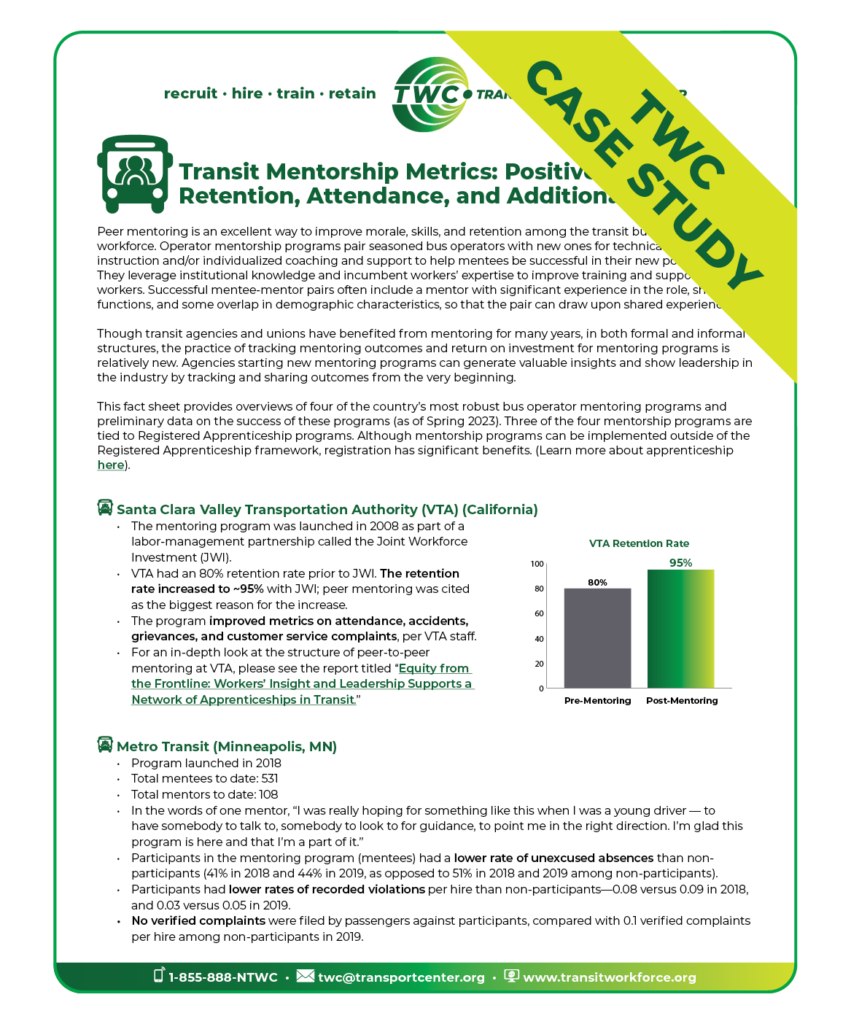
Transit Mentorship Metrics: Positive Signs for Retention, Attendance, and Additional Outcomes
Transit Workforce Center
June 2023
TOPICS: Apprenticeship , Mentorship , Policy and Planning , Retention , Training
This fact sheet provides overviews of four of the country’s most robust bus operator mentoring programs and preliminary data on the success of these programs (as of Spring 2023). Operator mentorship programs pair seasoned bus operators with new ones for technical skill instruction and/or individualized coaching and support to help mentees be successful in their new positions. They leverage institutional knowledge and incumbent workers’ expertise to improve training and support for new workers. The Mentoring Fact Sheet provides insight into the role mentorship programs can play in improving retention rates of workers, decrease unexcused absences, reduce rates of recorded violations, and lower complaints.
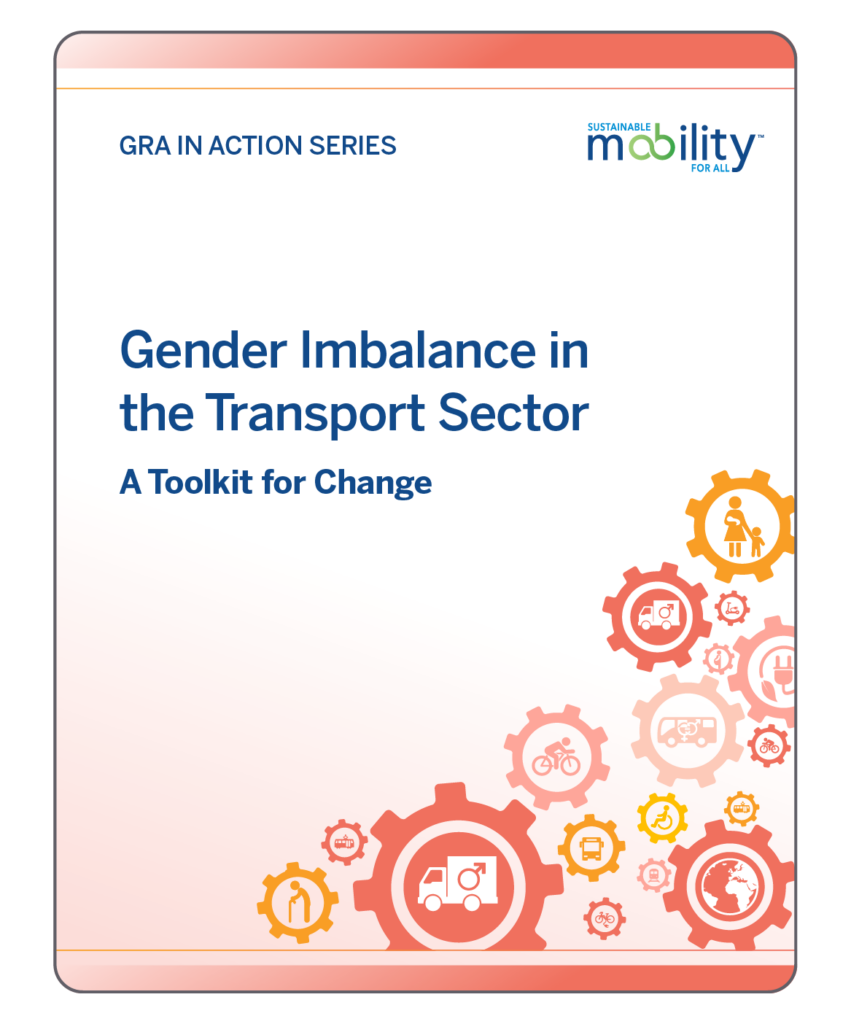
Gender Imbalance in the Transport Sector: A Toolkit for Change
This study builds upon findings from the SuM4All Global Roadmap for Action, which called for the transport sector to address key barriers inhibiting women from accessing decent work in the industry. It delivers a clear overview of the existing employment landscape in transport and recommends and guides positive action for practitioners across the sector. Informed by desk-based research, surveys, interviews, and case studies, the study examines the primary challenges for women entering, remaining in, and progressing in the transport sector worldwide, before presenting a toolkit, which lays out key recommendations for action.
Sustainable Mobility for All
May 2023
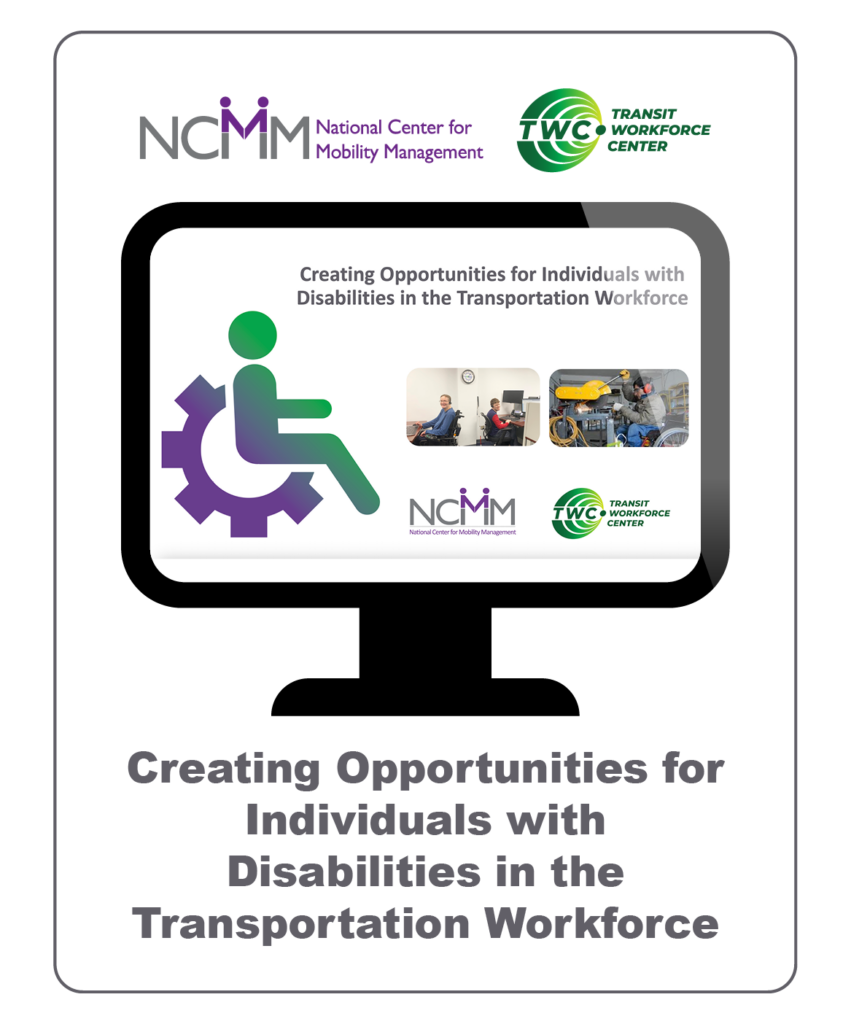
Creating Opportunities for Individuals with Disabilities in the Transportation Workforce
When transportation professionals are equipped with knowledge and skills about disability topics, they can help create welcoming and engaging employment settings for individuals with disabilities. This new NCMM/TWC learning module offers hiring professionals strategies to recruit and retain individuals with disabilities in the transportation workforce. Learn about partnerships, inclusive hiring, and accommodations to attract and retain employees with disabilities.
National Center for Mobility Management; Transit Workforce Center
May 2023
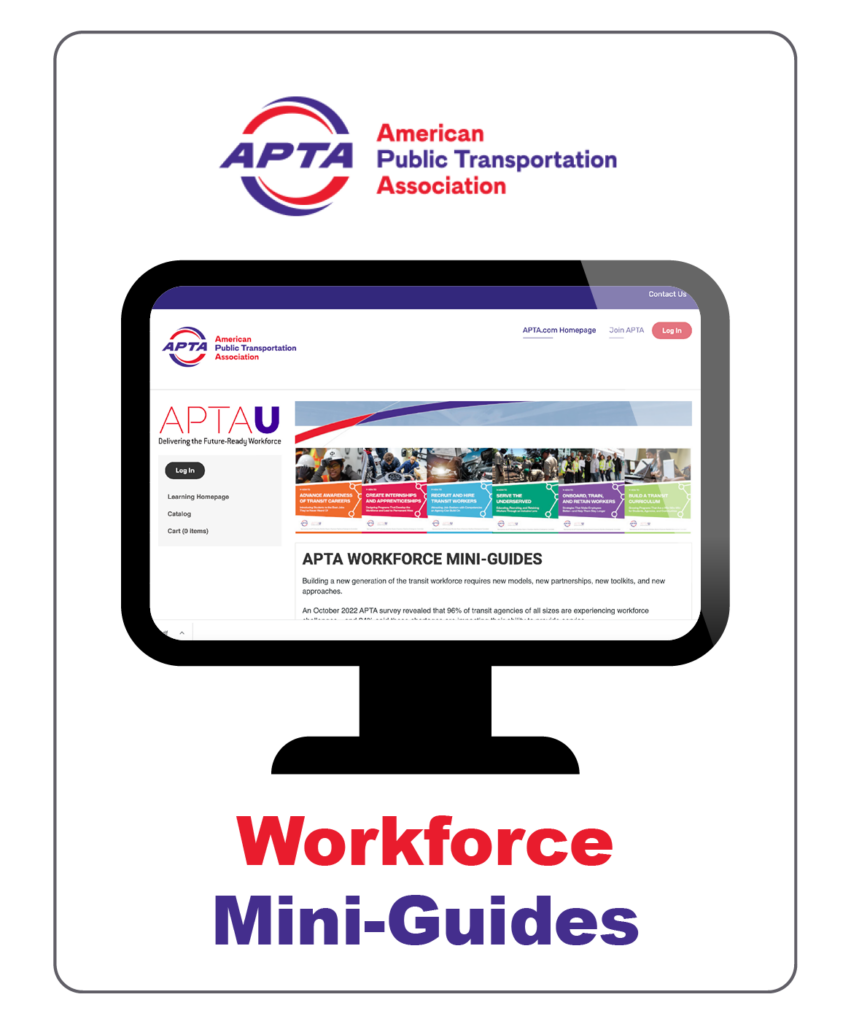
Workforce Mini-Guides
These six workforce development mini-guides are designed to help develop and implement successful strategies to address the critical workforce shortages seen across the public transportation industry. They cover these topics: advancing awareness of transit careers; creating internships and apprenticeships; recruiting and hiring transit workers; serving the underserved in the workforce; onboarding, training, and retaining workers; and building a transit curriculum.
American Public Transportation Association
April 2023
An October 2022 survey conducted by APTA revealed that 96 percent of transit agencies of all sizes are experiencing workforce challenges, and 84 percent said these shortages are impacting their ability to provide service. APTA developed these mini-guides building on their 2021 Transit Workforce Readiness Guide and combining industry insights and stories, case studies, lessons learned, and best practices.
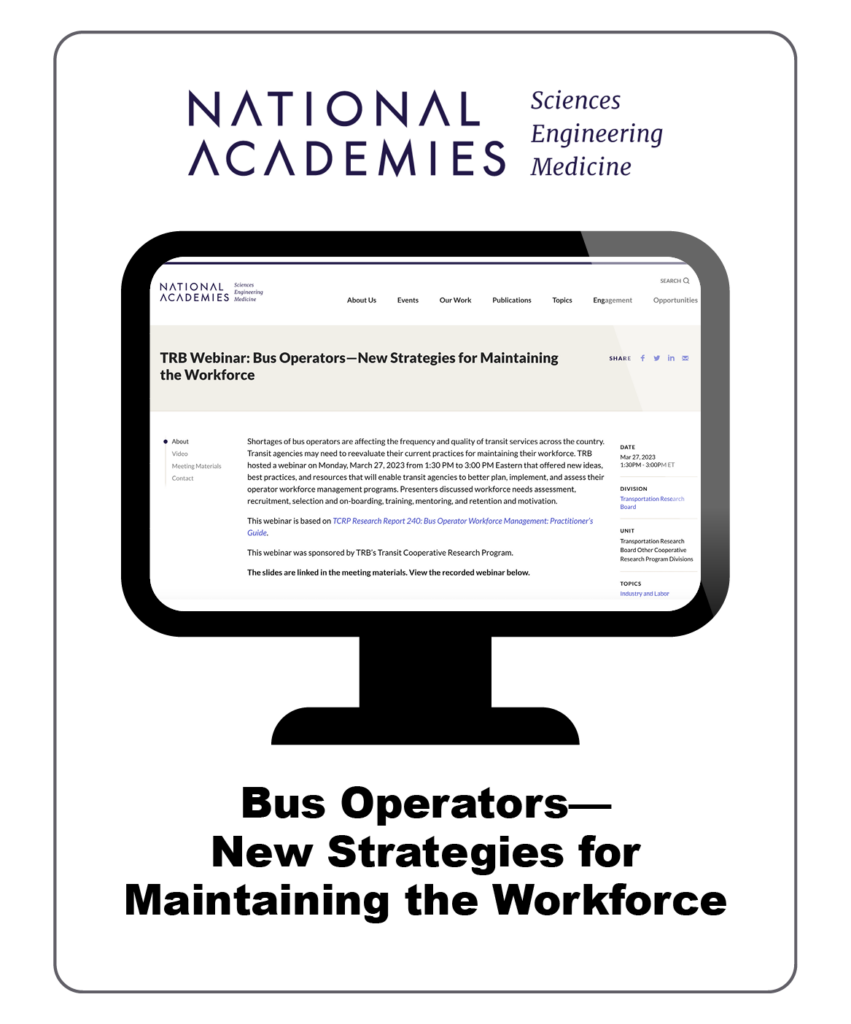
Bus Operators—New Strategies for Maintaining the Workforce
This webinar discusses the ideas, best practices, and resources that will enable transit agencies to better plan, implement, and assess their operator workforce management programs as described in the Bus Operator Workforce Management: Practitioner’s Guide. Presenters discussed workforce needs assessment, recruitment, selection and on-boarding, training, mentoring, and retention and motivation.
Transit Cooperative Research Program
March 2023
TOPICS: Apprenticeship , Hiring and Recruitment , Mentorship , Policy and Planning , Retention , Workforce Shortage
Webinar agenda and presenters
- Bus operator training and retention – Xinge Wang, International Transportation Learning Center
- Lessons from Florida – Trish Collins, Pinellas Suncoast Transit Authority
- Lessons from the Midwest – George F. Fields, Greater Cleveland Regional Transit Authority
- Question and answer session moderated by Robert Puentes, Eno Center for Transportation
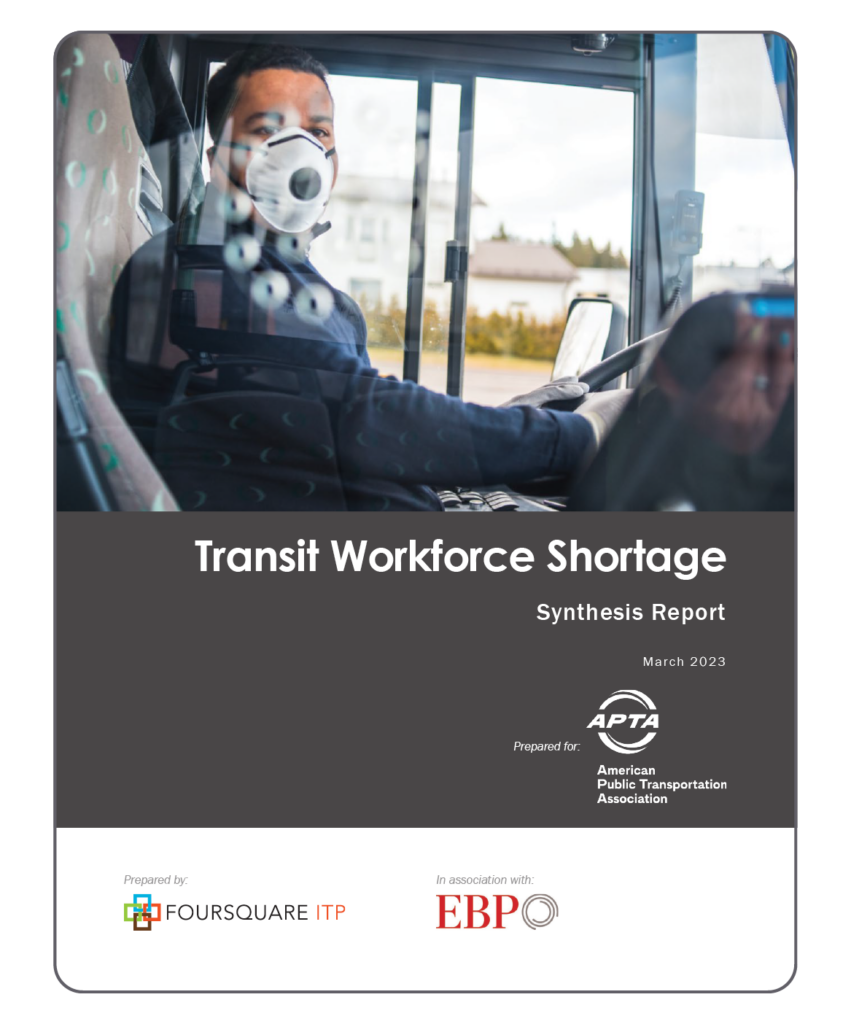
Transit Workforce Shortage: Synthesis Report and Toolkit
The Transit Workforce Shortage Study builds a framework for APTA, its members, and its partner organizations to better understand the workforce shortage’s causes and provides best practices for recruiting, hiring, and retaining transit operations workers.
American Public Transportation Association
March 2023
TOPICS: Hiring and Recruitment , Policy and Planning , Retention , Workforce Shortage
APTA’s Transit Workforce Shortage Study combines information from a survey of public transit workers and interviews with public transportation agencies to provide insight into ways to address the national shortage of transit workers. The report provides information on actions agencies have taken to address the workforce shortage, and the toolkit provides step-by-step answers to workforce shortage scenarios agencies are facing every day.
This report builds on findings from the first interim report.
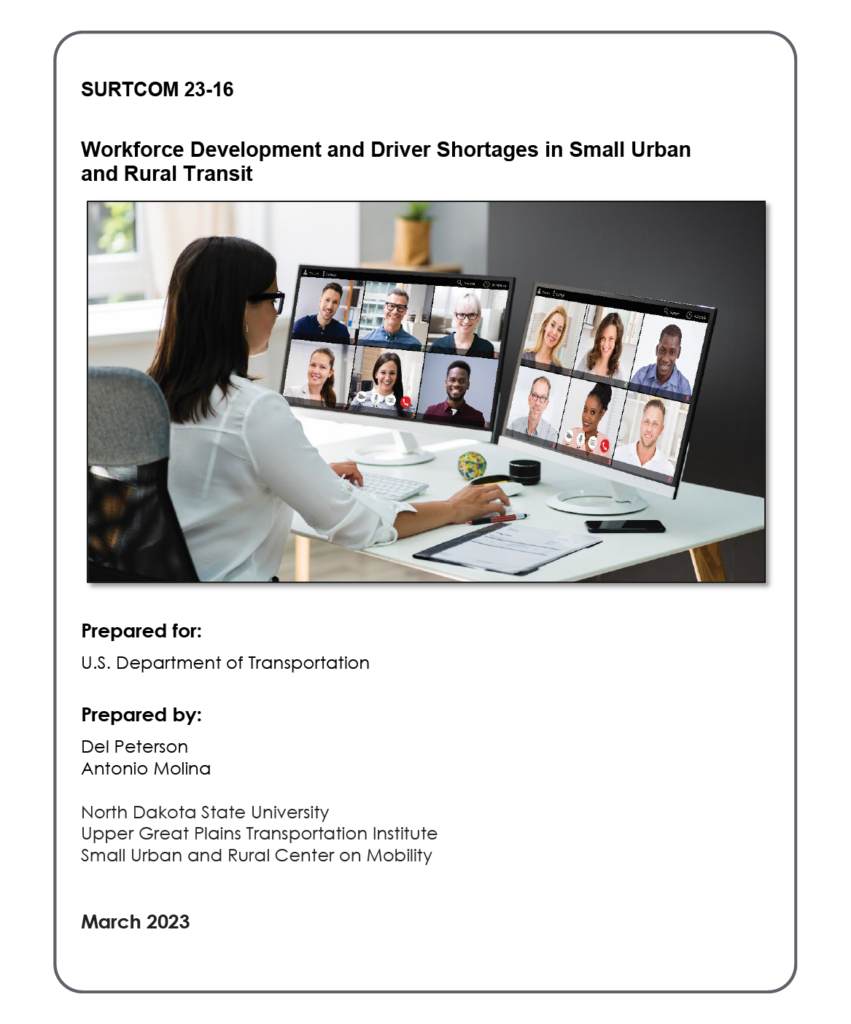
Workforce Development and Driver Shortages in Small Urban and Rural Transit
This report presents a national survey of small urban and rural transit managers to determine current workforce development practices. The survey results outline driver shortages and related issues, including an aging workforce, disruptions in service, and methods of alleviating the shortage.
Small Urban and Rural Center on Mobility
March 2023
TOPICS: Hiring and Recruitment , Retention , Workforce Shortage
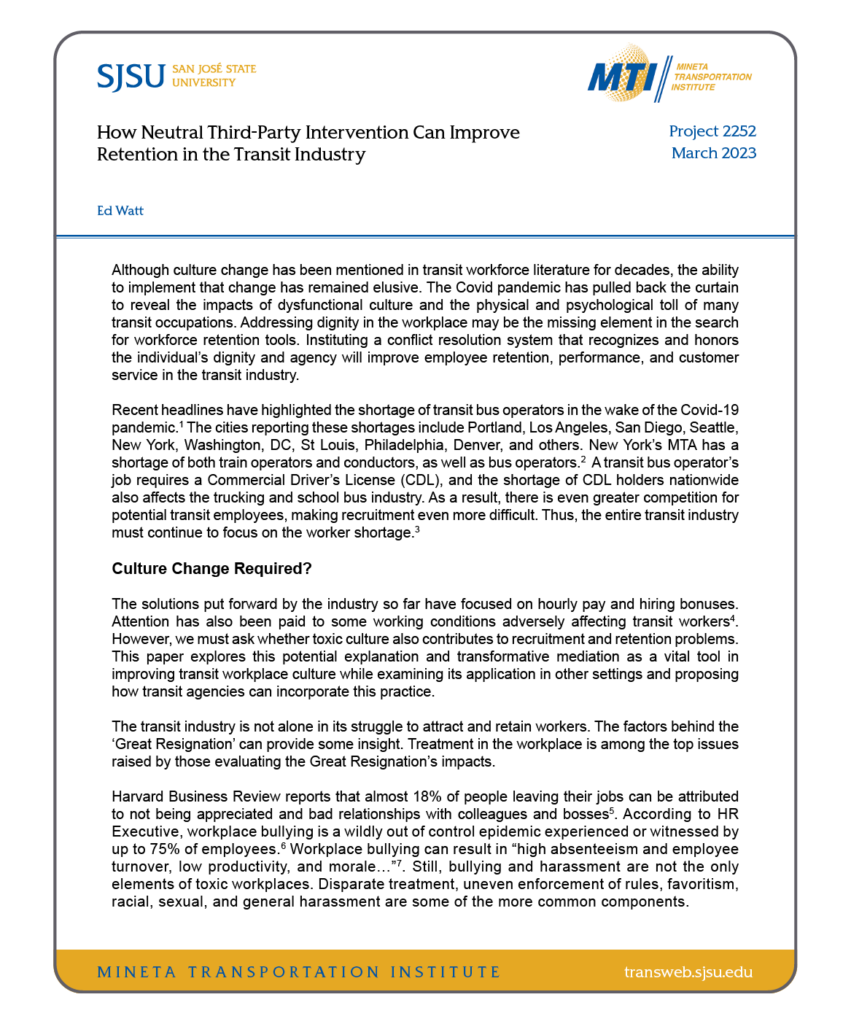
How Neutral Third-Party Intervention Can Improve Retention in the Transit Industry
This study proposes methods that follow transformative mediation in order to improve hiring and retention at transit agencies and other companies by providing an organizational culture that respects each person’s dignity, identity, and opinions.
Mineta Transportation Institute
March 2023
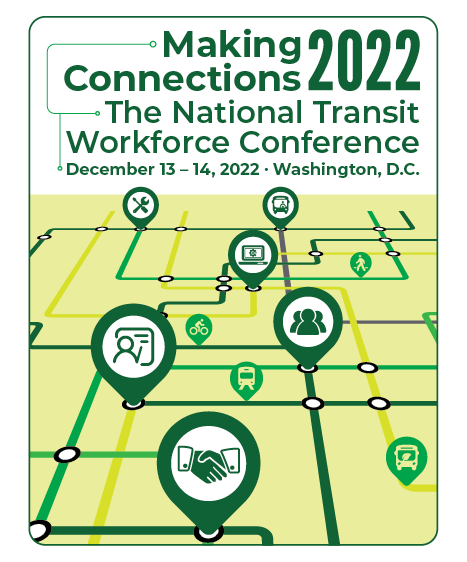
Making Connections 2022 – Conference Overview and Videos
The Transit Workforce Center hosted Making Connections 2022: The National Transit Workforce Conference in Washington, D.C. on December 13-14, 2022. This conference brought together participants from urban, suburban, rural, and tribal public transportation and industry stakeholders in plenaries, workshops, networking, and ongoing dialogue. Discussions and sessions featured topics including recruitment and retention, training, mentoring and apprenticeships, new technologies, preparing today’s and tomorrow’s workforce, and advancing diversity, equity, inclusion, and access.
Transit Workforce Center
December 2022
TOPICS: Apprenticeship , Career Pathways , Diversity, Equity, Inclusion, and Access , Hiring and Recruitment , Labor-Management Partnerships , Making Connections Conference , Mentorship , Program Evaluation and ROI , Retention , Safety and Health , Trainer and Mentor Development , Training , Zero Emission Buses
Session materials from Making Connections 2022 are hosted on the TWC Resource Center. Please click here to view all related materials. A PDF copy of the conference schedule is linked below.
Opening Video:
Recap Video:
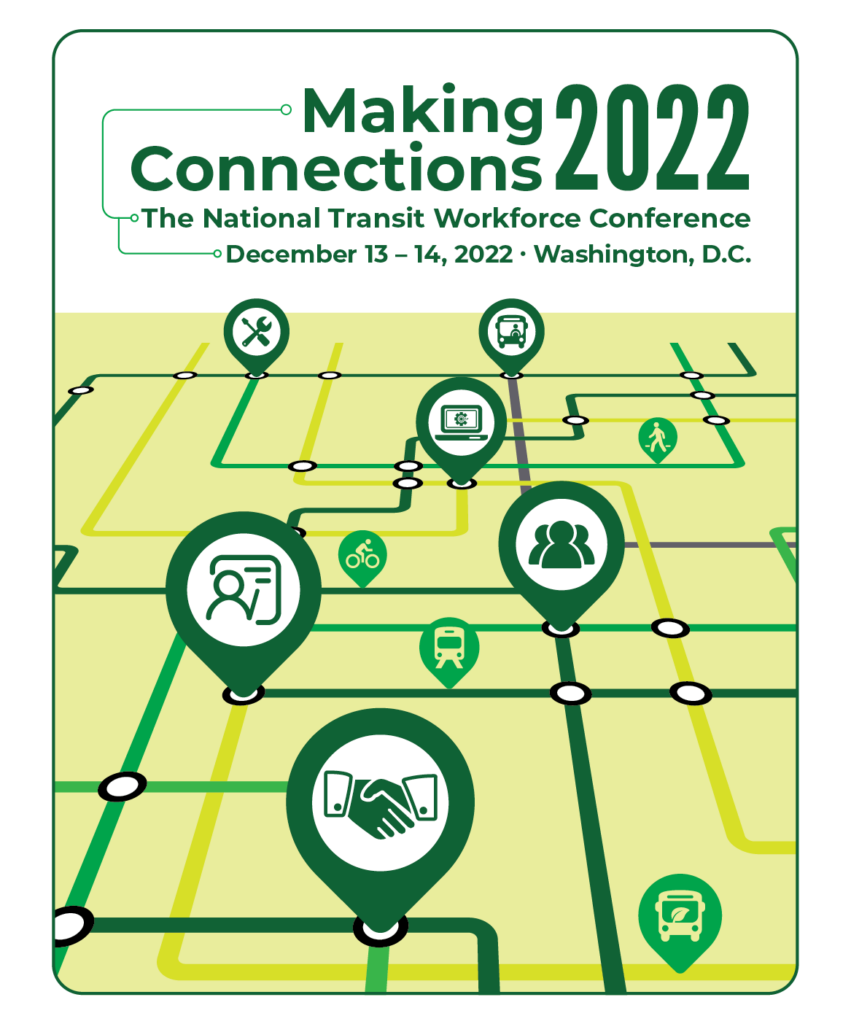
Making Connections 2022 – Driving Bus Operator Recruitment and Retention: Challenges, Opportunities and Innovation
This session about bus operator recruitment and retention was presented as part of TWC’s Making Connections 2022 transit workforce conference in December, 2022.
Transit Workforce Center
December 2022
Session Summary: A headline issue confronting all transit systems today – how to attract and retain bus operators in a tight labor market. This lively session began with presentations from the TCRP F-28 research team and TransitCenter on their recently published national research findings on recruiting, developing and retaining transit bus operators. Labor and management industry practitioners from multiple locations then shared their recruitment approaches and strategies that have been most effective on the ground, and TWC staff summarized the National Transit Frontline Worker Recruitment Campaign.
Moderator
- Rob Puentes: President and CEO – The Eno Center for Transportation
Speakers
- Julia Castillo: Executive Director – Heart of Iowa Regional Transit Agency
- James Duff: Assistant Vice President, Human Resources – Dallas Area Rapid Transit
- Jeff Hazen: Executive Director – Sunset Empire Transportation District
- Steve Jovel: Transportation Superintendent – Santa Clara Valley Transportation Authority
- Robin Phillips: Executive Director – National Rural Transit Assistance Program
- Harpreet Singh: JWI Director – Amalgamated Transit Union Local 265
- David Stephen: Senior Communications Specialist – International Transportation Learning Center/Transit Workforce Center
- Chris Van Eyken: Program Manager – TransitCenter

Making Connections 2022 – Designing an Impactful Training Program: Linking Program Design to Classroom Learning and On-The-Job Training for Transit Frontline Workers
This session about program design was presented as part of TWC’s Making Connections 2022 transit workforce conference in December, 2022.
Transit Workforce Center
December 2022
TOPICS: Apprenticeship , Making Connections Conference , Retention , Training
Session Summary: This workshop covered the basic building blocks of program design. Participants evaluated the pieces needed to develop a robust program that enables trainers to link good program design to effective classroom and on-the-job learning. This workshop was relevant to those looking to build new programs or refine current programs.
Moderator
- Grant Young: Instructional Systems Design Consultant – International Transportation Learning Center/Transit Workforce Center
Speakers
- Mike Glaeser: Manager, Bus Maintenance Training – Washington Metropolitan Area Transit Authority
- Colleen May: Senior Director of Training – Southeastern Pennsylvania Transportation Authority
- Danielle Wallace: Apprenticeship and Pathways Manager – King County Metro Transit

Making Connections 2022 – Meeting Industry Needs: Feedback Session on FTA’s Draft Strategic Workforce Development Plan
Transit Workforce Center & Federal Transit Administration
December 2022
Feedback collected during this session and in subsequent engagements informed the development of FTA’s National Transit Workforce Development Strategic Plan 2023 to 2028, which has since been released.
Speakers
- Mary Leary: Acting Associate Administrator for Research, Demonstration and Innovation – Federal Transit Administration
This handout was shared with participants in a feedback session held during TWC’s Making Connections 2022 transit workforce conference in December, 2022.

Making Connections 2022 – Mentoring: A Great Route to Frontline Workforce Development
This session about mentoring was presented as part of TWC’s Making Connections 2022 transit workforce conference in December, 2022.
Transit Workforce Center
December 2022
Session Summary: This session explored how transit agencies can use structured mentoring programs and mentor training as an effective approach to deal with the challenges of recruiting, supporting, training, and retaining drivers and technicians. Current and former mentors and mentor program coordinators from labor and management discussed the fundamentals of mentoring, the mentoring process and its impact on employees and agencies, along with the varied ways mentoring can and should be an integral part of any training or apprenticeship program.
Moderator
- Stu Bass: Principal – Progress Worx; Founding Director – Keystone Development Partnership
Speakers
- Raul “Kiko” Diaz: Senior Assistant Business Manager – San Diego Metropolitan Transit System/IBEW Local 465
- Rich Hibbs: Co-Director – California Transit Works
- Dionna McCane: Mentorship and Apprenticeship Coordinator – IndyGo
- Ibrahim Ouattara: Workforce Development Manager – IndyGo
- Troy Thornton: Mentor/Bus Operator – Golden Gate Transit/Amalgamated Transit Union Local 1575
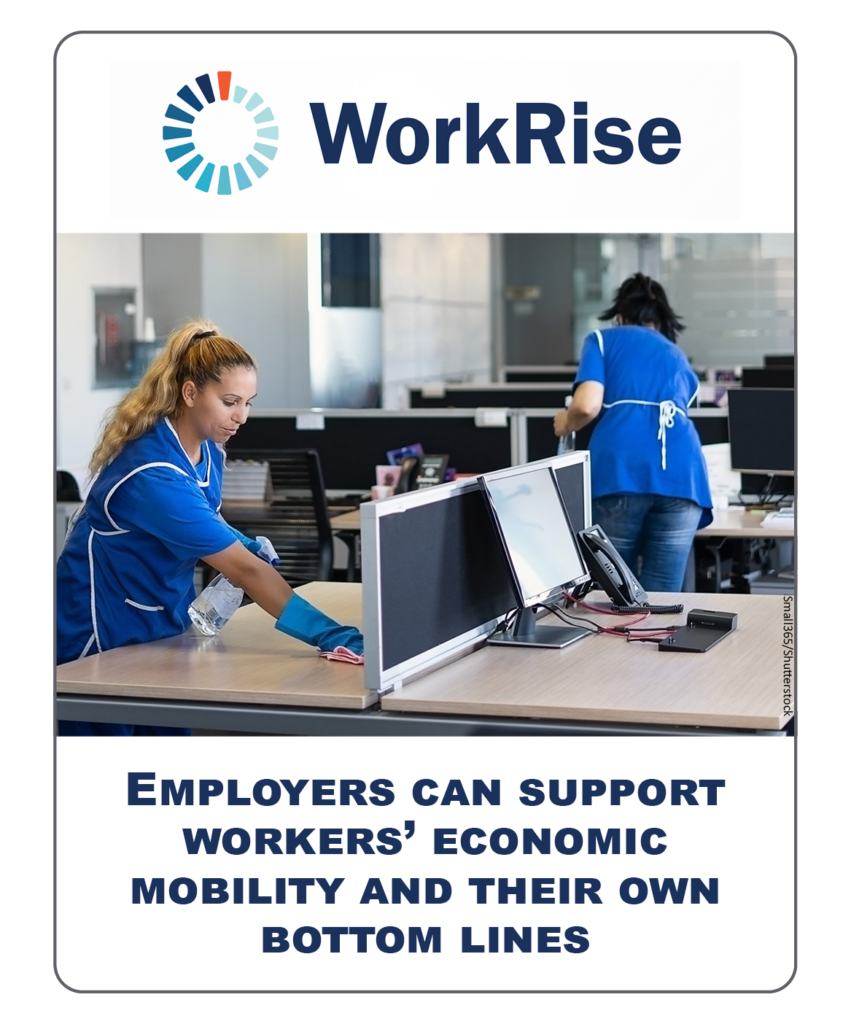
Employers can support workers’ economic mobility and their own bottom lines
This article provides a concise description of several strategies employers can use to create clear advancement pathways in their workplaces, which will help attract and retain quality candidates. It discusses research around what modern-day employees are looking for in a workplace and a position. It also links to a related article, which provides an overview of the framework created by Jobs for the Future (JFF) to describe the components of a good job.
WorkRise
November 2022
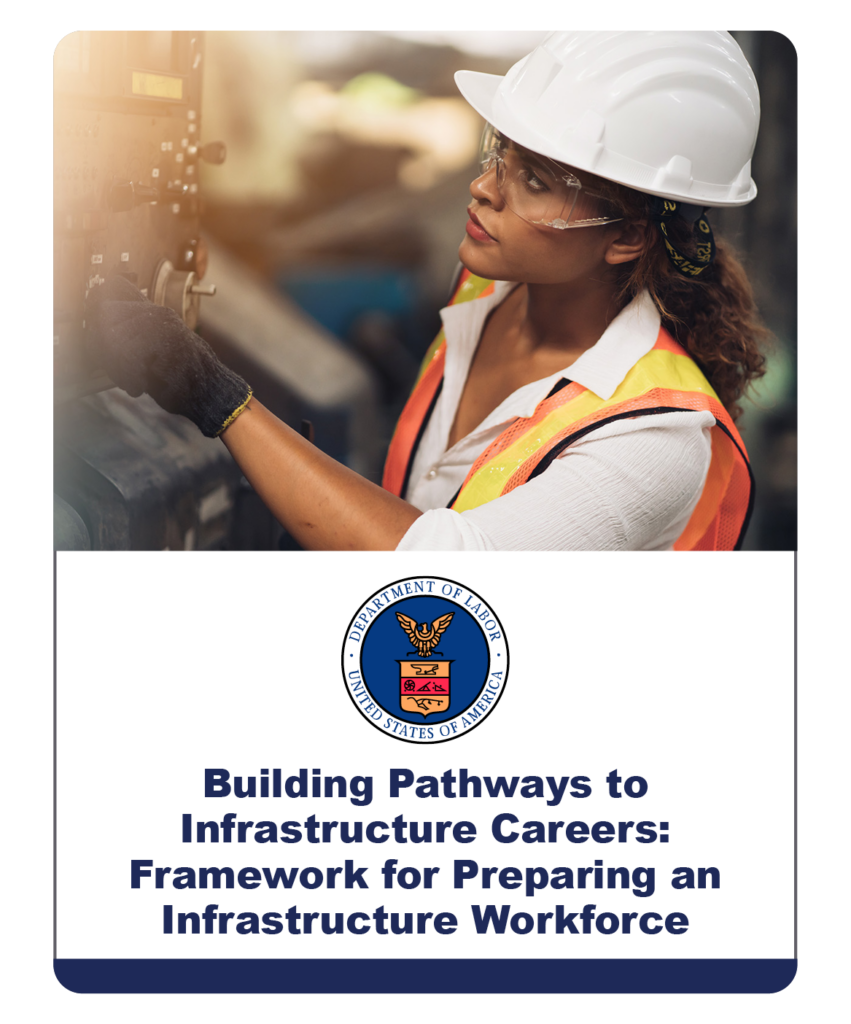
Building Pathways to Infrastructure Careers: Framework for Preparing an Infrastructure Workforce
This resource provides a framework for all workforce stakeholders, including infrastructure project leads, to engage the public workforce system in implementing the Bipartisan Infrastructure Law with strong workforce commitments and proven strategies that produce high-quality education, training, and employment opportunities for all workers.
U.S. Department of Labor, Employment and Training Administration
October 2022
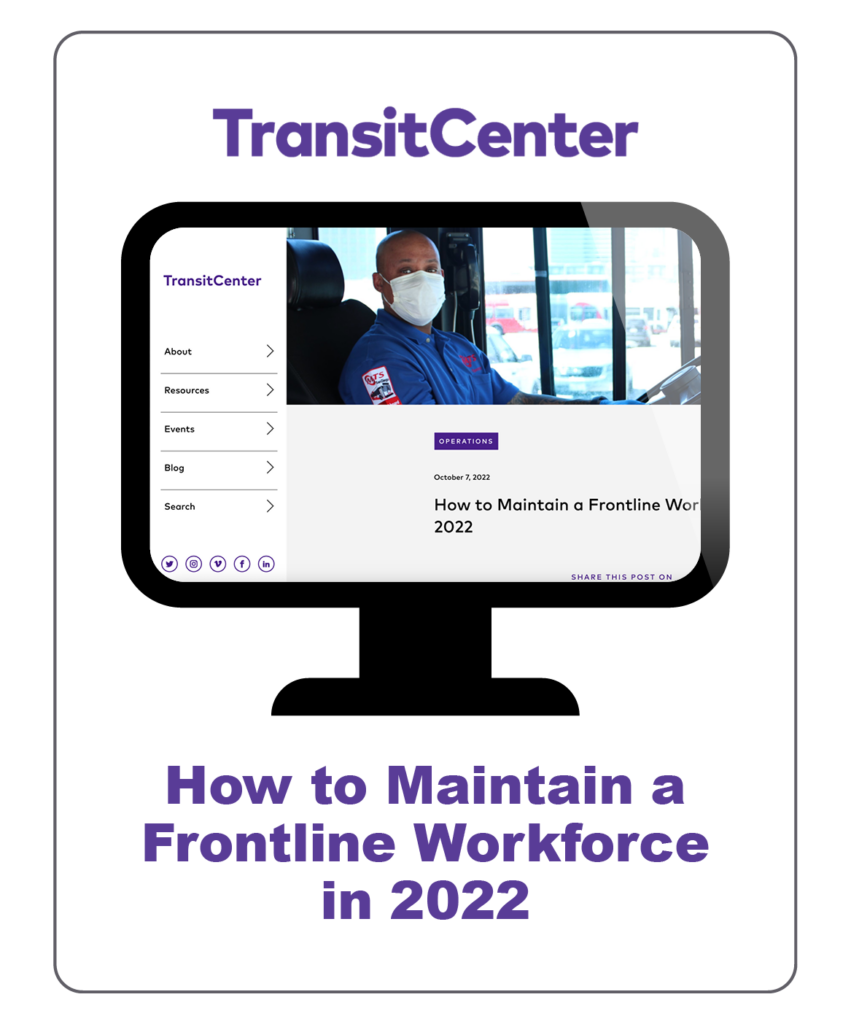
How to Maintain a Frontline Workforce in 2022
TransitCenter
October 2022
TOPICS: Hiring and Recruitment , Retention
This blog post considers steps taken by transit agencies in New York City and San Diego in order to bolster and maintain their frontline workforces in the aftermath of the pandemic and years of labor shortages in the transit industry. The post describes actions like increasing wages, easing CDL requirements, and increasing recruitment efforts.
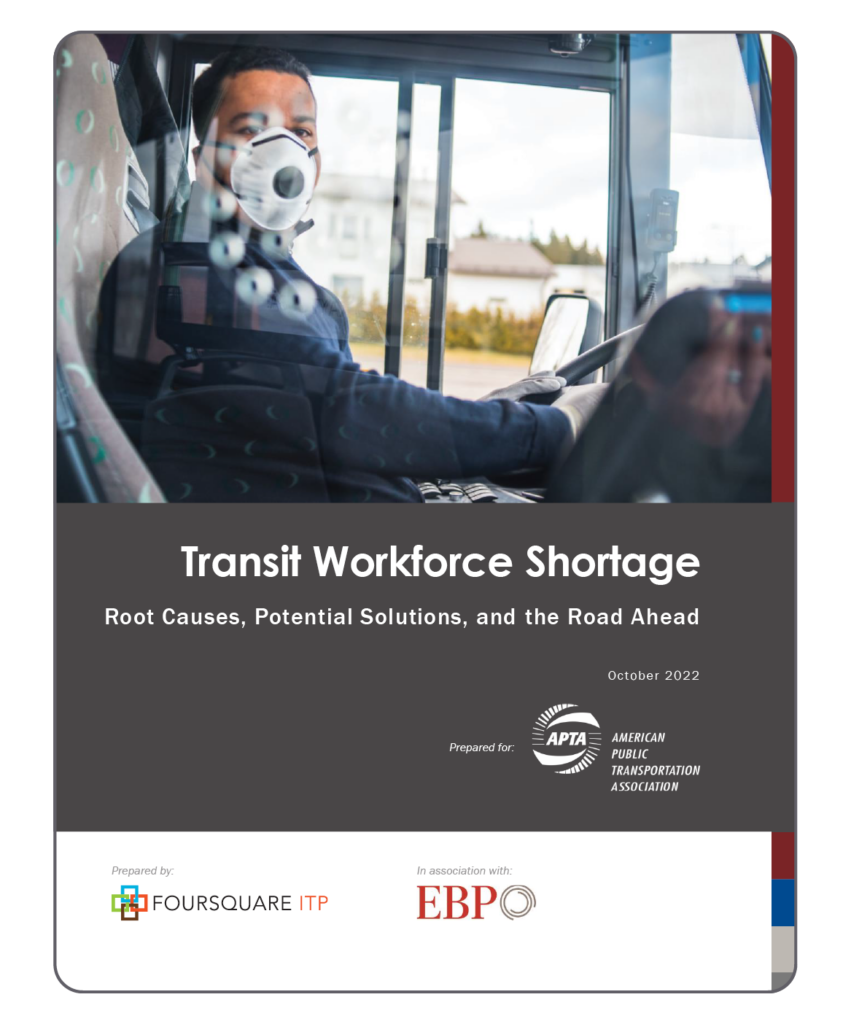
Transit Workforce Shortage: Root Causes, Potential Solutions, and the Road Ahead
American Public Transportation Association
October 2022
TOPICS: Hiring and Recruitment , Policy and Planning , Retention , Workforce Shortage
Public transit providers across North America face a shortage of operators and mechanics during a period of economic instability and reshuffling exacerbated by the COVID-19 pandemic. However, agencies’ ability to respond to the worker shortage has been hampered by inadequate information about its causes and effects. The Transit Workforce Shortage Study builds a framework for APTA, its members, and its partner organizations to better understand the workforce shortage’s causes and provides best practices for recruiting, hiring, and retaining transit operations workers. The study is comprised of two phases. This document, the Interim Findings Report, synthesizes the findings from Phase 1, which included a survey of transit agencies and background research into the macro causes of the shortage.
This report was followed by a full synthesis report and toolkit.
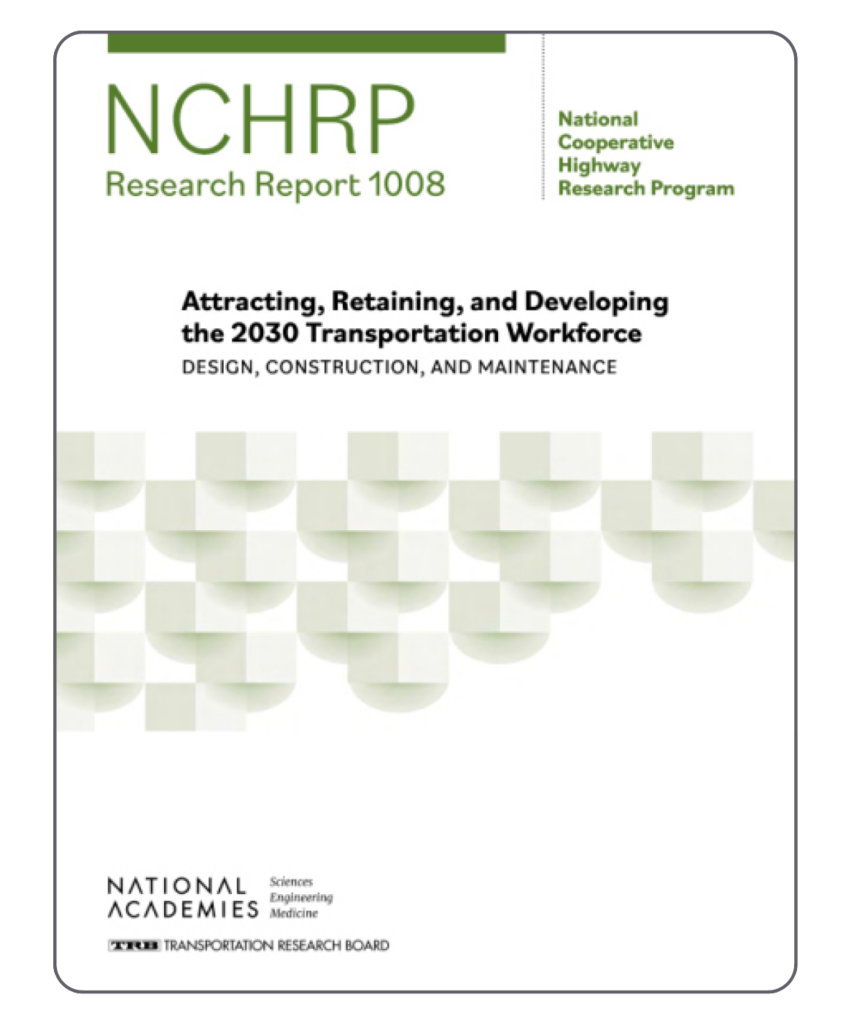
Attracting, Retaining, and Developing the 2030 Transportation Workforce
This report provides a guide with specific strategies and action plans to help agencies identify and address workforce needs through 2030 and beyond.
National Cooperative Highway Research Program
October 2022
State departments of transportation are responsible for providing a safe, efficient, and effective transportation system of infrastructure and services. To meet these responsibilities, transportation agencies need a highly skilled workforce with the expertise required to identify and address current transportation needs while also being prepared to address the challenges of the future.
Contributor(s): National Academies of Sciences, Engineering, and Medicine; Transportation Research Board; National Cooperative Highway Research Program; Candace Blair Cronin; Allison Alexander; Grace Arnold; Juan Carlos Batarse; Kelly Dray; Sasha Iliev; Jessica Jenkins; Erik Smallwood; Rachel Smart; Jake Streng; Mara Campbell; Susan Gallagher; Tyler Reeb; Tom O’Brien; Glenn McRae
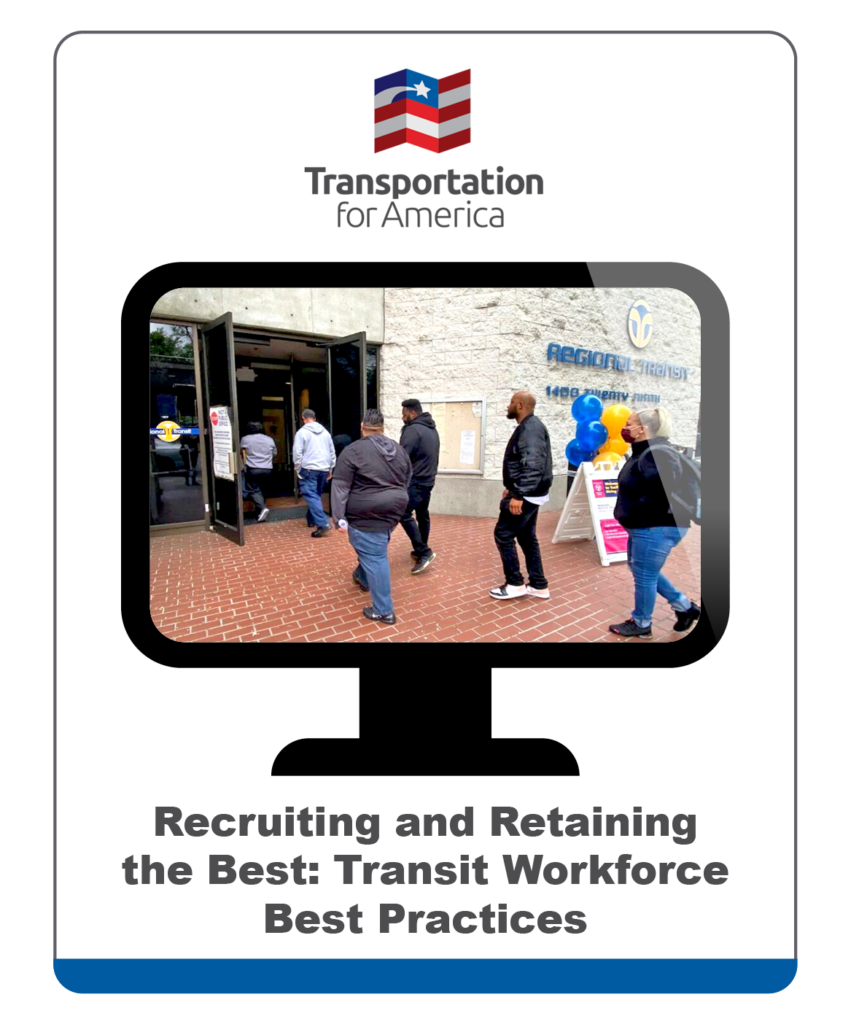
Recruiting and Retaining the Best: Transit Workforce Best Practices
This blog post from Transportation for America details successful strategies and best practices employed by transit agencies to empower their operator and maintenance workforces.
Transportation for America
September 2022
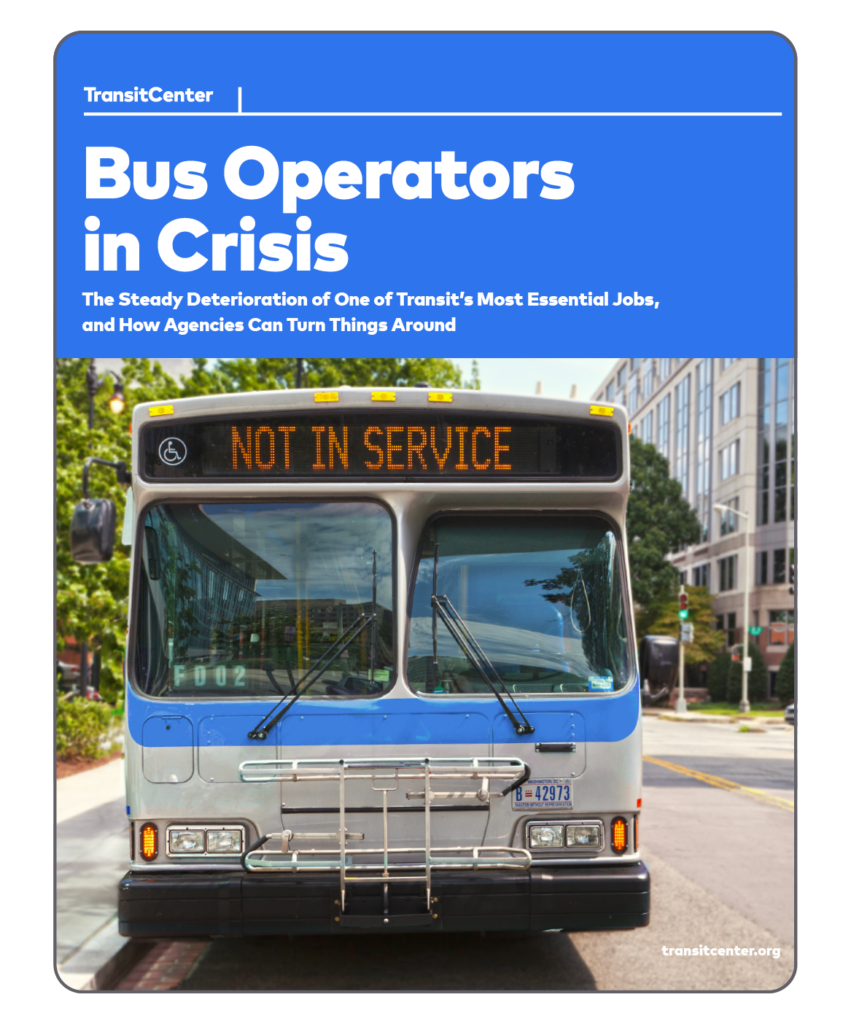
Bus Operators in Crisis
TransitCenter’s report, entitled Bus Operators in Crisis: The Steady Deterioration of One of Transit’s Most Essential Jobs, and How Agencies Can Turn Things Around, analyzes the nationwide phenomenon of bus operator shortages and advocates for enhanced job quality in the occupation. It details the challenges American operators are facing, and offers solutions that transit agencies can take to solve issues locally, as well as steps that state and the federal governments can take to provide agencies with necessary support.
TransitCenter
July 2022
This resource also includes a link to a webinar hosted in July, 2022 presenting information from the report and slides from the webinar.
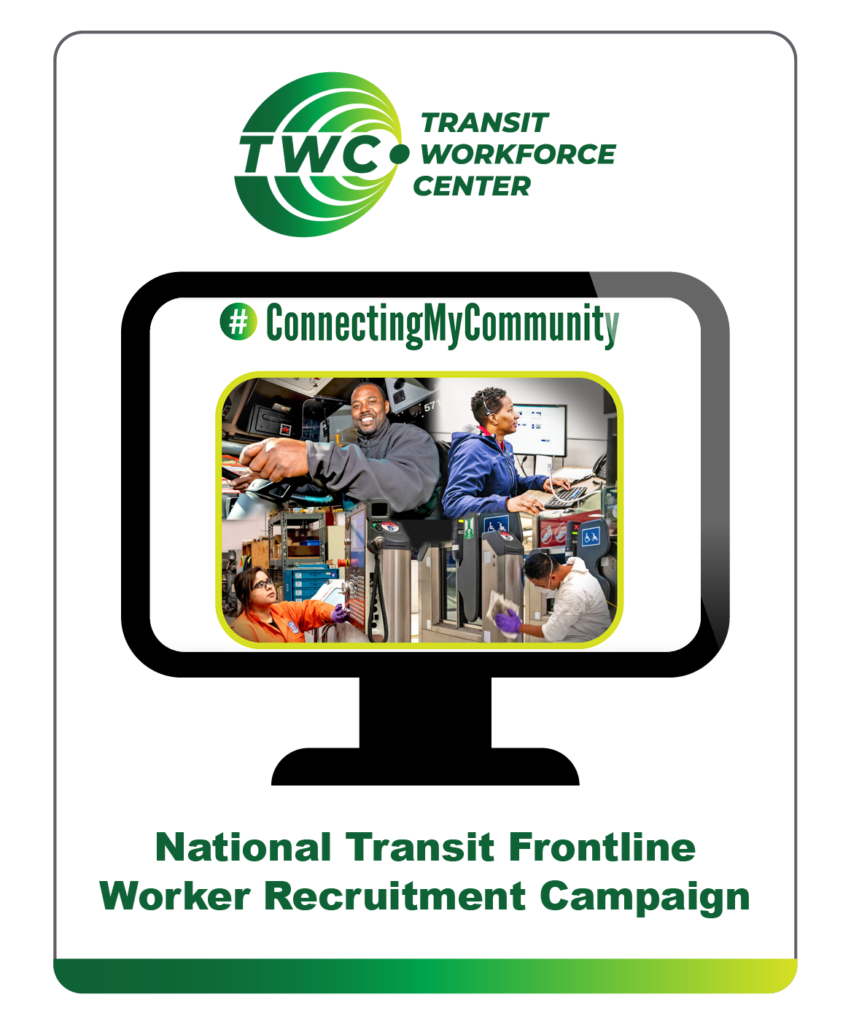
National Transit Frontline Worker Recruitment Campaign
Across the United States, whether large, small, urban, rural, or tribal, transit agencies are facing the challenge of recruiting and retaining drivers, mechanics, and technicians who can operate and maintain the buses of our public transit systems. To help support local transit efforts, TWC is developing the #ConnectingMyCommunity national frontline worker recruitment campaign, coordinated with the Federal Transit Administration (FTA) and industry, labor, and community partners from around the country.
Transit Workforce Center
July 2022
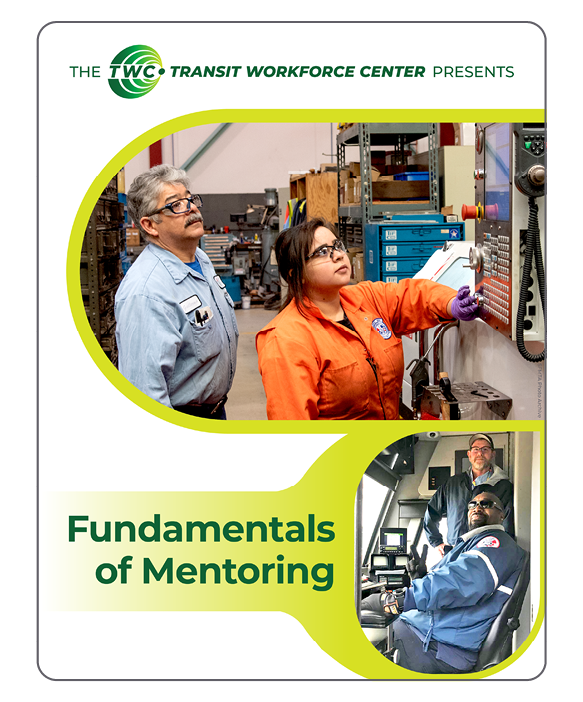
Strategic Workforce Planning in Transit: Fundamentals of Mentoring
Transit Workforce Center
June 2022
TOPICS: Apprenticeship , Mentorship , Retention , Trainer and Mentor Development
This is the third in the Transit Workforce Center’s webinar series on strategic workforce development planning in transit. Labor and management leaders from across the country discussed the impact of mentorship programs in their agencies.
Mentor programs provide a powerful and effective tool for workforce development and retention. For maintenance occupations, mentors deliver hands-on training support, putting skills in diverse workplace contexts beyond the classroom. For bus operators, mentors provide guidance that addresses real world situations, building and expanding on basic training and creating ongoing support for each new operator. In every transit agency across all occupations, seasoned employees have stores of knowledge waiting to be shared. Without mentorship, this knowledge can be lost when workers retire or move on. A well-structured mentorship program, designed in partnership with the workers, ensure this expertise is passed on. Strong mentorship programs also provide mentors with leadership opportunities and mentees with the skills and confidence they need to succeed, increasing expertise and morale throughout the organization.
Linked below are a video recording of the webinar, the associated slides, and a webpage where all past TWC webinars are available.
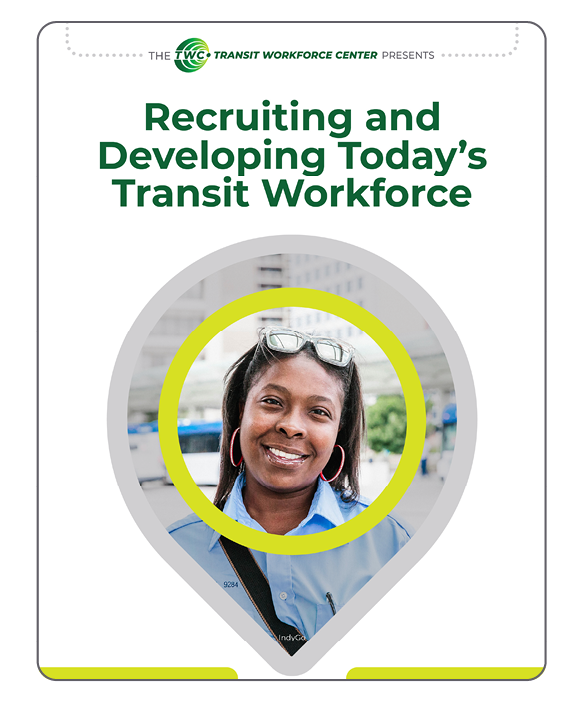
Strategic Workforce Planning in Transit: Recruiting and Developing Today’s Transit Workforce
This is the second in the Transit Workforce Center’s webinar series on strategic workforce development planning in transit. TWC’s first webinar examined workforce development for the incumbent workforce. This second webinar focuses on how transit agencies and partner organizations are working to meet the significant recruitment challenges across the country and how to best turn these challenges into opportunities to reach, attract, and retain a diverse workforce. Two transit agencies and their labor partners discuss their innovative outreach and recruitment programs, including mentoring, pre-apprenticeships, and community college partnerships, followed by a presentation from a national organization leader who has coordinated cross-sectoral recruitment initiatives with agencies across the U.S.
Transit Workforce Center
June 2022
Linked below are a video recording of the webinar, the associated slides, and a webpage where all past TWC webinars are available.
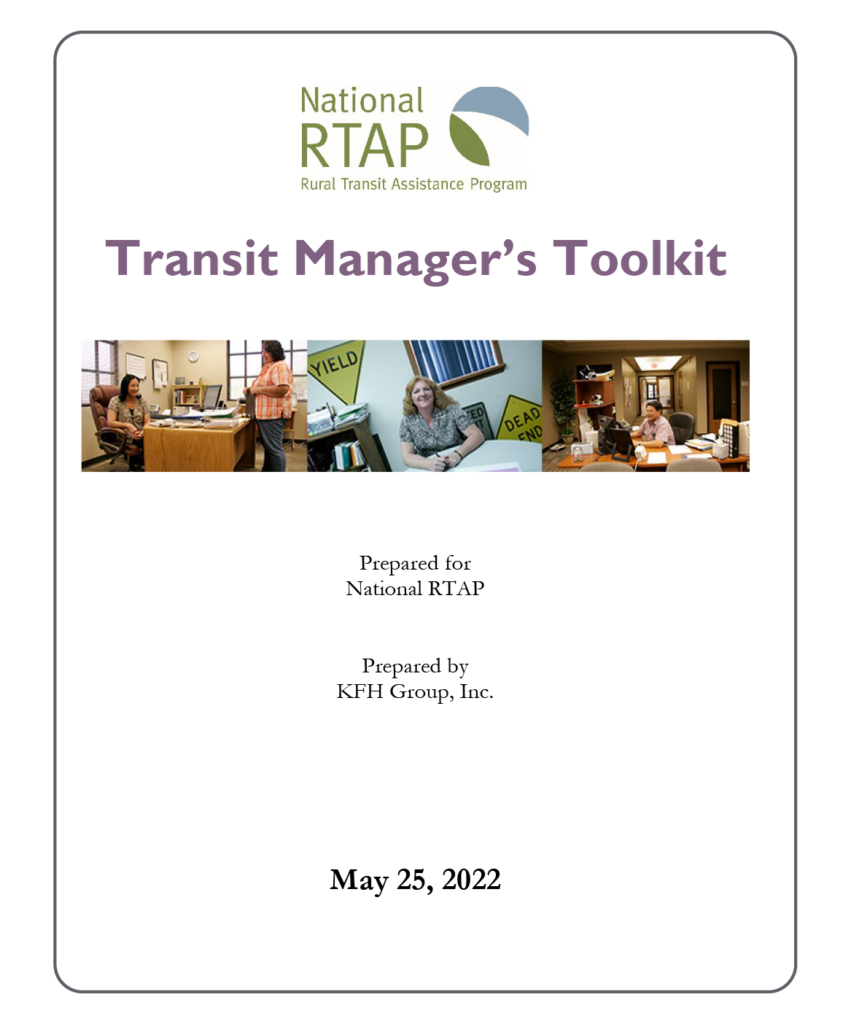
Transit Manager’s Toolkit: Driver Recruitment, Training, and Retention
This toolkit from National RTAP introduces both requirements and suggested practices in driver recruiting/hiring, retention/motivation, and training. It includes information about federal requirements, how to create a positive work environment, and training standards.
National Rural Transit Assistance Program
May 2022
TOPICS: Hiring and Recruitment , Retention , Training
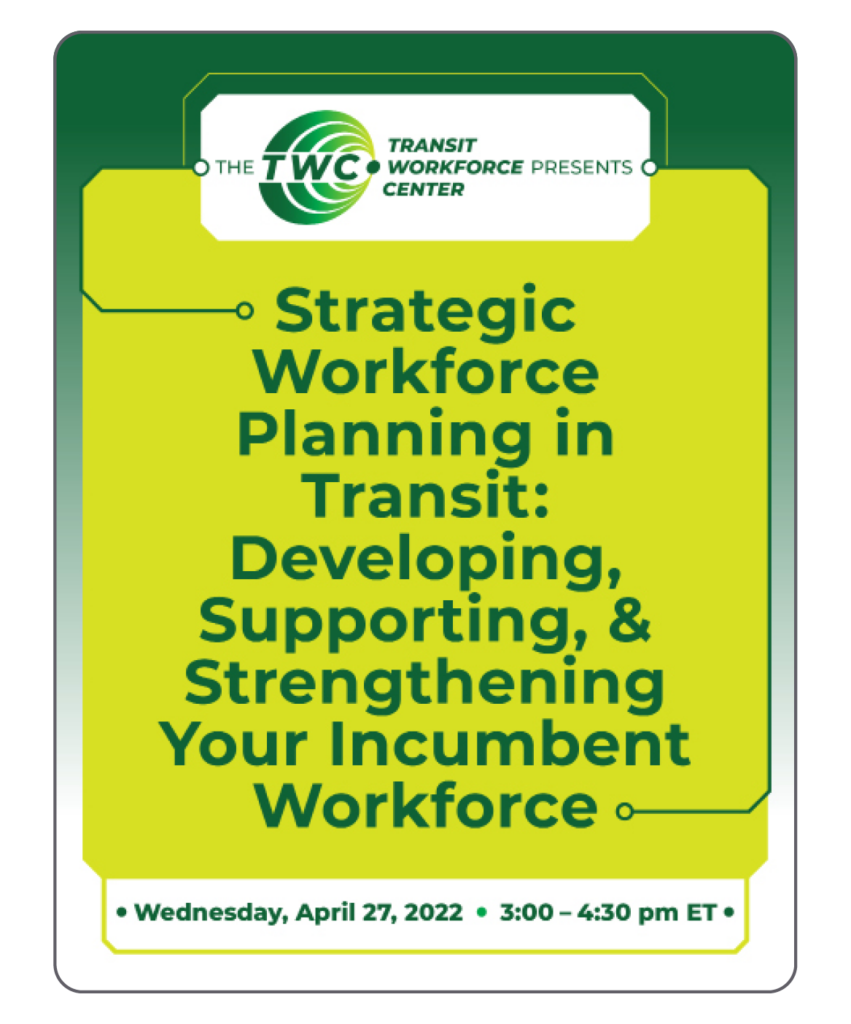
Strategic Workforce Planning in Transit: Developing, Supporting, and Strengthening Your Incumbent Workforce
This webinar, presented on April 27, 2022, explores important considerations and best practices for creating strong strategic workforce development plans.
FTA Administrator Nuria Fernandez provided opening remarks, followed by insightful workforce development guidance and case examples from leading, experienced, and insightful presentations from IndyGo (Indianapolis IN), ATU International and Local 558, SporTran (Shreveport LA), TWU Local 100- NYCTA Training and Upgrading Fund (NYC), SEPTA (Philadelphia PA), and ProgressWorx.
It is the first in a series of TWC webinars on Strategic Workforce Planning.
Transit Workforce Center
April 2022
TOPICS: Apprenticeship , Career Pathways , Labor-Management Partnerships , Retention
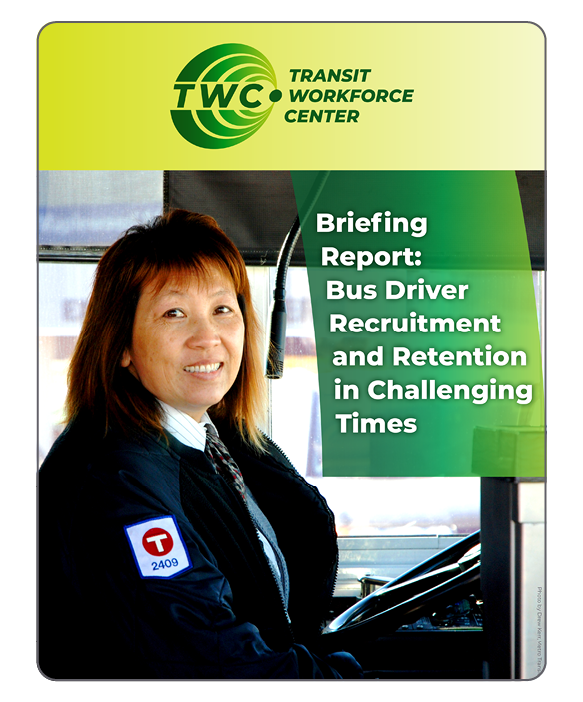
Bus Driver Recruitment and Retention in Challenging Times
Transit Workforce Center
April 2022
TOPICS: Hiring and Recruitment , Retention , Safety and Health , Workforce Shortage
While the U.S. public transportation industry has long had a significant bus operator shortage, it has been magnified by the COVID-19 pandemic. COVID-19 has not only exacerbated existing trends, but also introduced new labor market dynamics. This brief describes overall workforce trends for bus operators, obstacles to recruitment, and challenges for workforce retention, to help inform efforts to recruit more drivers nationwide.
Overall workforce trends
According to 2020 Bureau of Labor Statistics (BLS) data, there are 162,850 bus operators nationally. Federal government projections indicate strong growth for bus operators; BLS estimates the occupation will grow “much faster than average (15 percent or higher).”[1] To keep up with growth and make up for retirements and turnover, the industry will need to recruit scores of new workers. BLS reported an annual average of 24,600 projected bus operator job openings for 2020 to 2030.[2]
According to BLS, annual wages for the occupation were $45,900 in 2020, which was higher than the national median of $41,950.[3] Despite having a reputation for paying relatively well and providing robust benefits,[4], [5] transit agencies have faced significant challenges to recruit workers in sufficient numbers to meet the growing demand. The rise of COVID and the omicron variant have created a “labor crisis” in transit, leading Houston Metro to offer bonuses of $4,000 for new drivers, and NYC to try to lure workers out of retirement, for example.[6]
Demographic challenges
One major demographic challenge contributing to the current operator shortage is the disproportionately older bus operator workforce. As Figure 1 on the next page shows, the median age of U.S. workers was 42.2 years in 2021, and 42.8 years in transportation and warehousing. For the bus service and urban transit industry, it was 52.7, which is substantially higher than both the nationwide median age for workers and the median age for other subsectors within transportation and warehousing, such as air or rail transportation.[7] The higher median age of urban transit workers is largely attributable to the older age of bus drivers (median 53.3 years)[8], who constitute 60 percent of the workforce[9]. A large percentage of workers are expected to retire in the coming years.[10], [11]
COVID-related health and safety issues
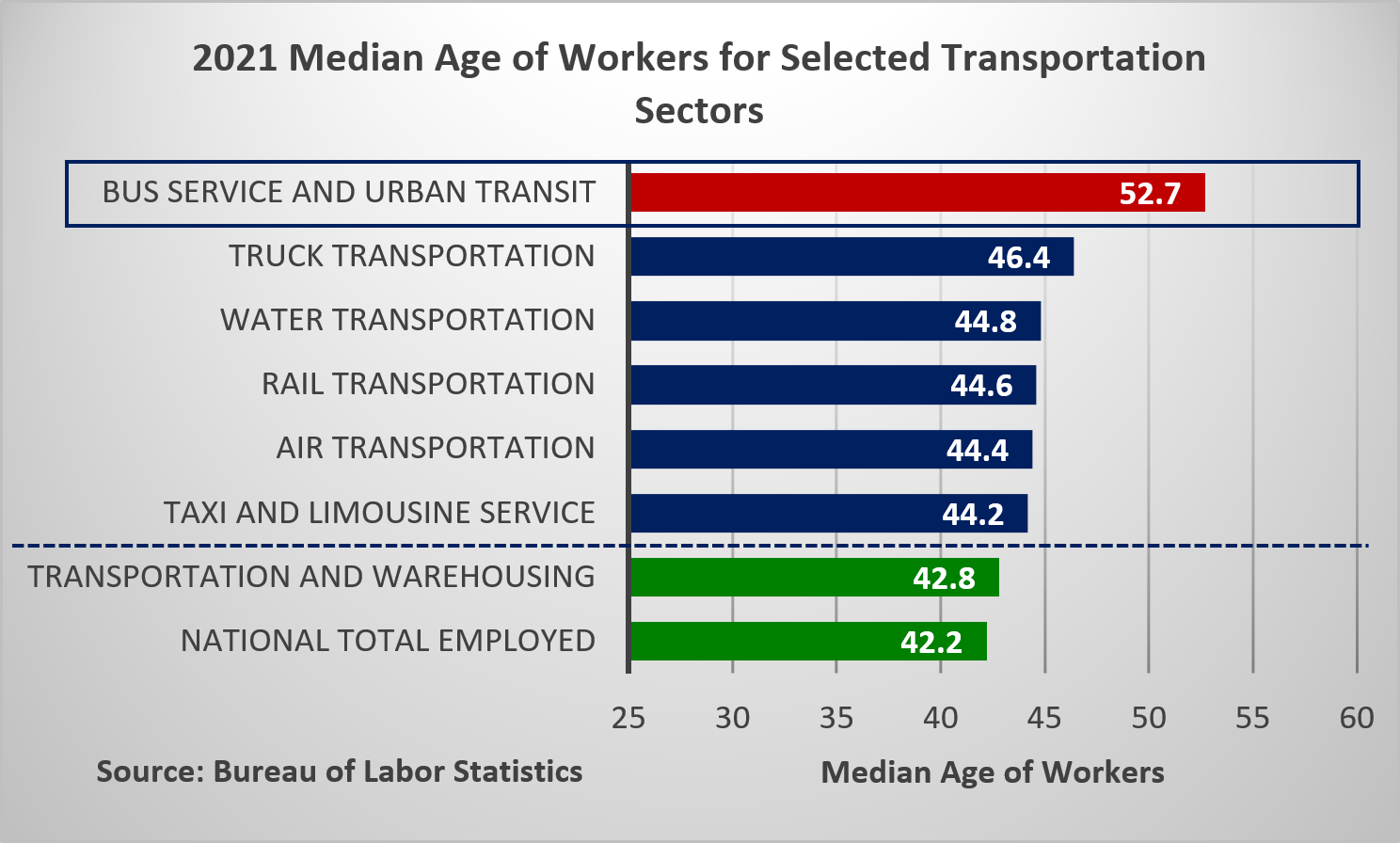
Figure 1. 2021 Median Age of Workers for Selected Transportation Sectors
As frontline workers, bus operators risk exposure to COVID-19, and serious health consequences, even death. For example, in New York City, 136 MTA operators died around the start of the pandemic.[12] As of December 2021, more than 2,000 COVID cases have been reported among WMATA workers since the pandemic began; seven of the workers died. According to CTAA, some member agencies have experienced as many as 40 percent of their operators absent from work due to sickness.[13] COVID-related factors have resulted in bus operator shortages and service cuts,[14] a trend which has occurred in transit systems nationwide. In addition, some drivers have quit due to fears about the virus or been terminated due to failure to comply with vaccination and testing policies.[15]
Pre-existing labor market dynamics
The pandemic has also exacerbated existing workforce challenges, such as competition for pay. Stakeholders interviewed for a GAO study reported that other industries which hire workers with similar levels of education, including fast food, may attract workers instead of transit, especially in rural areas or areas with low unemployment.[16] When the economy is strong, construction also tends to attract workers who might otherwise work in transit. Furthermore, some workers leave the transit industry once they have earned their CDL.[17]
CDL and new requirements
Transit bus drivers are generally required to hold Class B Commercial Drivers’ Licenses and passenger (P) endorsements. Due to the high cost of self-funding CDL training, employer-sponsored training programs in which costs are covered, such as those run by transit agencies, are an attractive option for job seekers. However, the potential exists for trainees to pursue employment in commercial driving or another sector after completing a transit-oriented training program.[18] This dynamic is particularly challenging given concurrent shortages of truck and school bus drivers.[19]
Individuals are required to hold a standard driver’s license to qualify for a commercial learners’ permit, which in turn is needed to pursue CDL training.[20] These requirements may impact recruitment of young people, as rates of driver’s license attainment for 18–24 year-olds have decreased slightly in recent decades and may be lower during recessionary periods and among minority populations and residents of cities.[21]
Regulatory changes impacting entry level driver training (ELDT) may also affect agencies’ ability to fill positions. As of February 7, 2022, the FMCSA has started enforcing universal training standards for entry level driver training and maintaining a database of qualified providers (the Training Provider Registry).[22] Professional organizations representing transit agencies such as APTA and CTAA have expressed concern about these additional regulatory requirements. Agency contacts have also identified challenges related to requirements around license renewal, medical fitness testing, the availability of training during the pandemic and delays with local DMVs processing CDL application due to pandemic staff shortages. FMCSA has granted waivers around certain other CDL requirements during the pandemic, and recently announced a grant to support state capacity for CDL licensing, though the emphasis appears to be on commercial trucking. [23], [24]
Assaults against drivers
Driver safety has been a persistent problem. Assaults against drivers and altercations with passengers have been well-publicized in communities that transit serves.[25], [26]A 2015 Monthly Labor Review article identified violence as a key challenge facing drivers, with examples including a 2012 attack with rocks in Washington, DC and a 2013 shooting in Seattle.[27] More recently, drivers have reported increased stress during the pandemic and face threats including violence related to passenger non-compliance with mask mandates, among other issues. Such incidents have deterred potential applicants from considering a transit driving career and contributed to early retirements.[28]
Lack of interest from younger generations
Younger workers have different expectations about the workplace, which has made it challenging for agencies to recruit them. Younger workers tend to value flexible schedules, yet operators must often work on holidays and weekends, especially when they first start in the field. New hires in general may not find this attractive.[29]
Advances in technology
Advances in technology present challenges to recruitment and retention. The rise of automation and apps requires drivers to possess technical knowledge to operate newer buses and assist customers; this means there is a relatively small pool of qualified workers. Additional and new types of training are needed for both incumbent and new workers to adapt. Furthermore, drivers report feeling stress from being monitored more often by cameras and tracking technology.[30], [31]
Stress and burn-out
Finally, being a bus operator is a highly stressful occupation. Drivers must operate large vehicles on congested city streets on tight time schedules.[32] They work relatively long hours with infrequent breaks.[33] As discussed earlier, technological advances have contributed to worker stress as well. Operators also experience burn-out due to the stress of dealing with passengers, who may ignore COVID safety rules,[34] or be unruly or violent.
Conclusion
Bus operators have been in short supply for years, and this problem has been magnified by COVID-19. An aging workforce and labor exits related to COVID have largely contributed to the shortage. Top obstacles to recruitment and retention include pandemic-related health and safety issues, pre-existing labor market dynamics including competition over pay, CDL requirements, assaults against drivers, and lack of interest from younger generations. Other contributing factors include advances in technology, perceptions of inflexibility, and stress. To address these workforce recruitment and retention issues for bus operators, key stakeholders from management and labor should keep these data and trends in mind.
Bus Operator Recruitment Campaign
The Transit Workforce Center (TWC) is currently developing a national campaign in coordination with the FTA, along with key labor and industry partners, to effectively address the national bus operator shortage. The TWC is preparing to create a toolkit of materials designed to be adapted by agencies and labor union locals that will consist of templates for commercial scripts, postcard mailers, exhibit banners, talking points for public meetings, social media postings, informational video scripts, and letters of introduction. If any organization has existing models that should be incorporated into these plans, please contact Senior Communications Specialist David Stephen at dstephen@transportcenter.org.
Contributing Authors: Benjamin Kreider (Consultant); Xinge Wang; Douglas Nevins
[1] Bureau of Labor Statistics. Occupational Employment and Wages, May 2020. 53-3052 Bus Drivers, Transit and Intercity. https://www.bls.gov/oes/current/oes533052.htm
[2] Bureau of Labor Statistics. Table 1.7: Occupational projections, 2020–30, and worker characteristics, 2020. https://www.bls.gov/emp/tables/occupational-projections-and-characteristics.htm.
[3] Summary Report for: 53-3052.00 – Bus Drivers, Transit and Intercity. O*Net Online. https://www.onetonline.org/link/summary/53-3052.00?redir=53-3021.00.
[4] Shared-Use Mobility Center. “Case Study: Managing the Labor Shortage at Transit Agencies.” November 5, 2021. https://learn.sharedusemobilitycenter.org/casestudy/managing-the-labor-shortage-at-transit-agencies/.
[5] Laura Bliss. “There’s a Bus Driver Shortage. And No Wonder.” Bloomberg City Lab. June 28, 2018. https://www.bloomberg.com/news/articles/2018-06-28/there-s-a-bus-driver-shortage-and-no-wonder.
[6] Eli Rosenberg. “Labor shortages are hampering public transportation systems, challenging the recovery of city life.” Washington Post. December 28, 2021. https://www.washingtonpost.com/business/2021/12/28/worker-shortages-public-transportation/.
[7]Bureau of Labor Statistics. Table18b: Employed persons by detailed industry and age. https://www.bls.gov/cps/cpsaat18b.htm.
[8] Bureau of Labor Statistics, Table 11b: Employed persons by detailed occupation and age, 2020. https://www.bls.gov/cps/cpsaat11b.htm.
[9] Bureau of Labor Statistics, National Employment Matrix. https://data.bls.gov/projections/nationalMatrix?queryParams=485100&ioType=i.
[10] Jack Clark. Testimony before the House Transportation Infrastructure Subcommittee on Highways. March 13, 2019. https://transportation.house.gov/imo/media/doc/Testimony-%20Clark.pdf.
[11] Robert Puentes et al. “Practitioner’s Guide to Bus Operator Workforce Management.” Transportation Research Board of The National Academies of Sciences, Engineering, and Medicine. November, 2021. Unpublished interim report.
[12] Benito Perez. “After COVID, who’s driving the bus?” Transportation For America. Nov 2, 2021. https://t4america.org/2021/11/02/bus-operator-shortage/.
[13] Justin George. “Omicron deepens bus driver shortage, frustrating passengers as transit agencies pare back service.” Washington Post. January 15, 2022. https://www.washingtonpost.com/transportation/2022/01/15/covid-omicron-bus-transit/
[14] Justin George. “Bus operator shortage due to covid prompts Metro to reduce bus service.” Washington Post. December 23, 2021. https://www.washingtonpost.com/transportation/2021/12/23/dc-metro-bus-shortage-covid/.
[15] “MARTA Making Temporary Service Modifications to Address Bus Operator Shortage.” Metro Magazine. https://www.metro-magazine.com/10155945/marta-making-temporary-service-modifications-to-address-bus-operator-shortage. November 12, 2021.
[16] US Government Accountability Office. “Transit Workforce Development – Improved Strategic Planning Practices Could Enhance FTA Efforts.” GAO-19-2090. March 2019. https://www.gao.gov/assets/700/697562.pdf. P. 15.
[17] Puentes et al., 2021.
[18] Puentes et al., 2021. P. 37.
[19] Bliss, 2021.
[20] FMCSA. “Commercial Driver’s License: States.” December, 2019. https://www.fmcsa.dot.gov/registration/commercial-drivers-license/states
[21] Tefft, B. C. & Foss, R. D. “Prevalence and Timing of Driver Licensing Among Young Adults, United States, 2019.” October, 2019. AAA Foundation for Traffic Safety. https://aaafoundation.org/wp-content/uploads/2019/10/19-0500_AAAFTS_Teen-Driver-Safety-Week-Brief_r1.pdf
[22] FMCSA. “Commercial Driver’s License: Entry-Level Driver Training (ELDT). February, 2022. https://www.fmcsa.dot.gov/registration/commercial-drivers-license/entry-level-driver-training-eldt
[23] FMCSA. “Waiver in Response to the COVID-19 National Emergency –For States, CDL Holders, CLP Holders, and Interstate Drivers.” December 15, 2020. https://www.fmcsa.dot.gov/emergency/waiver-response-covid-19-national-emergency-states-cdl-holders-clp-holders-and-1
[24] U.S. DOT. “DOT, DOL Announce Expansion of Trucking Apprenticeships, New Truck Driver Boards and Studies to Improve the Working Conditions of Truck Drivers.” January 13, 2022. https://www.transportation.gov/briefing-room/dot-dol-announce-expansion-trucking-apprenticeships-new-truck-driver-boards-and
[25] Puentes et al., 2021. P. 36.
[26] Luz Lazo. “Citing attacks directed at buses, Metro weighs service cuts in Anacostia.” Washington Post.
[27] Bureau of Labor Statistics. “When the wheels on the bus stop going round and round: occupational injuries, illnesses, and fatalities in public transportation.” 2015. https://www.bls.gov/opub/mlr/2015/article/when-the-wheels-on-the-bus-stop-going-round-and-round.htm#_edn1..
[28] Chris Teale. “Transit workers face growing rate of assaults: ‘There’s not much we can do.’” Smart Cities Dive. February 17, 2021. https://www.smartcitiesdive.com/news/transit-workers-face-growing-rate-of-assaults-theres-not-much-we-can-do/594959/
[29] Puentes et al., 2021.
[30] Puentes et al., 2021.
[31] GAO, p. 16.
[32] Bliss, 2018.
[33] GAO, 2019; Puentes et al., p. 14.
[34] Justin George. “Omicron deepens bus driver shortage, frustrating passengers as transit agencies pare back service.” Washington Post. January 15, 2022. https://www.washingtonpost.com/transportation/2022/01/15/covid-omicron-bus-transit/.
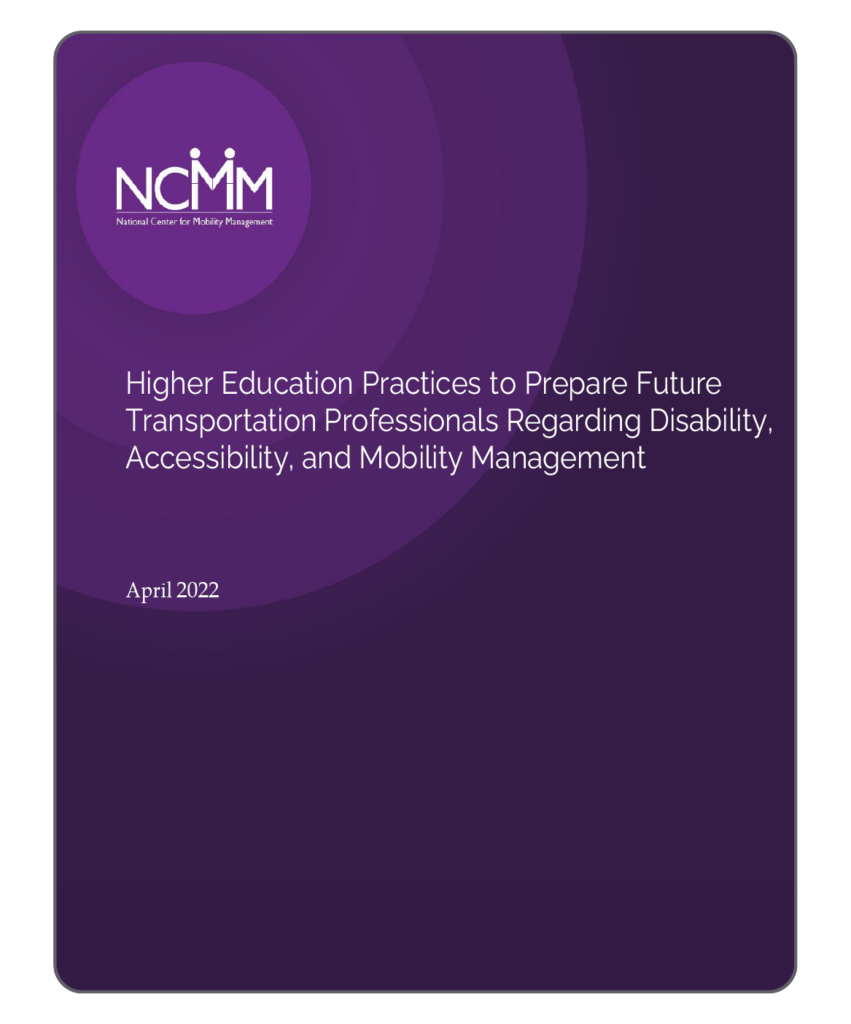
Higher Education Practices to Prepare Future Transportation Professionals Regarding Disability, Accessibility, and Mobility Management
This National Center for Mobility Management (NCMM) Information Brief provides the results of a NCMM study regarding mobility management, disability, and accessibility content in higher education preparation programs. This brief offers recommendations regarding how to integrate such content, as well as information on the recruitment and retention of individuals with disabilities in the transportation industry.
Please click the link below to view NCMM’s Mobility Management in Practice Series; this brief is listed among several 2022 publications.
National Center for Mobility Management (NCMM)
April 2022
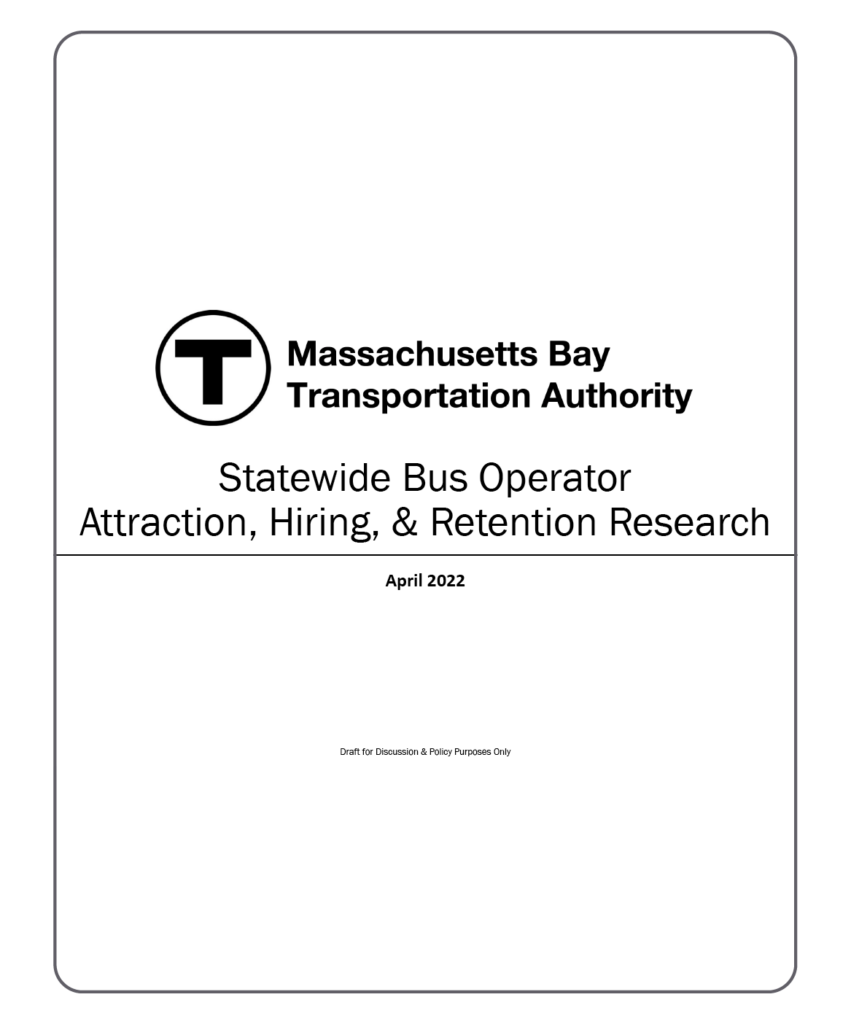
Statewide Bus Operator Attraction, Hiring, & Retention Research
These slides were used in a presentation outlining research conducted to better understand the shape and scale of the bus operator shortage in Massachusetts public transit and the adjustments agencies are making to confront these challenges.
Massachusetts Bay Transportation Authority
April 2022
TOPICS: Hiring and Recruitment , Retention , Workforce Shortage
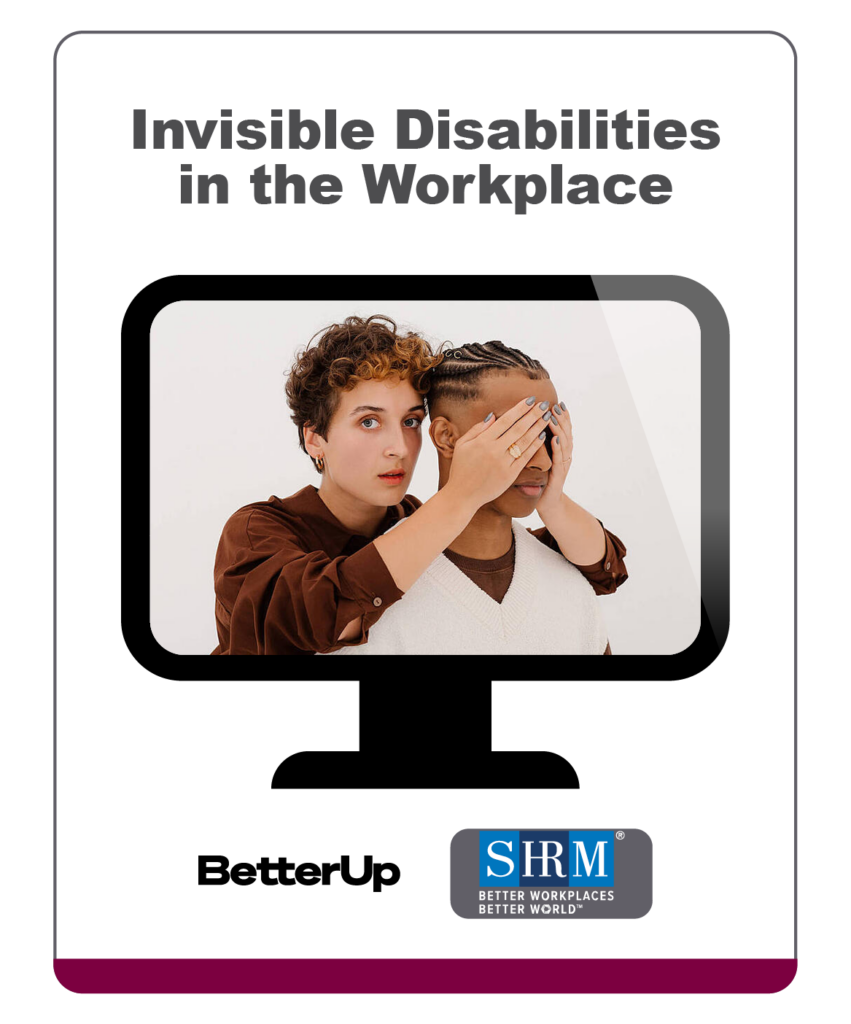
Invisible Disabilities in the Workplace
These two resources provide insight for employers into what “invisible” or “hidden” disabilities are, how to provide opportunities for employees to voluntarily disclose them, and how to support individuals with such disabilities to be successful in the workplace.
BetterUp; SHRM
February 2022
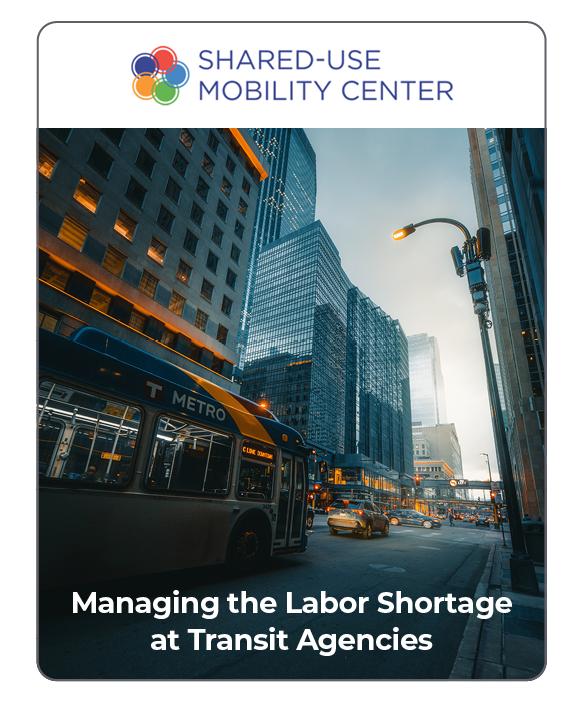
Managing the Labor Shortage at Transit Agencies
This article examines labor shortages in the public transit industry. It focuses on the following points:
- Transit agencies across the United States are experiencing a significant shortage in labor, that the COVID-19 pandemic has worsened. This shortage is negatively impacting the services they provide to the public.
- Employees at transit agencies have a significantly higher median age than employees in other industries.
- Transit agencies should use data and information to consider recruiting and retaining employees for the long term.
Shared-Use Mobility Center
November 2021
TOPICS: Hiring and Recruitment , Retention , Workforce Shortage
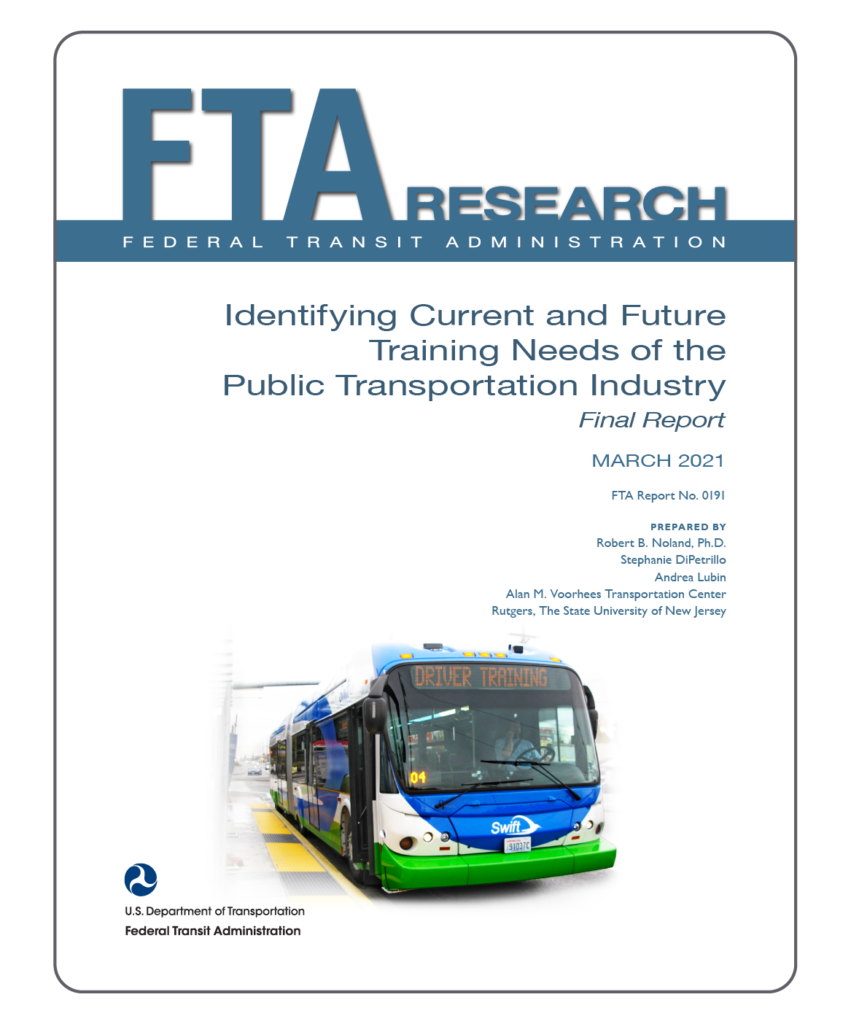
Identifying Current and Future Training Needs of the Public Transportation Industry
This report documents a study commissioned by the National Transit Institute (NTI) as part of its work to address training needs. The study investigates skills gaps among the workforce of the U.S. public transportation industry, identifies strategies to address those gaps, and explores approaches to more successfully recruit and retain the full spectrum of the transit workforce, from frontline to technical to professional staff.
Federal Transit Administration; National Transit Institute
June 2021
TOPICS: Hiring and Recruitment , Policy and Planning , Retention
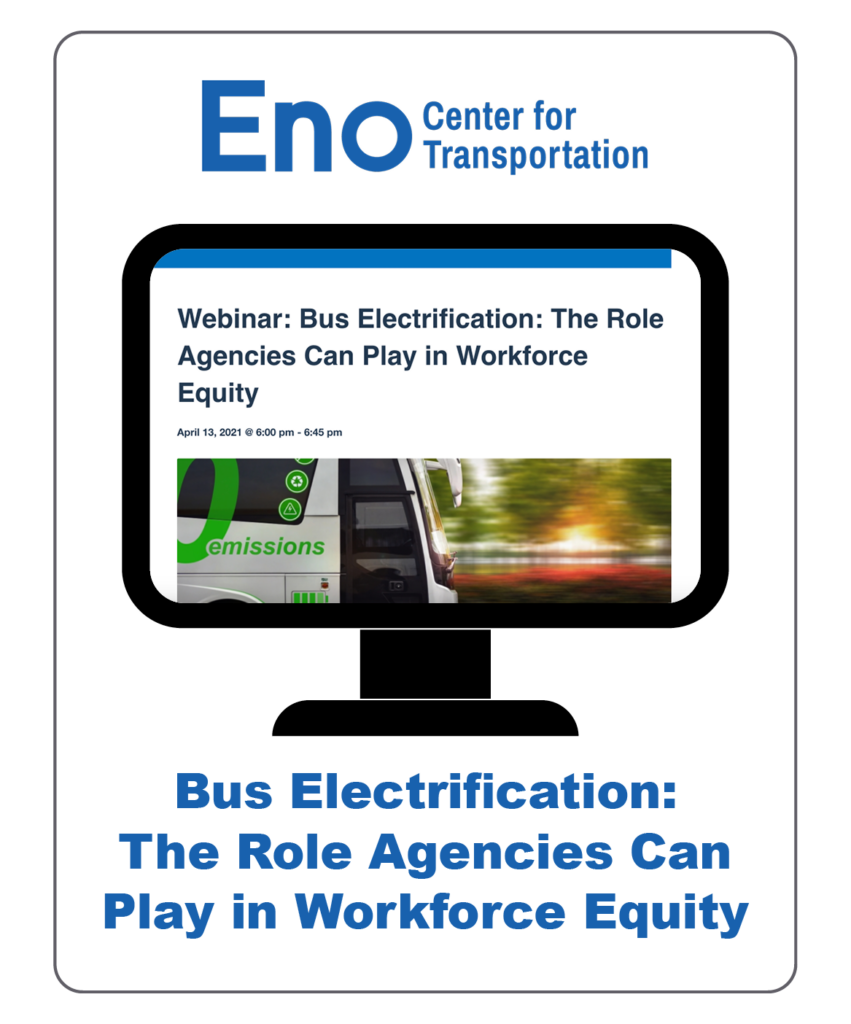
Bus Electrification: The Role Agencies Can Play in Workforce Equity
In this webinar, speakers discuss the issues of procurement, manufacturing, job creation, and job equity associated with fleet electrification.
Eno Center for Transportation
April 2021
TOPICS: Policy and Planning , Procurement , Retention , Zero Emission Buses
Speakers:
- Christy Veeder, PhD, National Program Director, Jobs to Move America
- Brianne Eby, Senior Policy Analyst, Eno Center for Transportation
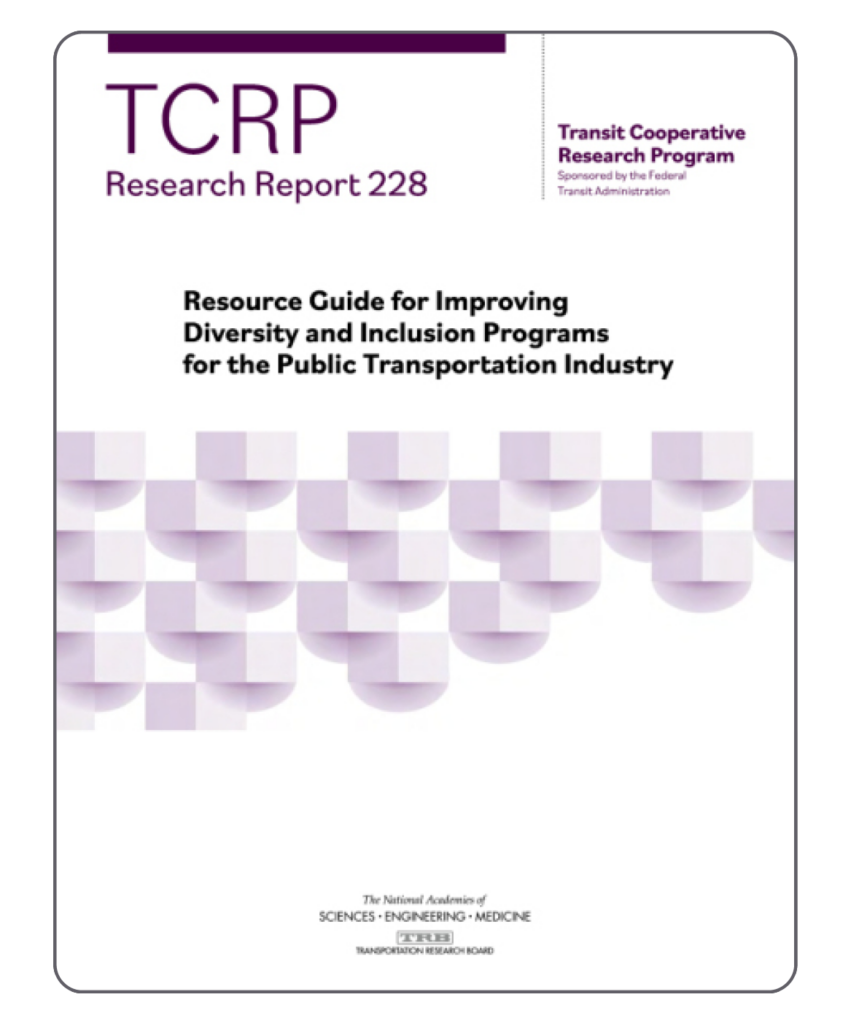
Resource Guide for Improving Diversity and Inclusion Programs for the Public Transportation Industry
This TCRP Research Report 228 examines industry diversity programs, including how inclusion has been incorporated, and what policies, plans, and practices have been successfully implemented.
Transit Cooperative Research Program
January 2021
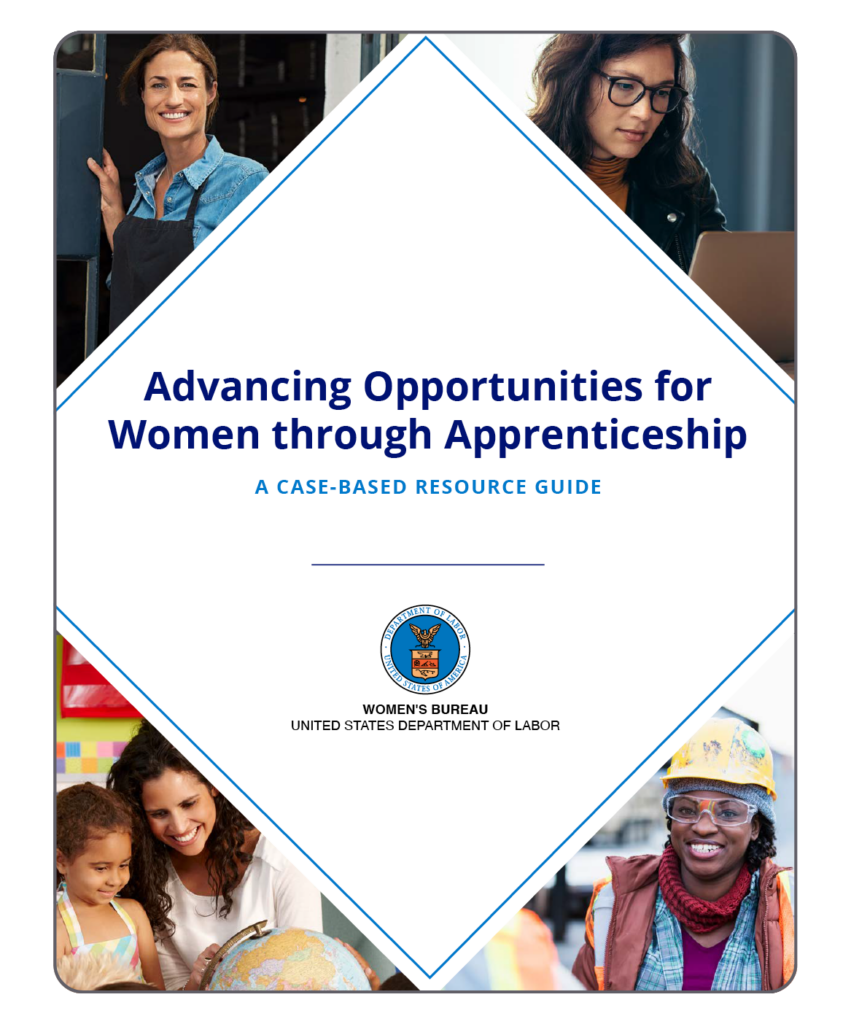
Advancing Opportunities for Women through Apprenticeship: A Case-Based Resource Guide
The Advancing Opportunities for Women through Apprenticeship case-based resource guide provides a framework for meaningful expansion of apprenticeship programs for women. The guide includes case studies on four high-quality, women-inclusive pre-apprenticeship and apprenticeship programs in a range of industry sectors.
Department of Labor
The case studies were developed through on-site visits to the program locations; interviews with program staff, partners, and current and former participants; and a review of program materials and data. They provide information and insights related to partnership development, program design, and outcomes that outline how pre-apprenticeship and apprenticeship programs can help women access family-sustaining jobs and quality career pathways. The guide identifies common strategies across the four programs to help others learn how to create programs that successfully open pathways to in-demand jobs for women through apprenticeships.
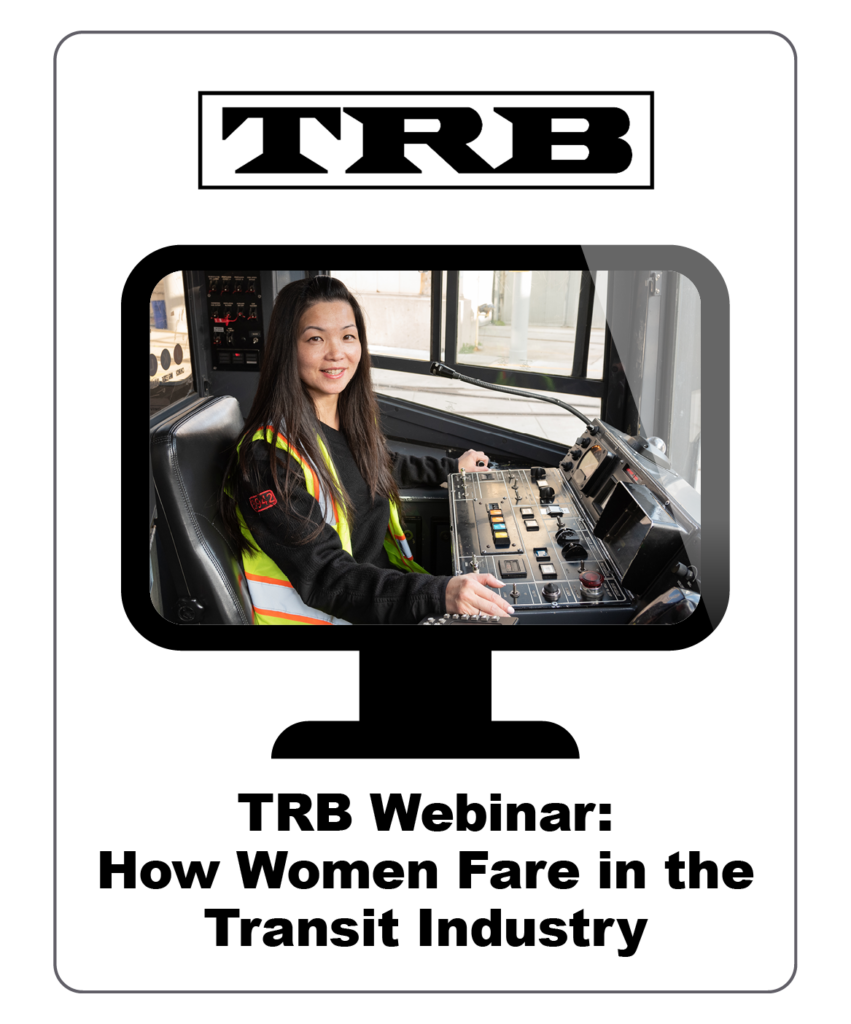
How Women Fare in the Transit Industry
This webinar provides an overview of the barriers and solutions to including more women in the transit industry. Panelists discuss strategies to support women in transit and share examples of transit agencies that have effectively implemented programs to attract, retain, and advance women in the industry.
Transportation Research Board
September 2020
The webinar draws on research from TCRP Synthesis 147: Attracting, Retaining, and Advancing Women in Transit.
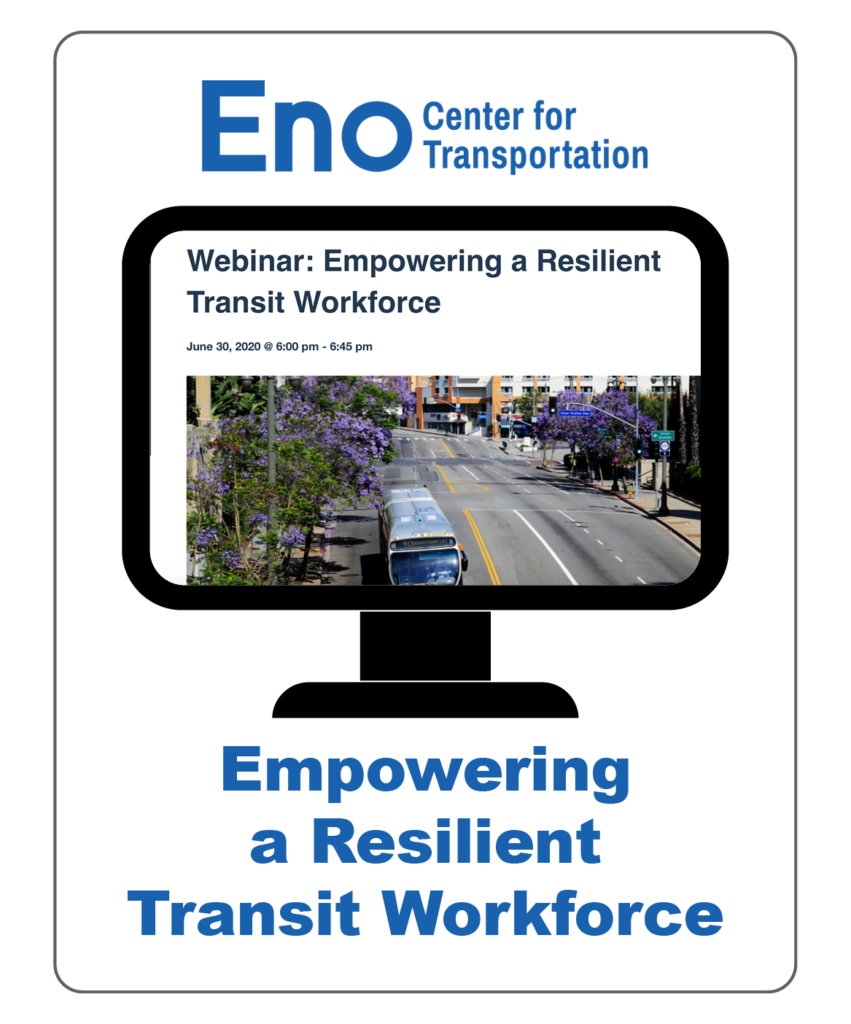
Empowering a Resilient Transit Workforce
This webinar identifies critical labor market benchmarks and addresses ways to cultivate a more resilient and empowered transit workforce, particularly in the post-COVID world. The speakers delve into resiliency challenges and education and training solutions.
Eno Center of Transportation
June 2020
TOPICS: Hiring and Recruitment , Retention , Workforce Shortage
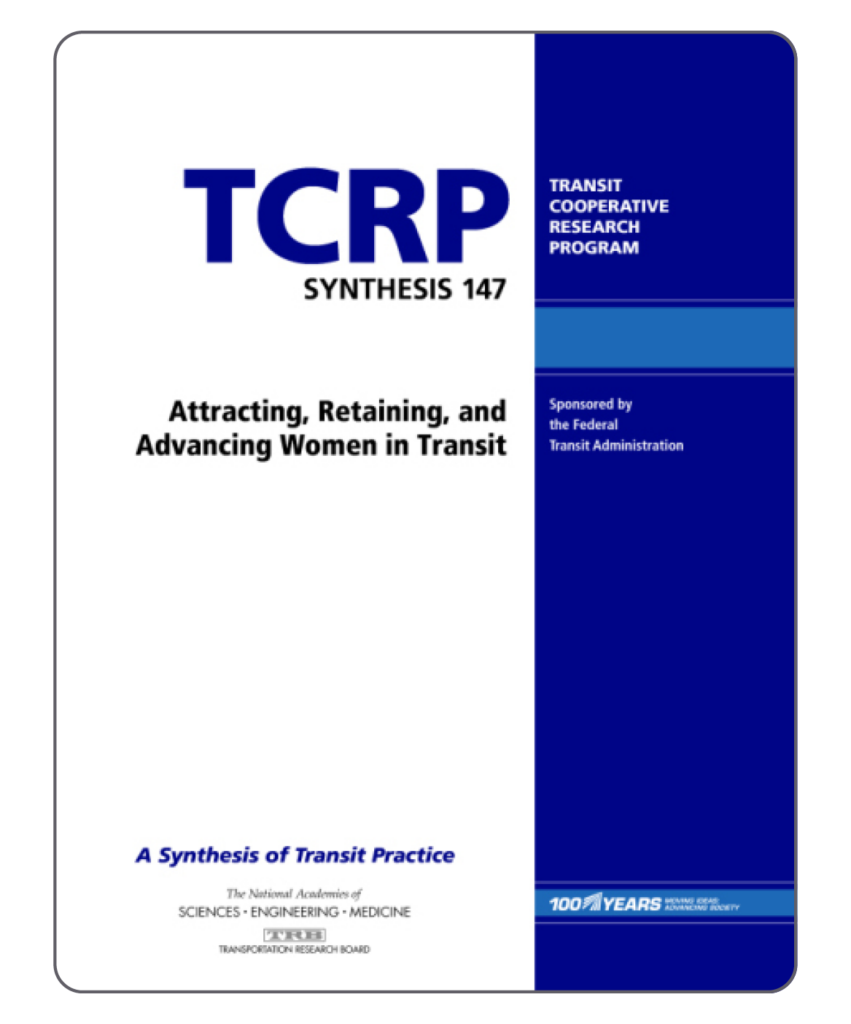
Attracting, Retaining, and Advancing Women in Transit
This TCRP report explores the strategies that have been deployed in transit and other related industries in order to attract, retain, and advance women in a variety of roles. It includes a survey of current representation of women, barriers faced, and diversity initiatives in the transportation industry, as well as case studies from several major transit agencies.
Transit Cooperative Research Program
January 2020
Contributor(s): National Academies of Sciences, Engineering, and Medicine; Transportation Research Board; Transit Cooperative Research Program; ICF Allison Alexander
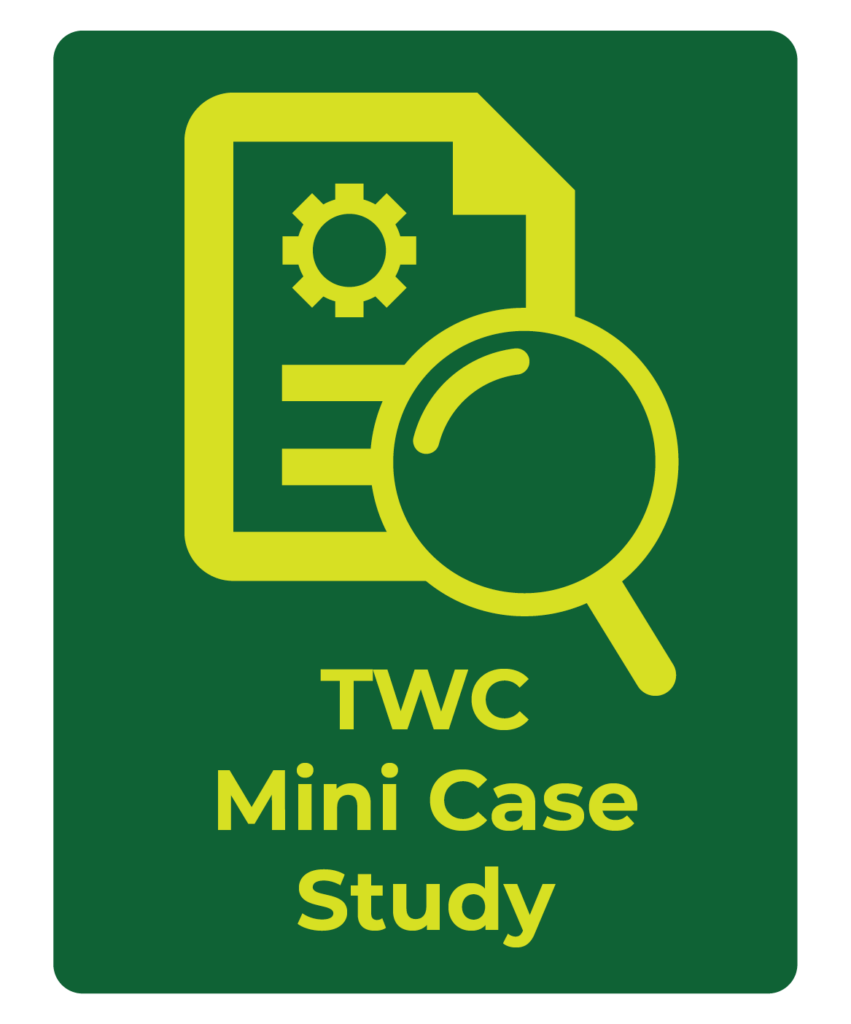
Emerging Leaders Presentation: Recruiting & Retaining Bus Operators
This slidedeck, from the APTA Emerging Leaders Program class of 2019 presentations, provides an overview of research and transit agency case studies to capture key themes on the topics of bus operator recruitment and retention.
American Public Transportation Association
December 2019
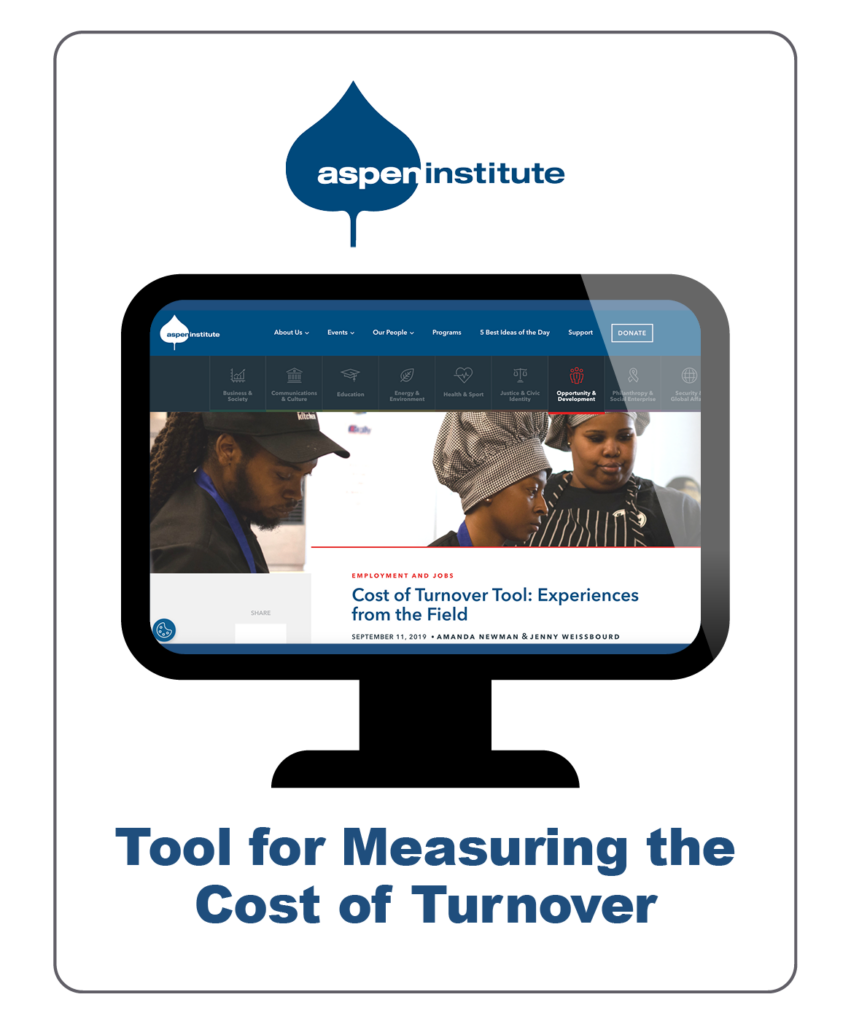
Tool for Measuring the Cost of Turnover
This Cost of Turnover Tool is a simple, “back of the envelope” calculator to help estimate how much it costs to replace staff. The tool can be useful for transit agencies looking to understand the costs of a low retention rate, or those looking to calculate the return-on-investment of mentoring or apprenticeship programs.
Aspen Institute
March 2019
TOPICS: Apprenticeship , Mentorship , Policy and Planning , Program Evaluation and ROI , Retention
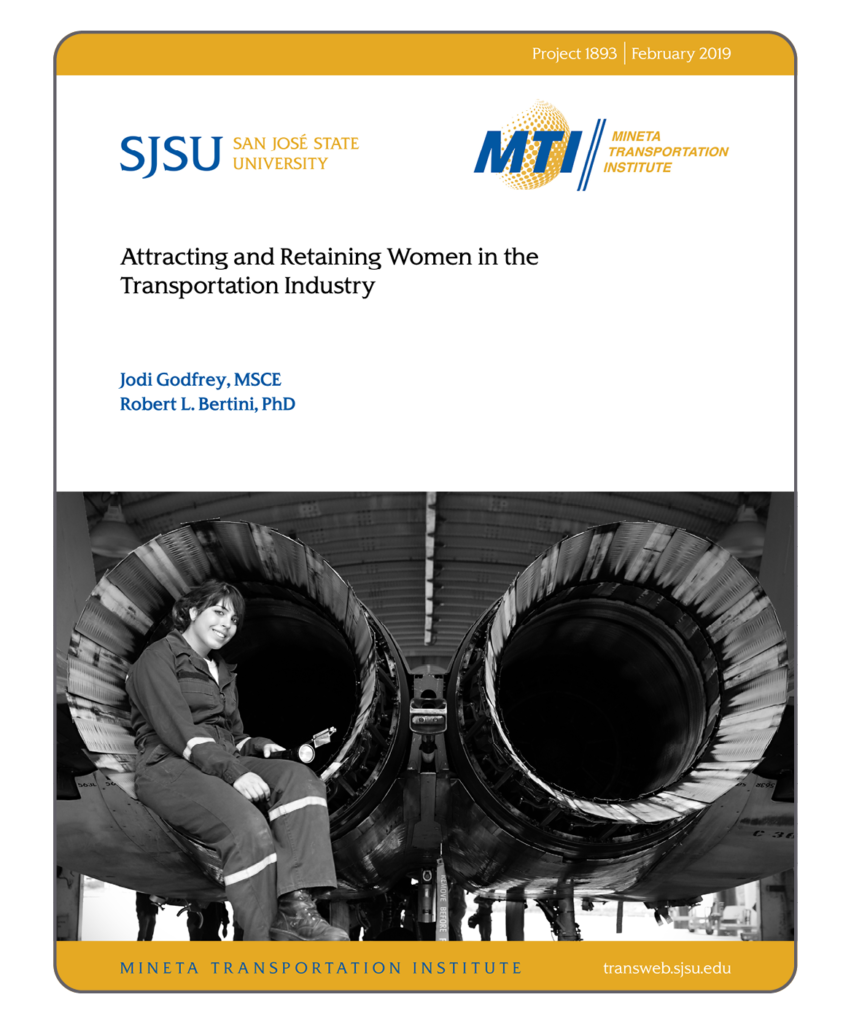
Attracting and Retaining Women in the Transportation Industry
This study synthesizes previously conducted research and identifies additional research needed to attract, promote, and retain women in the transportation industry, particularly emphasizing the importance of community-orientation and mentoring.
Mineta Transportation Institute
February 2019
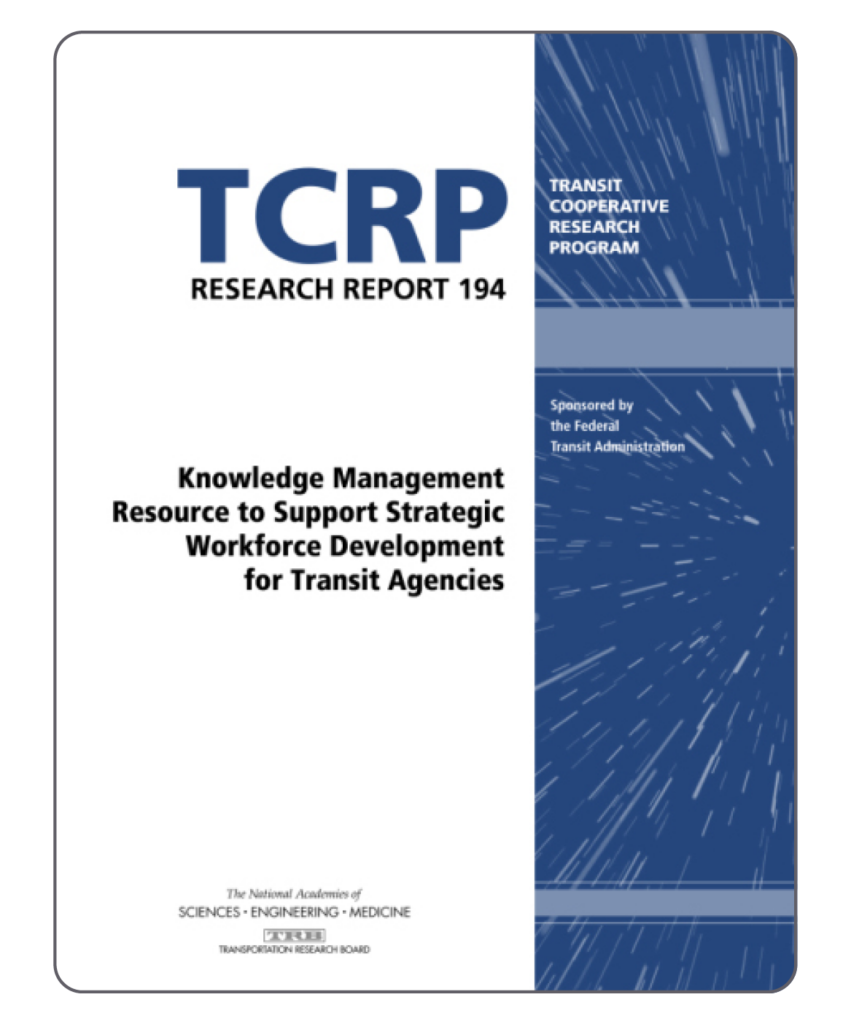
Knowledge Management Resource to Support Strategic Workforce Development for Transit Agencies
TRB’s Transit Cooperative Research Program (TCRP) Research Report 194: Knowledge Management Resource to Support Strategic Workforce Development for Transit Agencies explores the importance of knowledge management (KM), which is an organization’s process for collecting, storing, and sharing organizational information and knowledge, and provides guidance on implementing KM strategies in transit agencies. In addition, the guidance includes action plans for developing particular aspects of KM, analysis of KM strategies at several transit agencies, and a catalog of KM technology tools and resources.
Transit Cooperative Research Program (TCRP)
January 2018
TOPICS: Policy and Planning , Program Evaluation and ROI , Retention
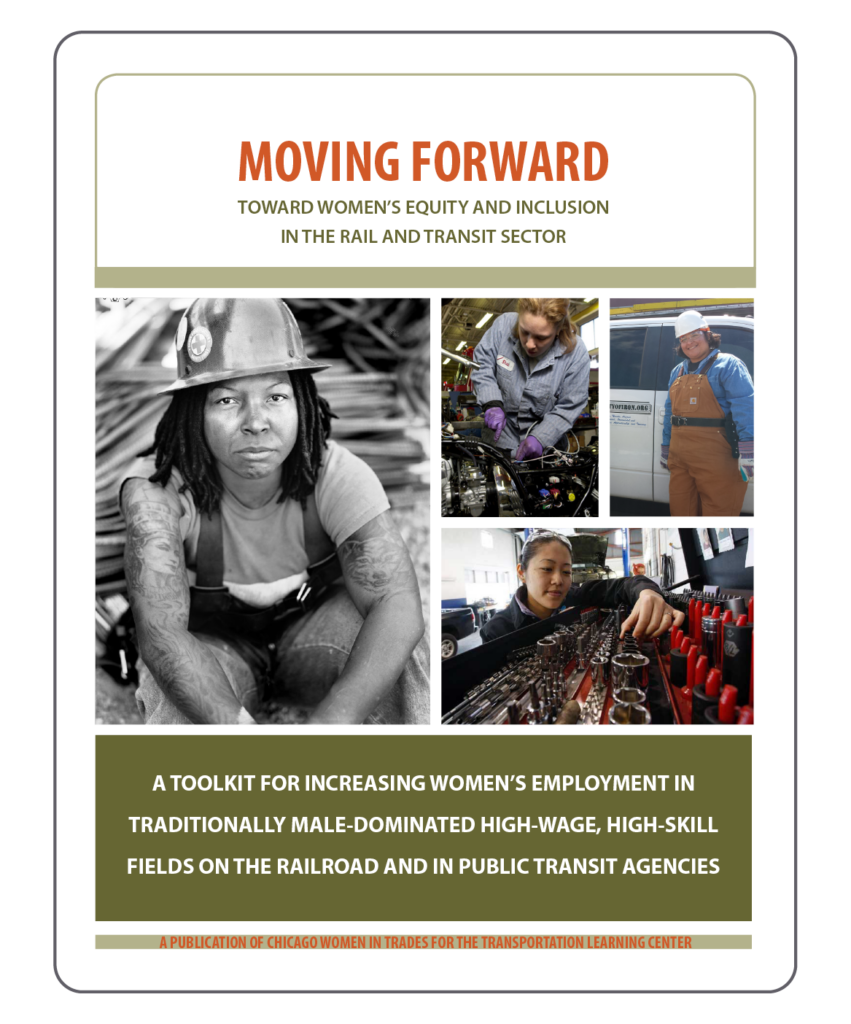
Moving Forward: Toward Women’s Equity and Inclusion in the Rail and Transit Sector
International Transportation Learning Center; Chicago Women in the Trades
July 2017
This toolkit is premised on the understanding that transit agencies have little knowledge of and tools for recruiting and assessing new female entrants to the workforce and promoting incumbent workers for skilled trade jobs in rail and transit. It also recognizes that women themselves have little information about the entry routes, requirements and benefits of jobs in these fields and without targeted and concerted effort from either the companies, agencies, unions, workforce development system, and educational institutions, most women will continue to be steered towards traditional female careers.
The resources in this toolkit will support the recruitment, training, and retention of women in nontraditional apprenticeship and jobs in the rail and transit sector. The toolkit can be used by program planners, managers, and frontline staff conducting outreach and assessment and training, to ensure that each stage of the employment process—from recruitment through retention—looks at how the workplace environment can be responsive to women of many backgrounds and how systems can be created or improved to address the barriers women face.
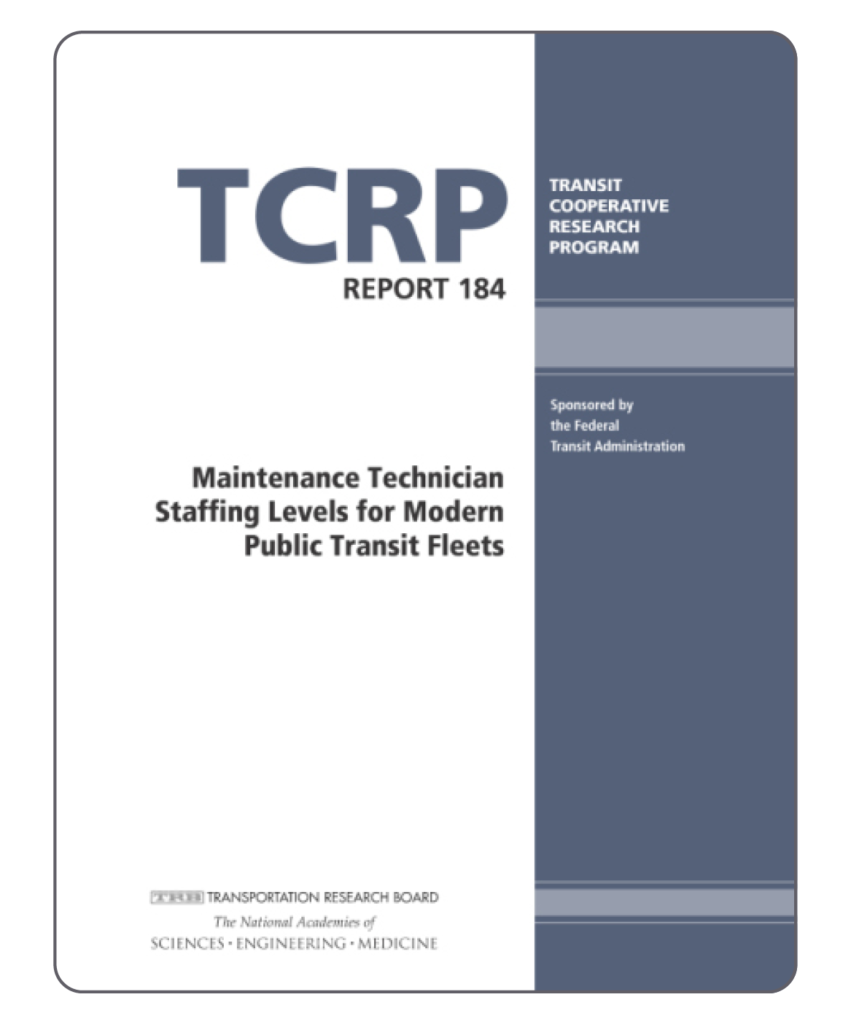
Maintenance Technician Staffing Levels for Modern Public Transit Fleets
This report identifies existing tools and practices used to determine optimum maintenance technician staffing levels and provides an analysis of variables that influence maintenance technician staffing needs. A Microsoft Excel maintenance staffing calculator and user guide is available.
Transit Cooperative Research Program
August 2016
Contributor(s): National Academies of Sciences, Engineering, and Medicine; Transportation Research Board; Transit Cooperative Research Program; Ken Mall; June Sekera; the Transportation Learning Center and Transit Resource Center
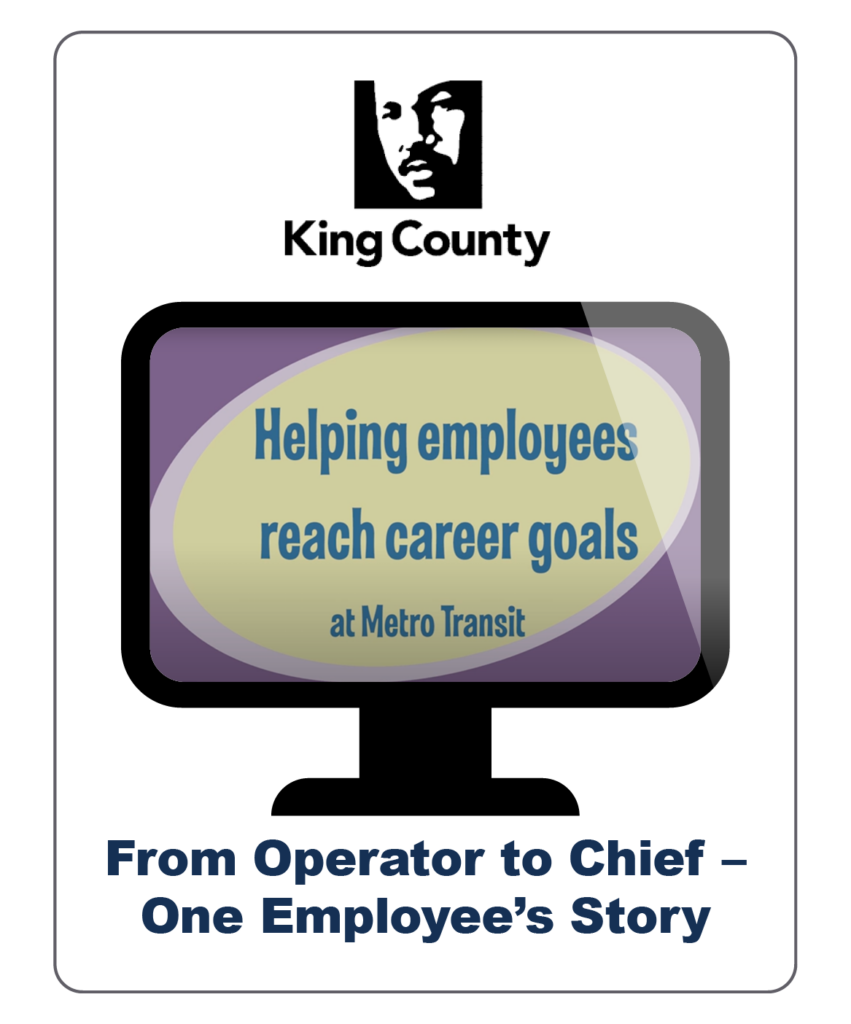
From Operator to Chief – One Employee’s Story
This video provides a description of King County DOT’s program for recruitment and advancement options for current employees, with an emphasis on diversity, along with one employees’ story about how he was supported in his journey from bus operator to Base Chief.
King County Department of Transportation
October 2015
TOPICS: Career Pathways , Hiring and Recruitment , Retention , Training
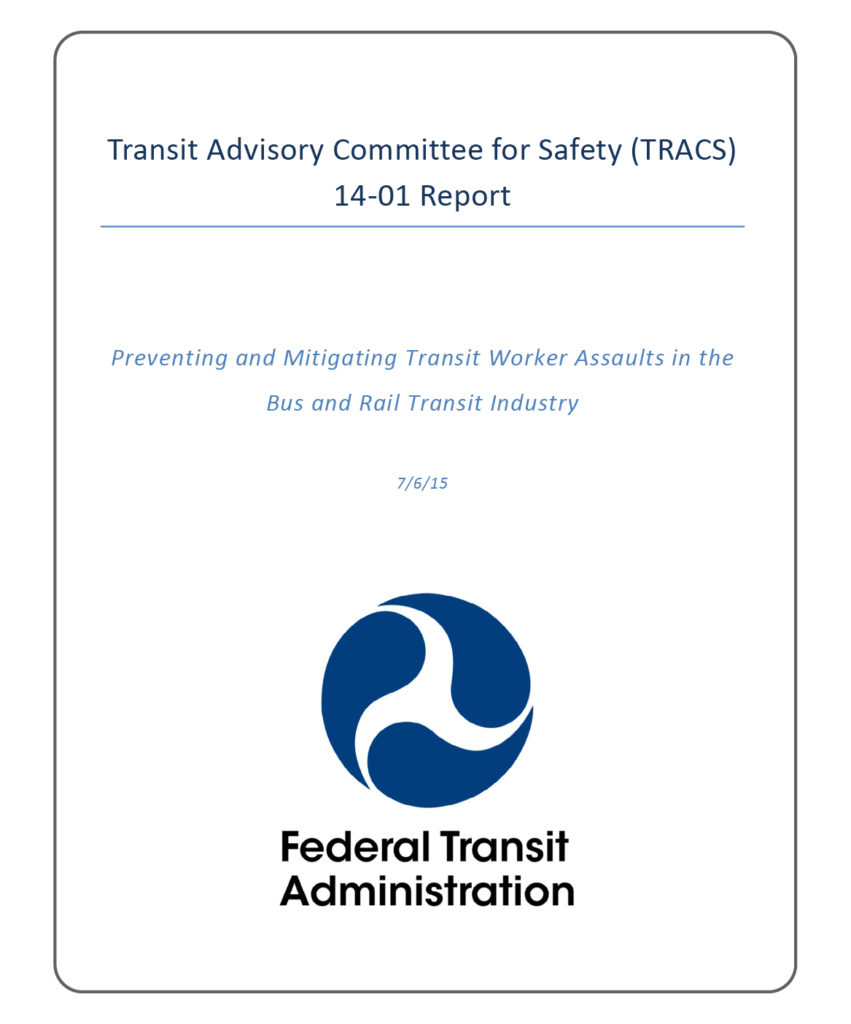
Preventing and Mitigating Transit Worker Assaults in the Bus and Rail Transit Industry
This report provides recommendations from state and local transportation agencies, labor unions, research organizations, and national transportation associations to address the elements of a safety management system (SMS) approach to preventing and mitigating transit worker assaults, including policy, risk management, safety promotion, and safety assurance.
Transit Advisory Committee for Safety
July 2015
TOPICS: Retention , Safety and Health
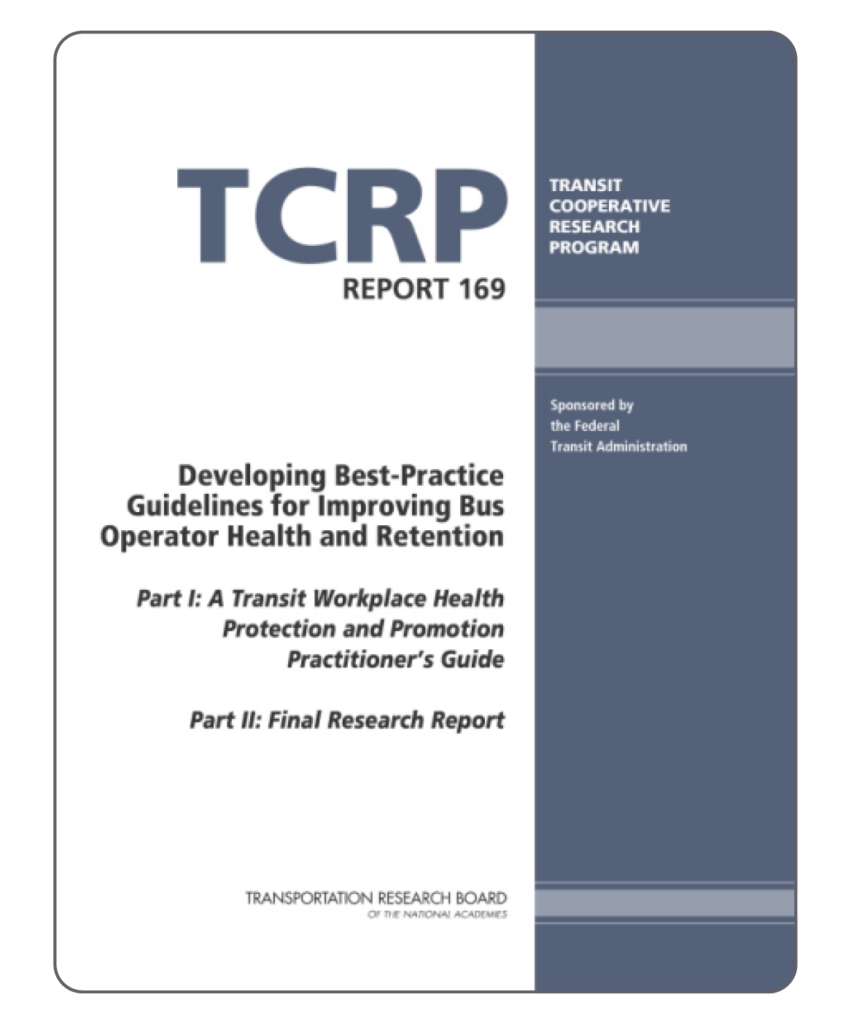
Developing Best-Practice Guidelines for Improving Bus Operator Health and Retention
This TCRP report addresses some of the health and safety issues common throughout the transit industry, and describes approaches that transit organizations in the United States and Canada have taken to address health problems faced by transit employees. The report is supplemented by a presentation, Making the Case for Transit Workplace Health Protection and Promotion, and an Excel worksheet, Transit Operator Workplace Health Protection and Promotion Planning, Evaluation, and ROI Template, that may assist transit agencies with implementing and carrying out transit-specific programs to protect the health of bus operators and other employees.
Transit Cooperative Research Program
August 2014
TOPICS: Policy and Planning , Retention , Safety and Health
Contributor(s): National Academies of Sciences, Engineering, and Medicine; Transportation Research Board; Transit Cooperative Research Program; Robin Mary Gillespie; Xinge Wang; Tia Brown
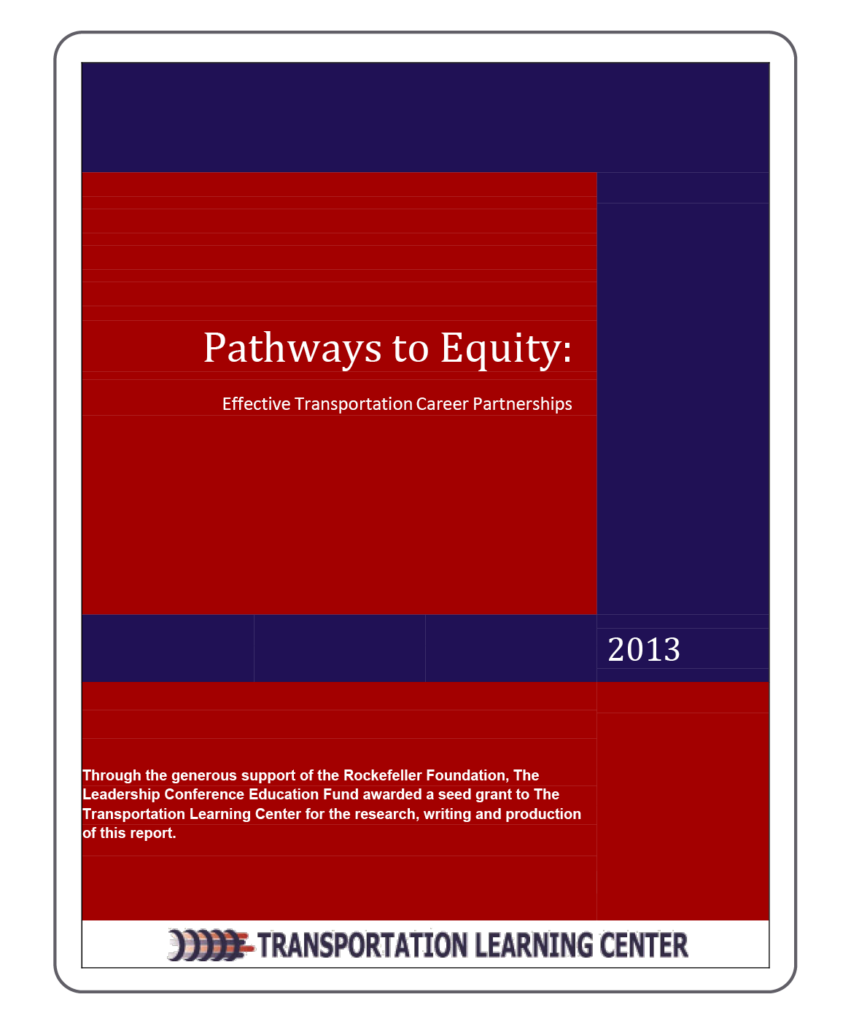
Pathways to Equity: Effective Transportation Career Partnerships
Expanding access to quality careers in transit systems and in transit capital construction has been the focus of innovative local programs around the country in recent years. This report presents case profiles of two of the most promising examples – one for youth Career Pathways into transit industry careers, and one for targeted construction hiring and training of disadvantaged workers for transit capital projects. The two local case profiles are a Project Labor Agreement in Los Angeles providing expanded access to jobs and training for public transportation capital construction and a youth Career Pathways partnership in Philadelphia linking career and technical education with future transit careers. Both of these models, if taken to scale in the transit industry, can have positive impacts, locally and nationally, for improving access to family-sustaining careers and training and for improving educational outcomes for disadvantaged groups – urban low-income and minority groups as well as women – who have previously been under-represented in these occupations.
International Transportation Learning Center
December 2013
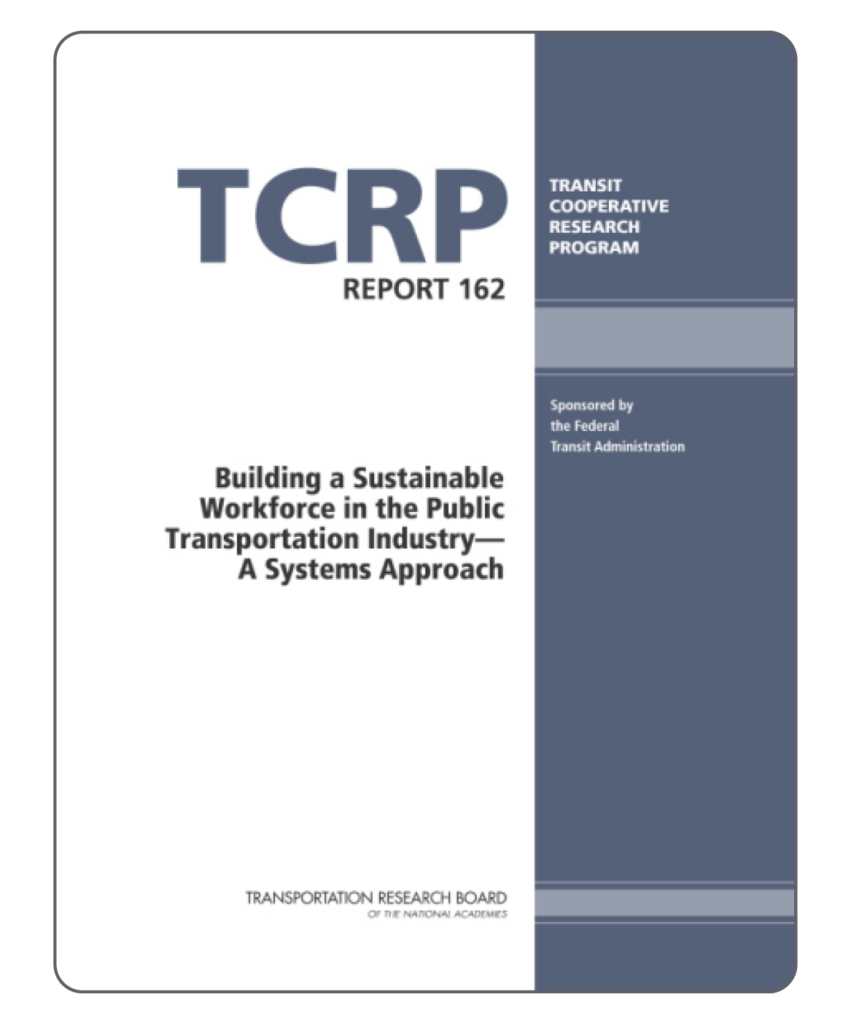
Building a Sustainable Workforce in the Public Transportation Industry—A Systems Approach
TRB’s Transit Cooperative Research Program (TCRP) Report 162: Building a Sustainable Workforce in the Public Transportation Industry—A Systems Approach provides a guidebook that addresses contemporary issues in workforce development, retention, and attraction, and public transportation image management.
The guidebook provides practical tools to transit agencies on a variety of workforce issues including workforce strategies that enhance organizational processes, performance metrics to evaluate the impact of workforce strategies, image management techniques that improve perceptions of the public transportation industry, and benchmarking processes that allow for continuous organizational improvement.
The guidebook is separated into modules that may be used independently or together in the form of the fully integrated guidebook.
Transit Cooperative Research Program (TCRP)
January 2013
TOPICS: Hiring and Recruitment , Policy and Planning , Retention , Training
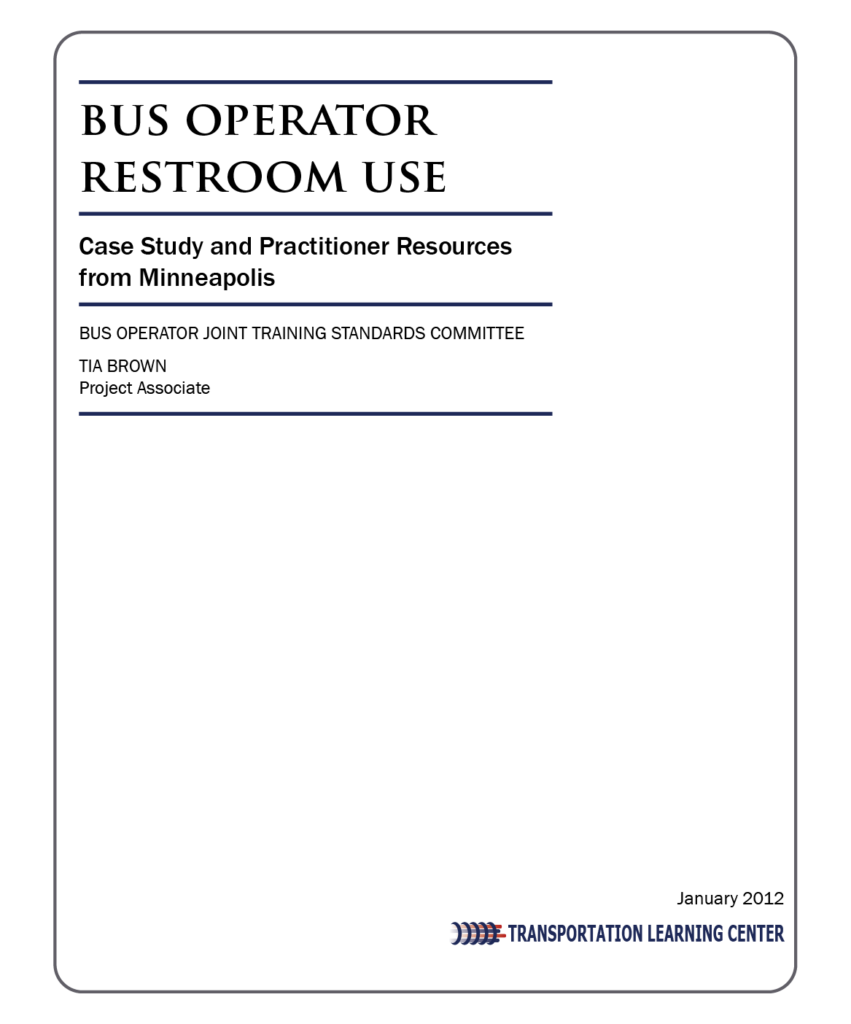
Bus Operator Restroom Use Case Study
In collaboration with the Bus Operator National Joint Training Standards Committee, the International Transportation Learning Center developed this Bus Operator Restroom Use report, a case study and compendium of practitioner resources on restroom use, including a history of restroom use policy at Minneapolis Metro Transit. The resources in this report also include a model community restroom licensing agreement, route-specific restroom locations chart, and example collective bargaining language.
International Transportation Learning Center
January 2012
TOPICS: Retention , Safety and Health , Training
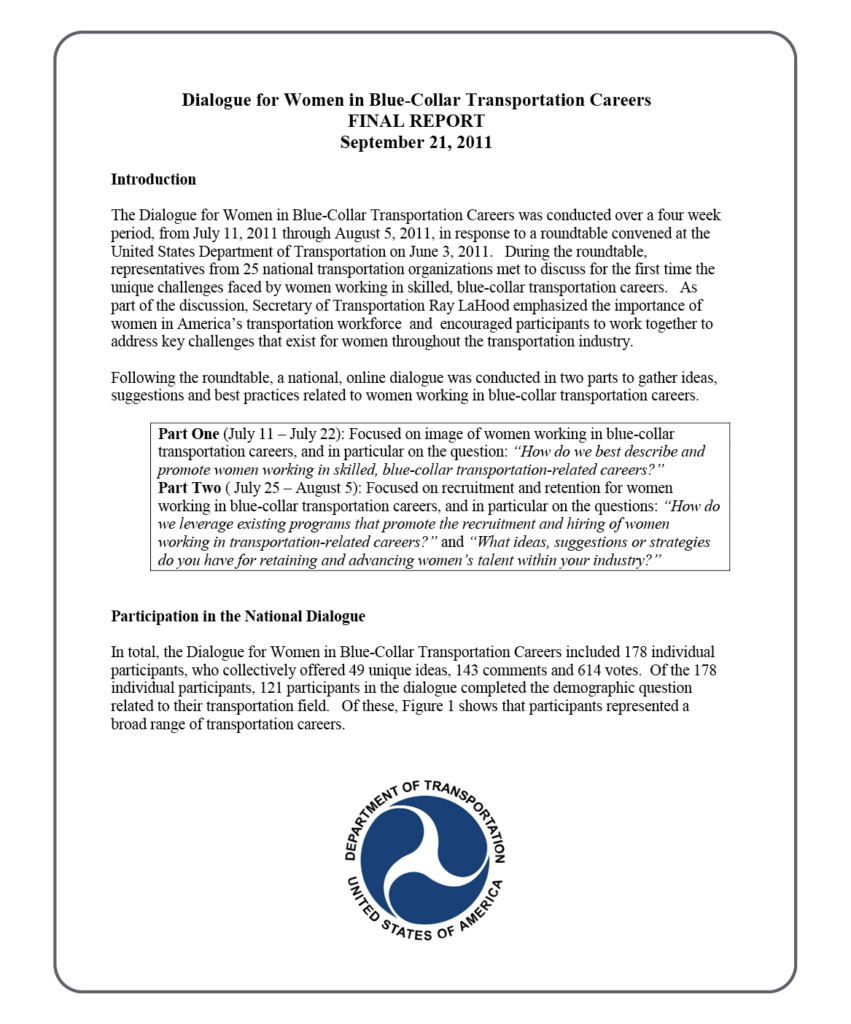
Dialogue for Women in Blue-Collar Transportation Careers
This short summary report describes unique challenges and recommendations regarding women in blue-collar positions in transportation.
US Department of Transportation
September 2011
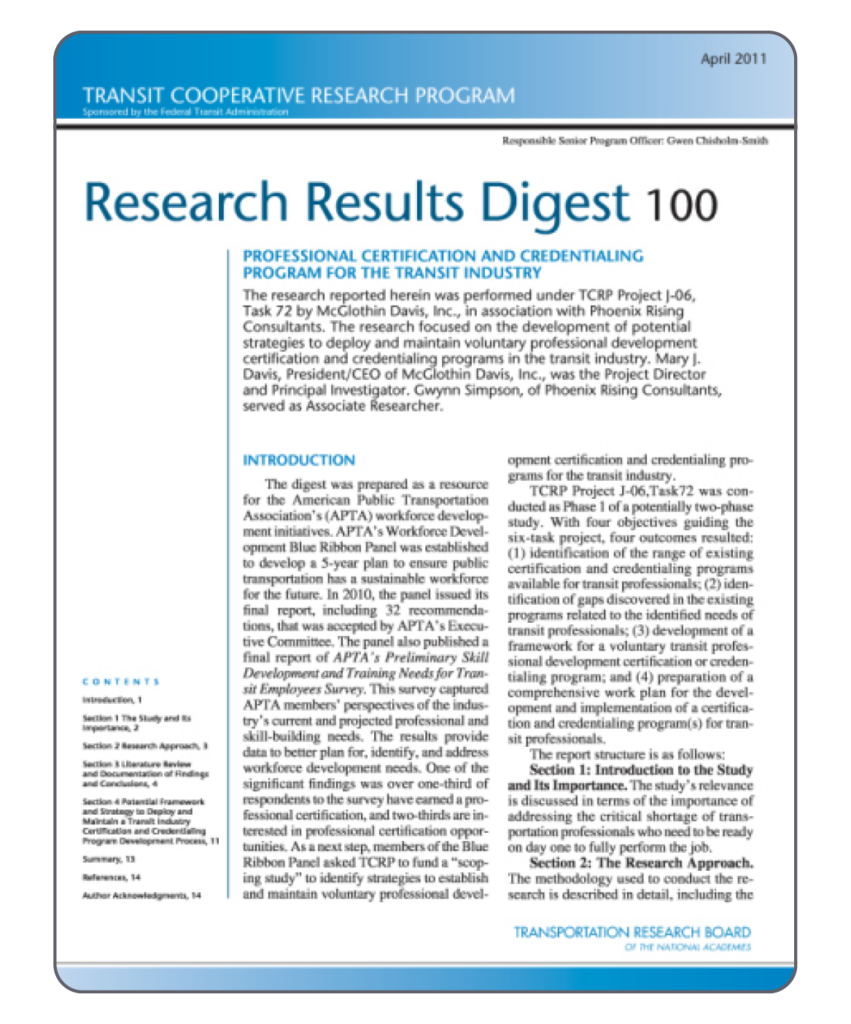
Professional Certification and Credentialing Program for the Transit Industry
TRB’s Transit Cooperative Research Program (TCRP) Research Results Digest 100: Professional Certification and Credentialing Program for the Transit Industry explores the findings of a literature review and a gap analysis of the efficacy of four transit-specific professional development programs. The report also examines potential strategies that might be used to deploy and maintain a transit industry certification and credentialing program.
Transit Cooperative Research Program (TCRP)
April 2011
TOPICS: Career Pathways , Policy and Planning , Retention , Training
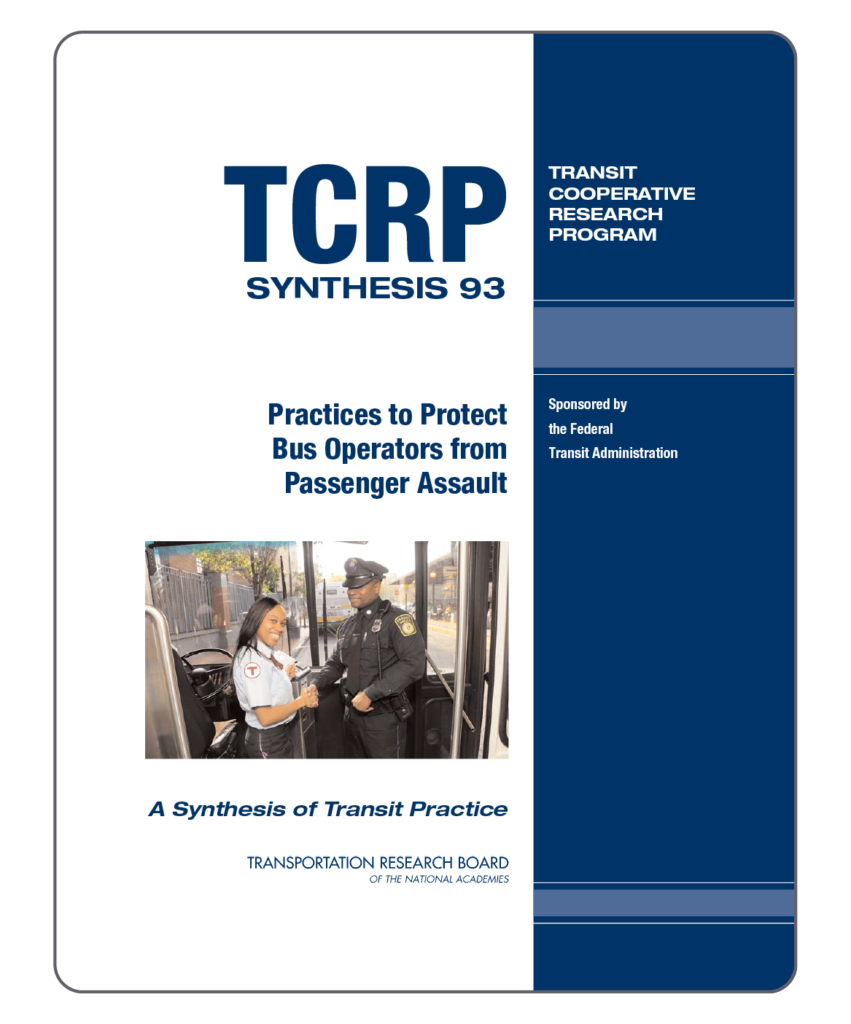
Practices to Protect Bus Operators from Passenger Assault: A Synthesis of Transit Practice
The TCRP Synthesis 93 highlights practices and policies implemented by transit agencies to deter and mitigate assaults on bus operators.
Transit Cooperative Research Program
January 2011
TOPICS: Retention , Safety and Health
Contributor(s): National Academies of Sciences, Engineering, and Medicine; Transportation Research Board; Transit Cooperative Research Program Synthesis Program; Transit Cooperative Research Program
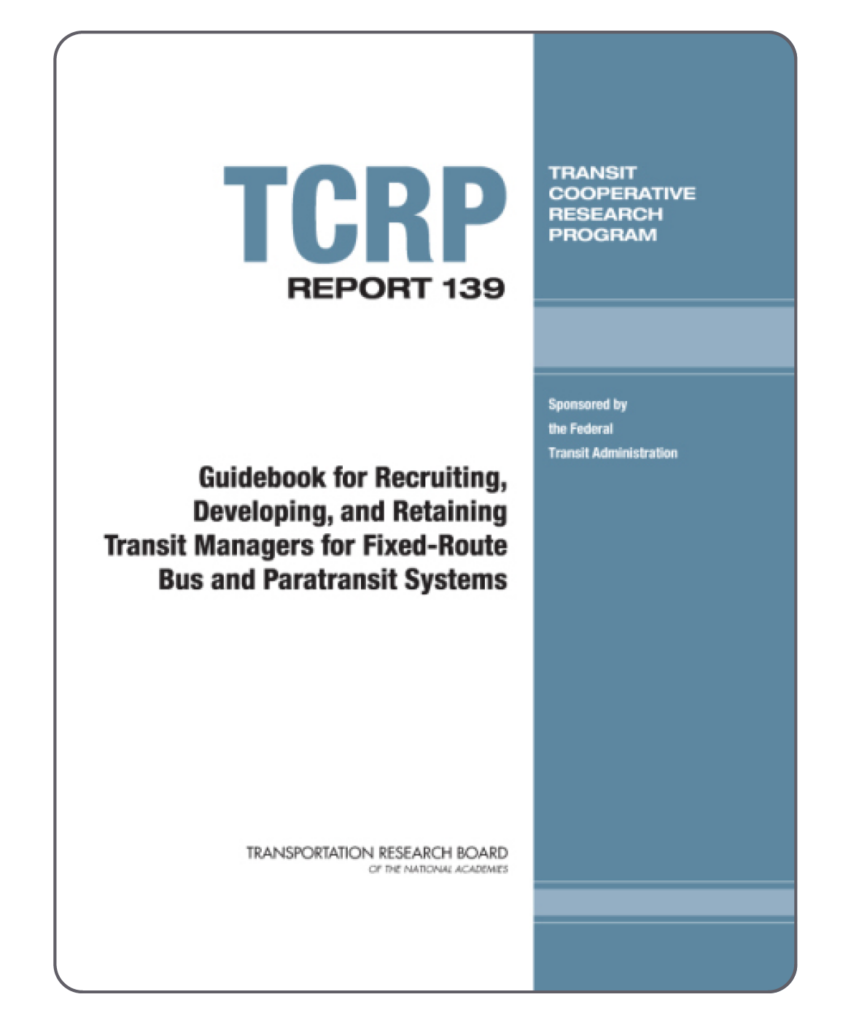
Guidebook for Recruiting, Developing, and Retaining Transit Managers for Fixed-Route Bus and Paratransit Systems
TRB’s Transit Cooperative Research Program (TCRP) Report 139: Guidebook for Recruiting, Developing, and Retaining Transit Managers for Fixed-Route Bus and Paratransit Systems explores resources for fixed-route bus, general public demand response, and Americans with Disabilities Act (ADA) paratransit systems resources to assist in the recruitment, development, and retention of managers.
Transit Cooperative Research Program
March 2010
TOPICS: Hiring and Recruitment , Policy and Planning , Retention , Workforce Shortage
Contributor(s): National Academies of Sciences, Engineering, and Medicine; Transportation Research Board; Transit Cooperative Research Program
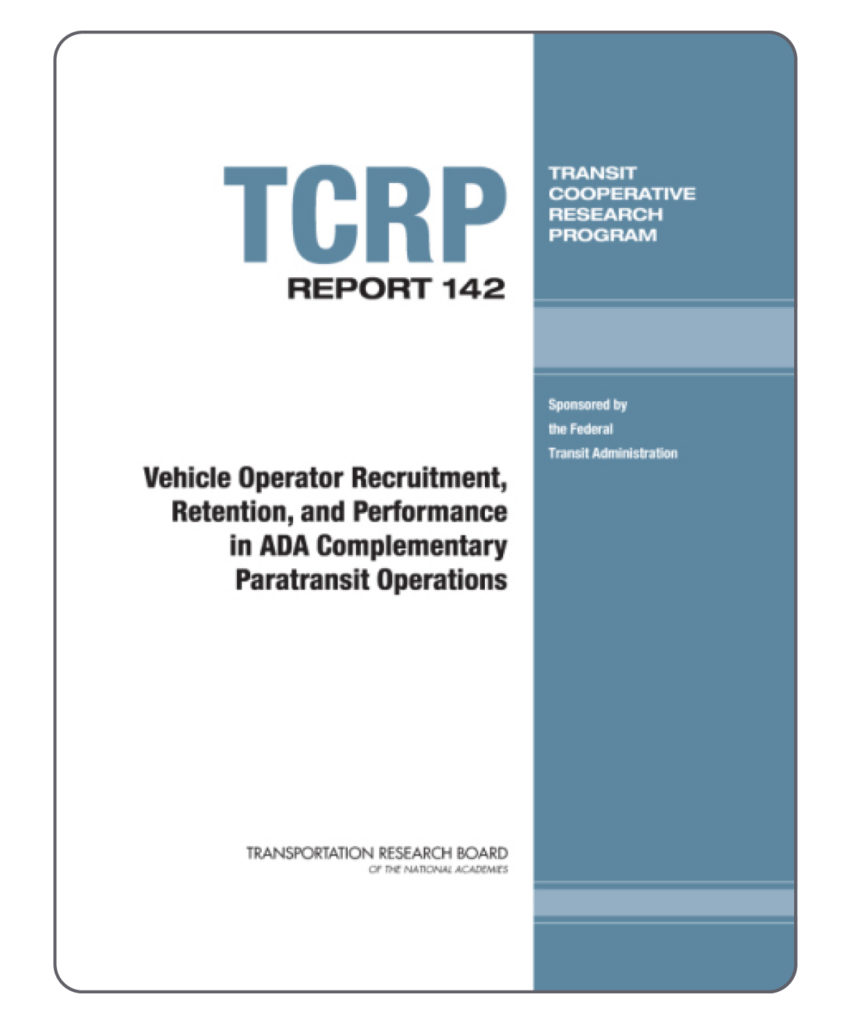
Vehicle Operator Recruitment, Retention, and Performance in ADA Complementary Paratransit Operations
TRB’s Transit Cooperative Research Program (TCRP) Report 142: Vehicle Operator Recruitment, Retention, and Performance in ADA Complementary Paratransit Operations provides guidance for understanding the relationships that influence and enhance operator recruitment, retention, and performance in Americans with Disabilities Act (ADA) complementary paratransit services.
Transit Cooperative Research Program (TCRP)
TOPICS: Hiring and Recruitment , Retention , Training
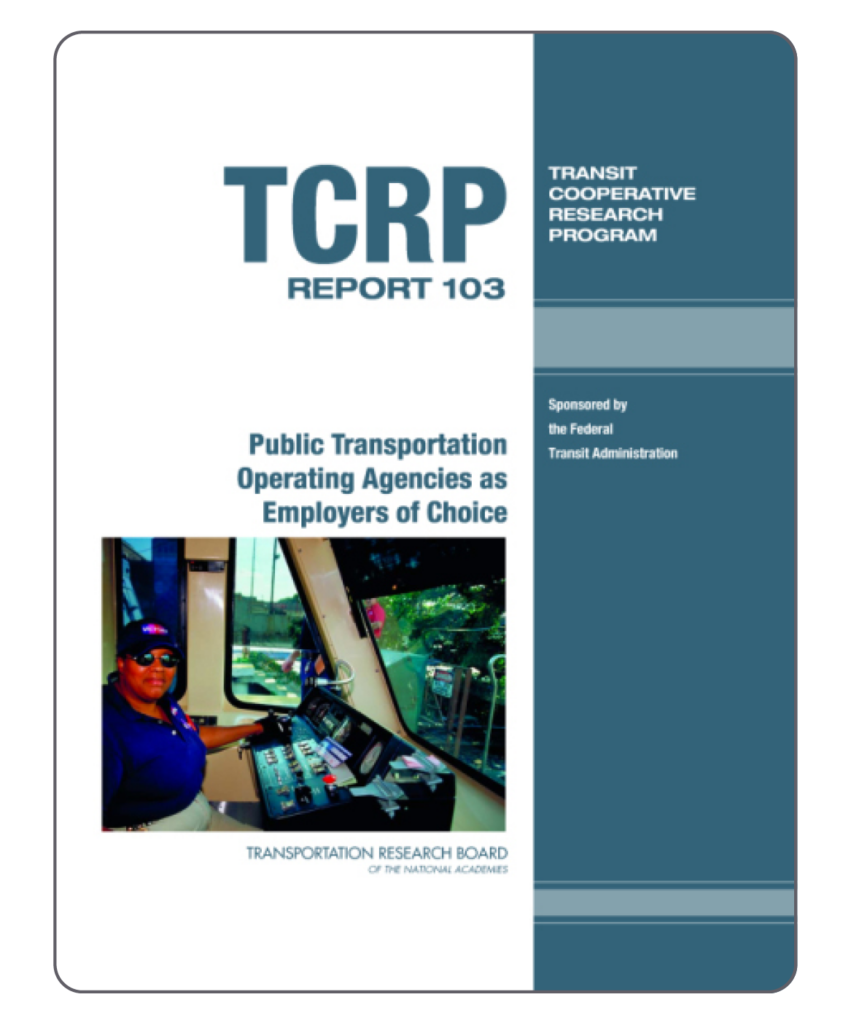
Public Transportation Operating Agencies as Employers of Choice
TRB’s Transit Cooperative Research Program (TCRP) Report 103 documents principles, techniques, and strategies that are used in workforce recruitment, development, and retention. The report includes a companion document, “Communications Strategy and Implementation Plan, Positioning the Public Transportation Operating Agency as an Employer of Choice” that describes strategies and solutions that offer the greatest potential for positioning public transportation operating agencies as an employer of choice.
Contributors: Watson Wyatt Worldwide and Focus Group Corporation
Transit Cooperative Research Program
January 2004
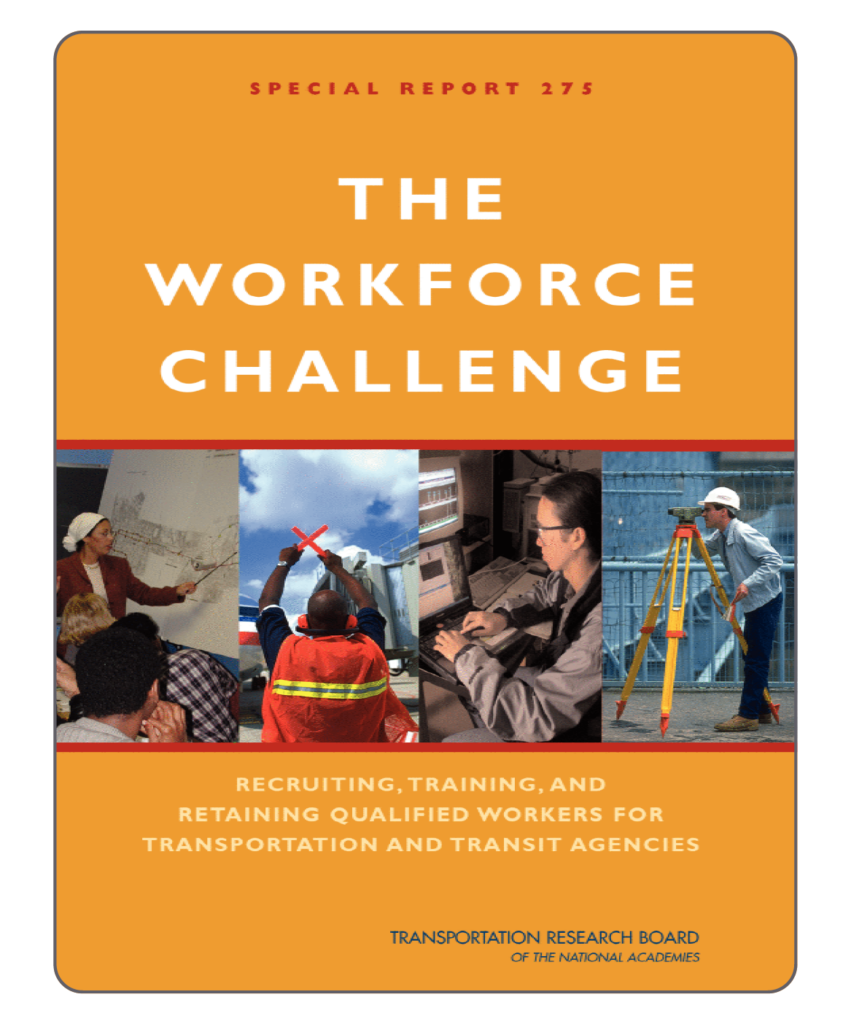
The Workforce Challenge
This report compiles research about the issues facing the transportation workforce, including changing skills, an aging workforce, and low prioritization of training. The report recommends working to expand existing federal and academic resources, create an institutional focus for the issue, and establish human resources management as a strategic function within the transportation community.
Transportation Research Board
January 2003
TOPICS: Hiring and Recruitment , Policy and Planning , Procurement , Retention , Training
Contributor(s): National Academies of Sciences, Engineering, and Medicine; Transportation Research Board; Committee on Future Surface Transportation Agency Human Resource Needs: Strategies for Recruiting, Training, and Retaining Personnel







